#cailume
Text
Gundam Unicorn OVA 5: The Black Unicorn
This is the first time watching one of these where I came out of it unambiguously preferring the novel. I guess it's only fair, after OVA 4 was such an improvement on the source material.

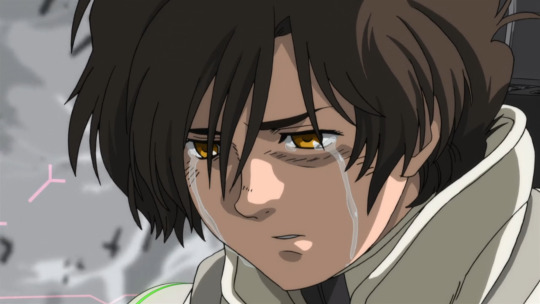
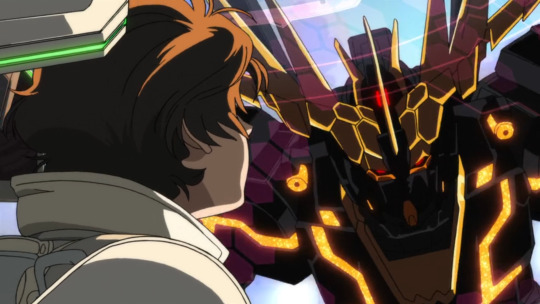
There's nothing particularly objectionable about it, to be clear. It just didn't meet the high expectations the previous episodes had given me. I'd been very impressed by how they never left me disappointed when the credits rolled, and it's a shame to lose that streak.
This was probably inevitable. Unless the narrative is deliberately on a small scale— think War in the Pocket— I tend to prefer my Gundam in a longer format. Seven film-length OVAs were never going to be able to cover everything I would want.
It's hard holding off on researching the production until I finish all the episodes. I'm so curious about what limitations they were working under and the motivations behind various choices.
As always, novel excerpts in this post have been sourced from the English fan translation hosted on Baka-Tsuki, with my own (clearly marked) edits to smooth out grammar or correct any particularly obvious deviations from the Japanese text.
The fan translation is very rough, and I'm not any kind of expert. If you're interested in any of the quotes, I encourage you to do your own research and look at the original text!
(Previous posts: Day of the Unicorn, The Second Coming of Char, The Ghost of Laplace, At the Bottom of the Gravity Well)
Surprisingly, a significant part of what I found disappointing was the visuals. The production values up to this point have been incredibly high, so it just feels wrong for such an intense battle from the book to get scaled back.
Some of this is just a consequence of moving the attack on Torrington to Loni's episode, but not all of it. The fights on the Garuda could easily have played out more like they did in the novel, and it would have helped a lot.
Cool stuff still happens on screen— mobile suits are jumping around in the sky! The Banshee has big crazy claws!— but it's all very sterile in comparison to the original text, which is relentless and chaotic in its violence.
I'm not just complaining about missing out on eye candy; I genuinely think this stuff is important for the themes. The destruction reflects the emotional stakes of what's happening for the characters.
I wish brainwashed Marida had actually killed some people during her big dramatic episode.
A Change in Premise: Who Planned What?
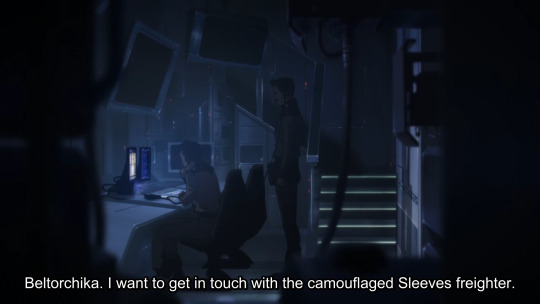
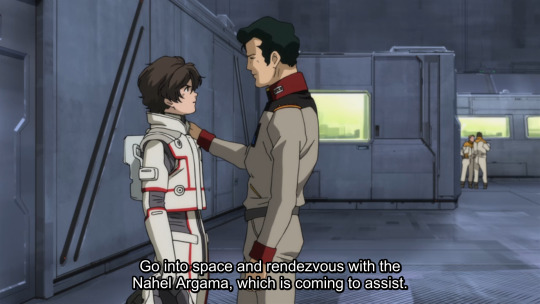
Here's how the OVA plays out: Bright sets up everything beforehand. He makes sure both the Nahel Argama and the Garancieres know the plan and agree to it, and he gives Banagher direct instructions. While there are some unexpected complications, everything ultimately goes according to plan.
The situation in the novel is very different, in that it's a clusterfuck of many people making decisions on the fly as they learn new information. The different groups who ultimately end up working together have very little contact with each other before the attack begins.
This is the setup:
Zinnerman plans the attack on the Ra Cailum at Torrington, with the goal of rescuing Banagher and retrieving the Unicorn. He does not know Mineva is there.
Banagher knows that Mineva is on the Garuda and that Marida is piloting the Banshee. He does not know Zinnerman's team is coming to rescue him. He has a positive opinion of Captain Bright after their conversation in his cell, but does not speak to him after that. He refuses to get in the Unicorn to help the Vist Foundation people move it.
Bright is suspicious of the Vist Foundation and unhappy with their behaviour on his ship. Beltorchika gives him some intel on the Box and the conflict surrounding it, to get him caught up to speed with the audience. She also warns him that the Zeon remnants seem to be mobilizing in the area, so he has some advance warning of the attack. He is aware of the Nahel Argama's location.
The Argama is sitting in orbit, doing nothing. The entire crew is bored and anxious.
Zinnerman only learns where Mineva is after meeting up with Banagher, at which point he has to change the plan on the fly to include rescuing her and Marida.
Bright only decides to contact the Argama and tell them to rendezvous with the Garancieres after the fight has already begun. He is not able to tell Banagher or Zinnerman. They learn about Bright's plan for the first time at the literal last minute, when the Argama appears to pick them up.
Zinnerman and his crew see a Federation ship approaching and assume they're being captured, even after being hailed and told otherwise. Ultimately, Banagher and Mineva convince them to stop fleeing and go along with the plan.
The new conceit for the anime is fine. I think the changes they made are clever as a way to streamline events, and I can appreciate that. They clearly put a lot of thought into how the original narrative is structured, and how some plot elements need to move to compensate for the removal of others.
It was probably necessary to fit with the time they were given. I just don't like it as much as the original, unfortunately.
I thought everyone coming together in an environment of total chaos was more interesting than a flawlessly executed plan. Characters had to choose whether or not to trust each other in the heat of the moment, with limited information. In comparison, this new version feels artificially clean.
I also just liked that Zinnerman cared enough about Banagher to rally these scattered Zeon remnant forces for a big battle, with no instruction of any kind from Frontal. He's part of the crew now. 🥺
We lose some specific action moments during the battle— not even counting any of the Torrington stuff that was in the last one instead:
Novel Banagher lays down in front of a truck and lets it drive over him during his escape attempt, before he even knows Zinnerman is coming to get him. Alberto tells his guards they're allowed to shoot Banagher when he's running away so long as he survives, yeesh— the book definitely has more human-scale gunfighting generally. Riddhe actually attacks Banagher, giving us a Delta Plus vs. Unicorn fight.
The consequence of moving Torrington that I care about most is that it means Marida didn't get to participate, so she only really gets to fight Banagher. Seeing her actually killing Zeon soldiers who should have been her comrades did a lot to emphasize both the threat she poses and the effectiveness of her reconditioning.
Reunited, Apart
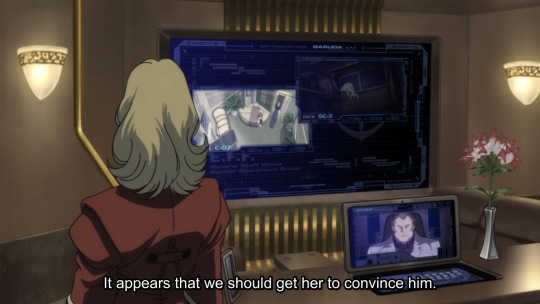
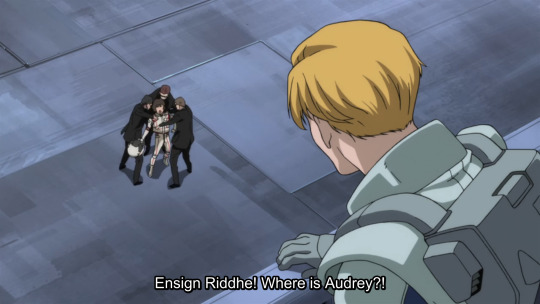
The OVA opens with the Banshee getting the drop on Riddhe and Banagher. It plays out pretty much like the end of novel 6, barring accommodations for the change in setting.
It may be short, but I really like the visuals of this fight. It's fun watching the Delta Plus schmoove about, and I love the lighting at the end.
They kept Riddhe telling Banagher to run here, which was a pleasant surprise. His characterization in the first half of this episode feels significantly more recognizable than like... literally anything else we've seen from him up to this point.
After the fight, we're treated to a sequence of Banagher waking up in the cockpit of the Unicorn and gradually trying to get his bearings. I think it's a really cool framing, and it's another one that's wholly unique to the anime.
A lot of minor dialogue we hear directly in the book is instead silent and left to implication through body language. The meaning is still conveyed very clearly. I thought it was neat.
One example: we get to hear some of what's said to Banagher during the interrogation in the novel. The interrogator is clearly trying to scare him. He claims to be an ex-Titan who got kicked out for torturing too many suspects to death. It's not necessarily notable, just 'flavour'. The silent video feed we see in the OVA gives us the same general information.
The more important part of this scene, which we actually lose, is that Alberto sends the interrogator away so that he can speak with Banagher personally.
Most of the conversation is about their father. Alberto tells Banagher that Cardeas must have enhanced him as a child, making Banagher a Cyber-Newtype. Banagher strongly denies this, but hearing it does plant a seed of anxiety in him going forward:
“You’re really amazing. You have a strong will, [guts], and even the sense [to pilot] the “Unicorn” ... It seems that the Laplace Program’s data can’t be extracted without your neurowaves. Even if we tie you down to the cockpit, nobody else can read the data as long as you don’t agree. When did you learn how to operate it like that?”
Banagher [wasn't sure himself]. When Alberto barged into the cockpit, his [immediate] thought was to [make it disappear], [it wasn't something he did by understanding the system]. “Seriously, you’re made too perfectly.” Alberto sighed as he put his elbows on the table.
“You [look] like you don’t understand anything, but you’re always in the center of everything. The [situation changes] according to your will; you’re [like] a natural king ... so perfect [it's almost disgusting]. What was unsealed might not be the Laplace Program, but you.”
[...]
“Don’t you find it weird? You’re too perfect already. As expected of an enhanced human [created by Cardeas.]”
“Enhanced…human?”
Perhaps you’re the same kind as me.—Marida’s voice, which he heard some time before, suddenly awoke deep within his ears, and he felt goosebumps all over him. “Am I wrong?” Alberto said as his sneer intensified.
“When you were in the Vist family, I was in a boarding school, so I don’t know how Cardeas raised you, but…you said before that you don’t have any memories of that time, right?”
Alberto's resentments are obvious. His feelings of inferiority to both Cardeas and Banagher are a major part of his character. The OVA hasn't really shown that side of him at all so far, instead presenting him more straightforwardly as bumbling comic relief.
(Remember, the last time these two spoke Alberto told Banagher that his entire existence is a curse and then tried to kill him. Really, they're both being remarkably civil.)
The family relationships in the OVA are generally less developed than they were in the novels, and I really wish that wasn't the case. The anime cares about family ties, unquestionably— we just had Loni's entire arc about that— but the actual intra-family dynamics between characters are less complicated and less interesting. I think that's a huge loss.
Unicorn is very much about family. The entire conceit hinges on it. The Vist Foundation and Laplace's Box are a pretty substantial bit of retroactive lore to add to the UC timeline, and the reason I'm content to buy into it is that the story does stuff with it, and clearly has things it wants to say. Again, the anime still explores those same themes, but the loss of detail and specificity makes the Vist and the Marcenas families feel more like nebulous plot devices than real groups of people, and I dislike that.
This conversation with Alberto also tells us more about the ideology behind the Box:
“What’s the so called “Laplace Box”? It’s an order. The world’s rules can [be maintained by belief] in this [hidden] “Box”. It’s like a common delusion, an existence that guards people from their selfishness. Once we lose it, the Vist Foundation will not be the only thing that can’t continue. The gears running the world up till now will lose control [as well]. The Dakar incident was [proof] of [that]. If Cardeas never [tried to open] the “Box”, that incident would never have happened. After the chaos of the One Year War, we [have learned] how to control war.”
The shadow formed by the lamp caused the slightly arched back to look heinous. That’s the back of someone scared of something. [...]
“[...] There is an instinct to fight within humans; as long as society continues to rely on the differences in hierarchy, wars will never disappear from the world. ... Gears to drive the economy, a catharsis that can purge the instinct to fight; without these two factors, humans will continue to start full-scale [wars]. This is a symptom of ill-management of humanity, and it’s impossible to cure [the disease]. We can only think of ways to live with our bad habits.”
The translation combines some sentences in that last paragraph in a way I'm almost certain is incorrect, but I'm not confident in my ability to render it more accurately. Sorry.
The gist is that by carefully managing tensions and allowing occasional smaller-scale conflicts, total annihilation can be avoided. The Box is a tool for this purpose.
Alberto is arguing that the Vist Foundation's goals are a moral imperative, not merely motivated by greed. I cut the paragraph where it comes up, but Banagher gets the impression that he's also trying to convince himself.
Banagher changes the subject to ask about Marida, which catches Alberto off guard. He dodges the question, telling Banagher he should be worrying about himself.
Banagher verbally reiterates his ideals, making it clear that abandoning them is not an option. He names all the people who're counting on him. There's a precursor to his conversation with Bright, where he thinks about the helplessness of the individual and the strength that comes from relationships and connection.
Alberto dismisses Banagher's conviction as Cyber-Newtype brainwashing— and it's clear that the idea had also occurred to Banagher. There's a discomfort taking root about the nature of identity, the self, and the way human beings are inherently shaped (and sometimes deliberately manipulated) by others. Connection with other people is vital, but also frightening.
My final note on this conversation: Banagher and Alberto both frequently describe each other as looking or acting like their father. They usually only compare themselves to him in the context of difference, generally with the subtext that these differences are something that makes them insufficient. Ouch.
There are more differences during this period of captivity. For one thing, Mineva is held on the Ra Cailum before they move her to the Garuda. There's a 'so close yet so far' dynamic where our three protagonists are finally all in the same location again, and they all know it, yet they are totally isolated from one another.
Banagher and Riddhe both get scenes where they chase after Mineva, and in both cases Marida intervenes and prevents their meeting. She almost chokes Banagher out, it's very dramatic.
Banagher and Riddhe manage to meet very briefly. They don't get the opportunity to talk for long; the scene takes place when Banagher has just escaped his room and is being chased by Vist Foundation goons. Riddhe deliberately creates a distraction to allow Banagher to pursue Mineva.
Compare this passage to the closest anime equivalent, where Banagher calls out to Riddhe and Riddhe just turns and walks away:
He ... turned right, and nearly knocked into someone else running [toward him].
“You’re…!”
The young man dodged behind to avoid a head-on collision, and widened his eyes. “Mr Riddhe…” Banagher muttered, but the pursuers’ footsteps caused him to look back again. He immediately grabbed Riddhe’s uniform and pulled him over,
“Ensign Riddhe. Audrey’s on this ship now. The Vist Foundation wants to use her as a hostage.”
“Hostage…!?” Riddhe gasped, and lifted his [chin]. “Wait!” “Oi, get that guy!” the yells came from the corridor behind Banagher, and he gave a pleading stare at Riddhe. It’s all on you. If it’s you, you’ll definitely be able to understand. Banagher had relied on Riddhe when their mobile suits interacted with each [other. He] looked at [Riddhe's face and saw him gritting] his teeth. Riddhe lowered his brown eyes, and [turned away with] a bitter expression.
“…Go,” he muttered with a barely audible voice, and took the fire extinguisher installed on the wall.
“The mobile suit deck’s straight ahead. Hurry.” Riddhe informed Banagher, who did not have the time to thank [him] as he darted forward. The sound of the fire extinguisher being sprayed [overlapped with] the pursuers’ [approaching] footsteps. "Hurry up!" echoed down the hallway, breaking through the agitated voices of the guards. ...
I don't mind the anime scene, and I actually think it's still well within the bounds of things the original Riddhe could plausibly do. It's just another example of him clearly playing a different role in the adaptation than the original text.
Returning Characters and Cameos

The Bright-centric scene that I consider most thematically important is his talk with Banagher, which is essentially the same in both versions. The only real difference is that the novel shows the audience Banagher's internal thoughts, many of which are about things that aren't in the anime anyway (such as his conversation with Alberto, and specifically Alberto's claim that Banagher must be a Cyber Newtype).
I like this scene, and being unchanged means I don't have much to say about it. It was nice.
I'll be honest: I wish Bright was in this episode less. Making him the mastermind behind everything that goes down inflates his individual importance— and screentime— relative to other characters.
The bit where he came back and talked to Banagher a second time to tell him the plan was the tipping point for me, I think. I was sitting there thinking 'Again? Fucking again?'
I just don't think it's a good use of time, and it rubbed me the wrong way in the context of how much other stuff I thought was important didn't make the cut.
I love Bright— and when I want to see him, there are three other tv shows and a movie I can go rewatch to do just that. When time is clearly extremely limited, I think the priority should be developing the characters that originated in Unicorn.
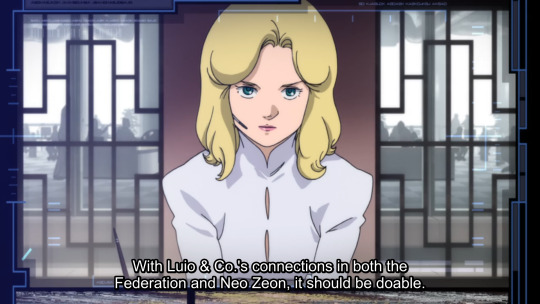
Bright's scene with Beltorchika is quite different. Aside from her giving different information due to changes in premise, the conversation is very streamlined. I'm fine with it, but it does make her presence kind of... perfunctory?
The information Beltorchika provides is necessary for plot progression in both versions, but the actual character interactions that made it matter that she's the one delivering it have been removed in the anime.
Bright contacts Luio & Co. by private mail with the recipient listed as Hayato Kobayashi, seeking more information about the Box. Later, Beltorchika is the one who responds to deliver the results of the investigation, stating that she is acting in lieu of Stephanie.
Bright was not expecting her. While he obviously knows who she is, this is the first time they've actually met.
Instead of telling him about the General Revil, she warns him about the movements of the Zeon remnants and the possibility of an attack on Torrington base and the Ra Cailum. She makes it clear that she's telling him this unofficially, and not on behalf of Luio & Co.
The novel version of this scene is very much about the Amuro-shaped void in the room.
Beltorchika used her hand to tidy her blond hair that was cut short and gave a somewhat stiff smile. (Because of my relations with [Karaba], senior manager Stephanie has been taking care of me, and Mr Kai Shiden would often come by too.)
“Oh…it sounds like there’s quite a few people both you and I [know]."
[...]
The reason why both sides could not show their honest smiles was probably because of the huge hollow they saw in each other, the man called Amuro Ray.
[...]
“What happened to Lieutenant Amuro was a pity.” ...
This insensitive line would touch upon a person’s old wounds, but Bright believed if [it caused] Beltorchika to waver, he could be certain that it was best not to trust in her abilities. He realized that he was doing something cruel as he hid his sense of guilt ... with a nonchalant look. Beltorchika herself merely [looked him over carefully], then chuckled. (It’s Commander Amuro, right?) [...]
“Ah, you’re right. Sorry.”
(You don’t have to think for my sake. We used to be deeply in love with each other, and then we broke up. I heard he died in battle during “Char’s Counterattack”, and I was depressed for a while…but his body wasn’t discovered, right?)
“Yes…”
(Isn’t him being MIA after the battle against his arch-nemesis Char a suitable ending for a romantic like him? Up till now, I sometimes feel that he should be alive, somewhere. Even if we lose the shell of the human called Amuro, I do feel that his heart has merged with space…)
Beltorchika looked like she was staring in the distance as she narrowed her eyes, and Bright felt that these words of her were not forced. The brat who’s always crying about on “White Base” had become a man who made a woman show this expression? Bright was suddenly overcome by grief as he too looked afar, and Beltorchika chuckled, saying, (You’re just like what Amuro said, always worrying.) ...
She also makes him feel old after he starts lamenting about how he thinks the world is getting worse because nobody believes in anything anymore.
(I do understand what you mean, but I can’t accept this way of thinking. Your words seem to imply that it’s alright to start wars as long as we have our own ideals.)
On hearing this direct refute, he felt that someone just poked him in the head. (I’m sorry. I’m someone who speaks too much. Amuro used to remind me of this habit I have.) Beltorchika said, but the glance she shot through the monitor showed that she had no intent of retracting her words. Bright was shocked that he was unabashed in beautifying the past and criticizing the present, and that perhaps was the proof that he was advanced in age. “No, I was insensitive in my choice of words. My wife often reproves me regarding this too.”
lol

While he is briefly name-dropped by Beltorchika, Kai does not appear in the seventh novel, and he has no contact with the Garancieres. His big scene is in Volume 8, where he speaks to Ronan Marcenas. It's fairly substantial.
It begins with Kai arriving in Dakar, giving us a look at how things are on the ground in the aftermath of the attack. It's a nice, evocative bit of scene-setting. He sees the remains of the Shamblo being disassembled, still lying in the street. The destruction is so severe that it looks like areas the Shamblo passed through have been carpet bombed. Emergency rescue and clean-up teams are still searching for survivors buried under the rubble. Armed soldiers and mobile suits have a strong presence.
The Shamblo never made it to Parliament, but the building still sustained some indirect damage from tremors during the attack. Repair crews are present, coming and going while everyone else still works in the slightly fucked up building as usual. The phones are ringing off the hooks.
When Kai arrives, he is greeted by Patrick Marcenas (Cynthia's husband / Riddhe's brother-in-law).
Patrick is a fan of Kai as a member of the White Base and seems a little star-struck. He gets embarrassed when Kai wryly tells him not to believe everything he reads.
In his office, Ronan is watching a televised speech by Monaghan Bakharo, the Defense Minister of the Zeon Republic. Bakharo denounces the attack on Dakar and denies all involvement or association with Neo Zeon / Sleeves.
I'm not sure how the tone is meant to read in Japanese, but as rendered in English it comes off very insincere and backhanded. Like, he's denouncing Zeon's past misdeeds, but also simultaneously justifying them and complaining that it's unfair that everyone is still being mean about it.
Kai arrives during this. Ronan gives some political commentary, basically saying that Bakharo is full of shit, then turns off the tv so they can have their conversation. He makes it clear that he is offering information.
Kai acts politely disinterested until Ronan asks if he has heard of Laplace's Box, which manages to shake his composure. He doesn't know much, but he has heard rumours. One of his reporter acquaintances seemingly disappeared after attempting to publish a series of articles on the subject, and the magazine that published the first piece went out of business soon after.
Ronan says he has evidence that the Vist Foundation is interfering with the Senate Council. He explains their goal of preventing the release of the Box, and the connection between the Box and recent battles with Neo Zeon.
He offers to provide Kai with a list of Senate Council members involved with the Foundation. He assures Kai that he will do everything in his power to ensure Kai's personal safety.
Kai is keenly aware that Ronan isn't whistleblowing for principled reasons, but rather wants to use Kai's platform for his own benefit. Ronan tries to appeal to Kai's hatred of Zeon, and emphasizes the importance of ensuring stability and safety to prevent it rising again.
Ultimately, Kai is not interested in being used as a politician's propaganda tool, and he doesn't have much respect for Ronan. He tells Ronan that he researched his career beore he arrived, and proceeds to give him a scathing review— the gist being that Ronan was a left-liberal politician who flirted with big, radical ideas, then moved right over time after being elected.
When he goes to leave, Ronan namedrops Bright as a last-ditch effort, with an offer somewhere in the territory between a bribe and threat (basically, 'I can help him keep his position as Commander now that he's involved with the Box and causing trouble... but only if we root out the conspirators with the Foundation in the Senate.')
Kai is pissed. He tells Ronan that he's shameless and pathetic, and that this is probably why Riddhe ran away from home. Jesus, Kai, were you just keeping that one in your back pocket in case you needed to bully him?
Ronan is too stunned to respond, so Kai gets the last word. The scene ends with Ronan looking at a photo of Riddhe on the wall. It's not the one we see in the anime, but one that feels a little more sinister:
There was his wife, narrowing her eyes [as if to say] that the sunlight in Africa was too strong, Cynthia, who was in the vibrancy of her youth, and Riddhe, who was less than 10 years old. As Ronan stood there, unable to show a sincere smile once he started to understand the rule that this world could not change, Riddhe was showing a weird stiff smile beside him. At that time, he would mimic Ronan’s own actions which he somehow saw, and was often reprimanded by his mother. In fact, Riddhe, who seemed to be giving an adult-manufactured smile, looked just as pitiful as Ronan was.
Right, that child understood. Ronan looked at the door and imagined Kai’s back on it, telling himself the words he could not say out. That child understood everything and accepted the destiny of the Marcenas family. I let that child bear the burden of the “Box”. I wanted to change everything in this generation, but I couldn’t do anything, and added the burden of my father and grandfather upon him.
Ever since the battle of Torrington, there was no news of Riddhe. His “Delta Plus” was reclaimed safely, so he probably was not hurt. This news alone was enough for Ronan. No matter where Riddhe was, no matter what happened to him, he would not betray the Marcenas’ destiny. Even though others could not understand, he could firmly believe so.
Kai appears again very briefly in Novel 10, when he calls Bright and tells him about his conversation with Ronan.
Martha and Mineva: Negotiation
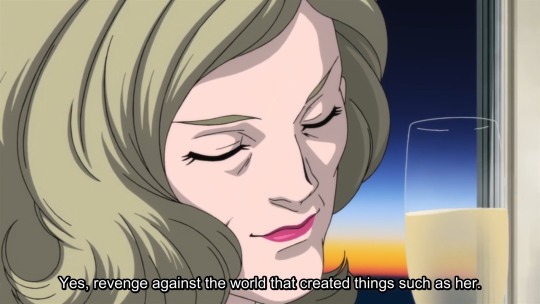
This line is important. Banagher thinks the same thing almost word for word about Frontal later.
People generally seem very aware of how referential Unicorn is to previous Gundam media, but sometimes I wonder if it's obvious to anime-only watchers just how referential it is within itself?
The whole narrative is a funhouse hall of mirrors. Everyone is always reflecting at least one other person, and usually more. Characters bleed into each other in other characters' perceptions, both implicitly and explicitly.
I say Frontal is my favourite, because he is— but when I think about Unicorn, I'm usually thinking about the ensemble cast as a unit. They're deeply enmeshed. I think this is why the mangling of Riddhe threw me so badly before I had even fully realized that I cared about him and why— if you move one of the mirrors without compensating for it elsewhere, the illusion breaks.
Martha and Mineva's negotiations happen in the novel before they move to the Garuda. The scene takes place on the Ra Cailum, in the unused Commander's room.
One irrelevant but extremely funny detail is that Martha started a feud with Bright over her accommodations, because she originally wanted to stay in that room specifically:
[The VIP room] was the last arrangement Captain Bright made when Martha demanded to have the commander room. As the commander and captain, Bright was staying inside the captain’s room, and the commander’s room that was often kept empty should be okay for anyone’s use, but this was a serious problem to the military. The disputes between Martha and Bright had been becoming a common scene to the crew, but it could be said that this room was the start of the dispute between the two.
I'm not sure if this was meant to be implied in the anime or not, but Mineva is on a hunger strike and refuses to eat or drink anything but water while being held captive, so she's quite physically weak during this scene.
Martha tries harder to be "friendly" in the novel. She's playing fake nice in the anime, obviously, but there's a professional distance there. Novel Martha gets up in Mineva's space— whispering in her ear, putting an arm around her shoulder, saying some truly bizarre shit about wombs... the vibes of this conversation are rancid either way, but the over-familiarity is a slightly different genre of red flag.
I think these are good changes, especially since they've already changed the tone of Martha's character by choosing to omit her sexual abuse of Alberto. The original characterization might feel incongruent with New Martha, leaving aside all question of whether or not the way she was originally written was "good".
God, I still really love reading most of Martha's novel scenes, so long as she isn't directly alone in the same room as Alberto. She has just the right mix of traits for a petty, 'shit-stirrer' antagonist that I love to watch bounce off other people: highly perceptive but still unable to truly understand other people; deeply angry about being wronged but perfectly happy to take advantage of others; carefully manicured and put together until suddenly she's not.
She's a creep. She's morally repulsive. She's mean, and she knows exactly how to pinpoint a person's vulnerabilities, but she's also constantly letting her own bizarre preoccupations bleed into the conversation.
The way she's written and described is, unfortunately, almost always some level of misogynist in its framing— and her bizarre preoccupations as a person are arguably also Fukui's bizarre preoccupations as an author.
And yet.
Later, after Martha leaves, the OVA shows us a flashback of a champagne glass breaking, and we hear Martha chastising Mineva for rejecting her proposal. The implication is that Martha's facade eventually shattered, and she threw the glass in a fit of rage. The novel shows us this directly.
This means we get to hear the specific thing Mineva said that got under Martha's skin, which is, uh... maybe it's easier to just show you.
Martha is doing her spiel about the innate biological superiority of women and the importance of The Womb, and then we get this exchange:
“Miss Martha, do you have children?”
The interrupting voice caused Martha’s fingers, resting on Mineva’s shoulder, to tremble. “Two of them. why?” Upon hearing the stiff tone, Mineva felt the reason by the chill in her heart, “Are they the children you bore?” she started to ask with a personal tone.
“…What do you mean?”
“I don’t understand what kind of person my mother is, and that’s because she [died] before I could remember. However, [I still remember the way she felt]. [A woman who has become a mother, or who has the qualities to become one,] will give off that sort of gentle presence. I can’t sense that maternal presence from you.”
Martha’s expression immediately changed as she stumbled backwards. Mineva saw the suit that showed the other woman’s bodyline, realized that she obviously put in her utmost effort to maintain her skin so as to prevent people from realizing her age, ...
[This woman played the role of] a clever tactician, [but there was something childish about her]. Her girlish ideals and grudges had [festered, rotting down to the root], and [she seemed to have] lost something as she [grew older]. She talked of her knowledge of humans, but she never understood people, and did not intend to understand them. Martha was a hypocrite of a reformer. Mineva stood up and looked in front, feeling that there was no need for her to be afraid. Martha wanted to maintain [her] footing, but could not do so, and stumbled backwards again as Mineva glared at her with her clearly hostile eyes.
“You denied the logic of men, and yet used that to conquer Marida. It’s possible if you explained that it was the ruthlessness of women at work, but you’re acting just like a man when you’re using that excuse to rationalize your knowledge. You’re not the kind of woman you say. Of course, you’re not a man. You’re just using the tone of a man to exercise the cruelty of a woman, a conman who uses whatever indecent weapons—”
Something grazed past Mineva’s face before she could finish, and a sharp sound glided past the sky as it entered her ears. The shrill sound of the glass breaking rang from behind, and the Foundation subordinates in black charged into the room, perhaps because they realized that there was something amiss in the situation. Mineva stared at Martha, not moving at all, ...
...There's a lot going on here.
I've gone back and forth on whether the implication is just that Martha is unwilling to actually go through the difficulties of pregnancy despite her posturing, or if we're supposed to assume her reaction implies some kind of complex about infertility.
I feel like the former makes more immediate sense and is the less weird option of the two, but the latter would have some interesting implications on a character level, in that it could be a reason for her to genuinely see herself in Marida.
Even if that were the case, it would be a false understanding. Martha considers the projection of her own desires onto Marida more important than Marida's actual personhood.
One last thing I want to mention is that the original version of Martha is extremely angry and resentful.
It was too cold to call them martyrs, the Zeon soldier that disappeared in the explosion, and Marida, who was mind-controlled to kill her comrade—
“How impressive.”
Martha, who unknowingly got behind her, had the color of fire reflected in her eyes [...]
“The self-satisfaction men have will all—be severed by her sword.”
Martha clenched her hand that was pressing against the window, seemingly wanting to [crush] something in her hand. At that moment, Mineva had a feeling that it was this vengeance that was driving Martha, and the rage within Marida’s heart was driven by this poison, ...
If anime Martha is meant to be bitter and vengeful like this, then she's much better at hiding it. Her greed and ambition are central, and whatever sincere emotion or vulnerability she might theoretically have is entirely concealed from us.
The Riddhe Section
As I've said previously: in the first half of this episode, Riddhe feels more like himself (and generally more interesting to me) than he did in the first four. Then, around the 30 minute mark, he has a single line of dialogue that implies a dramatically different ideological viewpoint and motivation. It's honestly kind of fascinating.
I'm not mad about it. At this point, I've resigned myself to the fact I'm dealing with a different character. I'm just surprised, and wondering about the reasoning behind the choice— they pretty much completely inverted the nature of Riddhe's hostility to Newtypes.
The breakdown Riddhe has after Mineva's jump from the Garuda is also different from its novel counterpart. I actually enjoyed it a lot, mostly because it's fucking silly. A character who is unhinged in a way that makes me laugh is an improvement over one who vacillates between being boring and making me angry.
Novel Riddhe doesn't necessarily have a clear over-the-top moment where he 'snaps' like this after Mineva's rejection. His instability becomes obvious long before this point, but he doesn't go violently out of control like this until the climax of his arc. It's a gradual but inescapable downward spiral, with fewer dramatic hard drops.
Riddhe, Alberto, and Marida
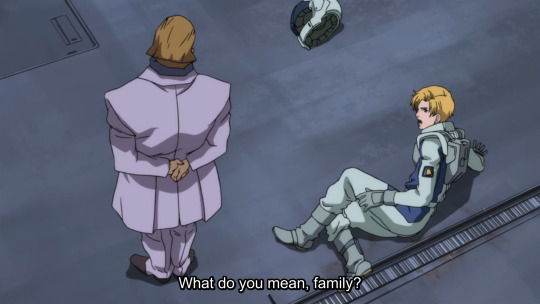
The Alberto-Marida-Riddhe dynamic is fascinating in the book, and there's much less of it in the anime. This scene here is still an important one for Riddhe, though.
The novel equivalent is told from Alberto's perspective, and it opens with him talking to Marida before Riddhe appears. It also happens a bit later than it does in the anime, after Banagher has already been interrogated and had his first escape attempt.
Since running into Banagher, Marida has been having a harder time connecting with the Banshee. Her physical symptoms have worsened, with more frequent headaches. Alberto is worried about her, and tries to tell her not to push herself too hard. The moment has a very different tone than the anime version, which mostly seemed to be played for laughs.
Novel Alberto is deeply disturbed and upset by Marida's blankness. There's a callback to an incredibly vile innuendo from Martha about "playing with dolls," and remembering it upsets him so much he yells at Marida, trying to make her understand the seriousness of what he's saying. She just responds with flat, uncomprehending obedience.
Riddhe enters, interrupting Alberto's one-sided argument. His reaction to Marida is interesting.
“It confounds me to think that this lady here is a Cyber-Newtype.” Riddhe said as he frowned and approached Alberto. Since when has that guy been standing there watching? Alberto resisted the urge to click his tongue and turned to face Riddhe, ostensibly trying to block Marida’s sights.
“She’s most likely a kidnapped orphan, am I right? Does the Vist Foundation deal with human trafficking too?”
Riddhe asks to see Mineva, then Banagher when this is denied. This is when Alberto tells Riddhe that Banagher is his half-brother. He's deliberately trying to break Riddhe and Banagher's friendship, because he knows Riddhe tried to help Banagher escape.
Riddhe's reaction is more outwardly dramatic than in the OVA. He crumples, bracing himself against the wall so he doesn't collapse— he wasn't thrown by Marida, so he's still standing— and then starts laughing bitterly and saying cryptic things about the history of the Vist Foundation.
I think this would feel very weird and out of place in the context of the anime, so it's good they cut it, but I did like it as a scene in the book. It makes for a nice little chapter cliffhanger, where Alberto realizes that Riddhe seems to know what's in the Box.

Later, Riddhe meets Marida and Alberto a second time.
The scene takes place in the hangar bay while the Unicorn is being moved. As he watches, Riddhe thinks about Banagher— until he catches sight of Mineva, who is also being transported. Riddhe calls out and attempts to go to her, but Alberto and Marida get in his way.
The white frame of the “Unicorn” was lifted by the two “Jestas” and laid down horizontally on the trailer, [...] Unlike the “Banshee” that was moving into the “Medea” on its own, the “Unicorn” was dragged over by the trailer, and the reason for this was due to the only pilot, Banagher, refusing to work with the Vist Foundation.
That’s his style alright… he thought, but [he] felt Alberto’s words appear in his mind again, and bit his lips [alone] in the [cockpit.] His rational side was telling himself that there was no reason for him to feel angry, but he could not [help but feel] cheated, and [an uncontrollable frustration] continued to swirl in his heart.
That guy [seemed like an ordinary person who] simply got involved in this [by chance]—no, there was already an [unsual feeling] about him right from the beginning. If he really has the Vist bloodline, I can only describe my two battles alongside him as ironic. He’s supposed to belong to the other side, but I got fooled by him saying ‘you’re a man of your word’, and ended up [learning the truth about] my cursed family. I’m like a clown performing ...
[...]
... just when he wanted to shake [this] thought from his mind and [refocus] on the inspection, a [flash of] familiar chestnut-colored hair appeared in the corner of his [vision,] and he felt his [heart that had been pounding suddenly go] silent.
[...]
... Riddhe got down to the deck and yelled, “IT’S ME, AUDREY!” as he leapt off the gondola.
Mineva’s eyes widened as she looked back, and she [tried] to break away from the ranks, [but she was] restrained by the subordinates in black suits. Riddhe [ignored] Martha’s piercing stare ... as he continued to dash down the mobile suit deck.
[...]
[Just] when Riddhe was about to see [Mineva's] face, [Alberto interrupted.] “How troublesome”, [he] said as he [stepped in front].
“I should have told you that you’re not to see her, Ensign Riddhe.”
I love this whole section, even through the garbled grammar. It hurt me to trim it down, but I can't justify all that text.
Alberto and Riddhe argue. Marida steps between them when Riddhe gets too close. He tries to push her out of his way, but she dodges and throws him to the ground. When he gets up and fights back, she starts trying to choke him like she did to Banagher earlier. However, the fight ends abruptly when something triggers one of Marida's headaches, and she collapses in pain.
Alberto rushes over to Marida's side and orders his subordinates to fetch Bentner, the Cyber-Newtype researcher who facilitated Marida's reconditioning. Alberto clearly wants to help her, but his only solution is asserting control and further reinforcing her brainwashing. He soothes Marida by walking her through her 'Gundam is the enemy' mantra. Riddhe is still there, watching this happen and getting increasingly creeped out.
It's heavily implied that what Marida is actually reacting to is Zinnerman's approach. The scene ends with an alarm going off, as the Neo Zeon attack finally begins.
Unlike the reader, Riddhe doesn't know what's happening yet— but he has a bad gut feeling. When the alarm rings, he books it straight for the Delta Plus, without even bothering to wait for Bright's announcement.
Newtypes, Cyber and Otherwise
Let's back up for a moment and get some more context on Riddhe and Marida, since what he thinks of her is relevant to his later interactions with both Banagher and Mineva.
What does Riddhe know about Cyber-Newtypes? Not necessarily a whole lot. He's heard what the crew of the Ra Cailum think, though, and their perception seems to be that getting enhanced may as well be a lobotomy.
“Cyber-Newtypes…” Daryl’s face suddenly turned pale as he muttered this. “With those guys from the Newtype research institute around, I guess you’re right.”
“You mean that if we end up becoming this thing’s pilot, we might end up being enhanced…?”
Watts whispered as he looked at the back of the pilot who disappeared behind the cockpit hatch. There was already a rumor amongst pilots that a Cyber-Newtype was a synonym of being a vegetable. Then what about Banagher? Riddhe pondered, and then shook off this question without an answer ...
This is Riddhe's starting point, before he ever interacts with Marida. It's a bad first impression, and it doesn't get better.
His narration compares her to a guard dog. He calls her a puppet. When he recognizes her as a person, it's generally in the context of a person who is being or has already been destroyed— a kidnapped orphan; a brief flash of emotion in the eyes that fades to nothing. Empathy is overridden by disgust for what was done to her.
Riddhe doesn't know much about Cyber-Newtypes, but he thinks the decision to make them was morally repulsive.
So, what about "natural" Newtypes?
Trick question.
Novel Riddhe doesn't think Newtypes are real.
He has an entire back and forth with Banagher about how fake they are. You can imagine my surprise when "the revelation that Newtypes really exist" came out of his mouth in the anime.
"Newtype" as a word has a lot of historical and political baggage in-universe. It refers to multiple different concepts that are loosely related but not identical, and they're often conflated.
Do you remember the first episode, when Banagher is in class? This is what we hear of the lecture:
They claim to desire autonomy for the Spacenoids, but at their heart you will still find the same ideas of the inherent superiority of the chosen elite found in the philosophy of Gihren Zabi. The concept of Zeonism proposed by Zeon Deikun, the so-called 'Newtype' ideology, was a dangerous belief that ultimately produced rebellious elements such as these.
This is Riddhe's position— Newtypes are just Zeon's equivalent of the Nazi Übermensch. It's an ideological concept, and only real insofar as humans have made it so through enhancement.
He isn't disturbed by the Box because he considers it proof of Newtypes being real; he's disturbed by it as a propaganda tool for Neo Zeon that would strengthen belief in a harmful myth.
Riddhe is terrified of Zeon. It doesn't matter if he's sympathetic to spacenoid rights and disdainful of his father's politics; Zeon is still the greater evil. He's able to make an exception for Mineva because she's acting against her own government on moral grounds, and her words moved him.
That's how Riddhe felt at the start of the series, when he still had an optimistic outlook. He's been thoroughly disillusioned by this point, and just recently spent half a novel watching people die at ground zero of a terrorist attack carried out by Neo Zeon.
This is how Riddhe describes Newtypes during his confrontation with Banagher:
(Zeon is the tumor born from twisted idealism of the Space Migration Issues. This Newtype thinking is just a fantasy they have, and a virus that divided humanity into two after humanity nearly united. If we don’t eradicate them, there won’t be peace…!)
"A fantasy." Not a real phenomenon.
It makes sense that Riddhe would think it's bullshit. We can assume this was probably also true in the anime at first, even if his political beliefs are less developed— we've already established that Newtypes being fake is a mainstream position that gets taught in schools.
The point of divergence is that OVA Riddhe is apparently convinced that Newtypes are real when he learns the truth about the contents of Laplace's Box.
... Why, exactly? Did Ronan tell him that's what it means? Did he come to that conclusion on his own?
I know characters can be fallible and believe things that are wrong, but I literally already know what the Box is, and it doesn't prove anything about Newtypes. Riddhe already has vested emotional interest in them being a myth, so it seems strange to me that he would change his mind without undeniable evidence.
It could be they were trying to make his motivation simpler, so that he wouldn't have to spend time explaining it? The concept of Earth society and "Oldtypes" feeling threatened by the emergence of "Newtypes" has already been raised by other characters, so the writers might have felt it would be self-explanatory.
It strikes me as a dubious choice from a storytelling perspective, even if they don't care about making Riddhe look a bit dim. Sure, we've already seen other characters speculate about the Box, but Riddhe is the first character who we know is aware of the contents to make a specific claim about what's in there. The audience is reasonably going to assume what he's saying is accurate, and I think setting up that kind of false expectation is a mistake.
I've always assumed learning about the contents of the Box is intentionally meant to be a bit underwhelming for the audience, because the ossified political structures around it were more important and dangerous than the thing itself. I just think this particular implication feels more like a bait-and-switch that could lead to disappointment, rather than realization. I dunno.
Anyway: Riddhe hates Zeon. Riddhe is traumatized after Neo Zeon's attack on Dakar. Now Neo Zeon is attacking again— and Banagher is co-operating with them.
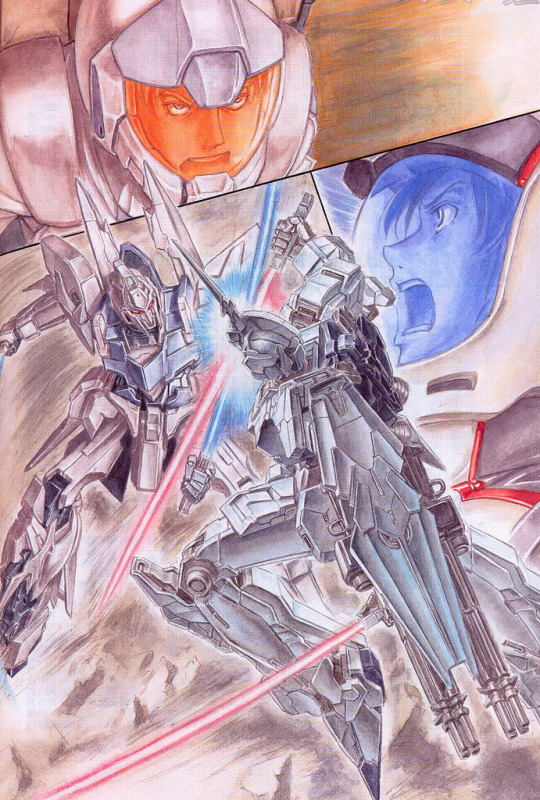
(Banagher! Have you really become a Neo Zeon member…!?)
The solid anger pierced through the armor of the machine and came right at Banagher. It was a stubborn will that was overly stiff, one that felt impossible to communicate it. ... [Banagher] could sense all warmth of the human called Riddhe disappear as he pulled the control stick in the moment of extreme stress.
...
Now’s not the time for this. Banagher felt that the distance between both of them was very far, and gritted his teeth anxiously.
[...]
“You’re saying the same things as the people of the Vist Foundation, Ensign Riddhe. You courageously brought Audrey back to Earth, so why…!”
(That Riddhe Marcenas is dead.)
...
(I don’t have the power to save the world. Even if order is incomplete here, I’ll protect it if there’s no way to [change] it. That way, I can protect Mineva too…!)
[...]
The humanoid that leapt from the barren land instantly transformed into a wave rider and entered the clouds. If I let him go like this, he’ll really become an enemy. Banagher was driven by the anxiety in him, “Mr Riddhe, wait…!” and called out. (Are you alright, Banagher?) however, upon hearing this call from Zinnerman, he looked back at the sky again, and spotted the homebase-shaped machine of the “DO-DAI Kai” approach him.
I cut a lot here, both action and dialogue. I skipped over the parts where he talks about Newtypes and Zeon, since I already quoted them previously.
These are the details I think are most relevant:
Riddhe's belief— and anger— that Banagher has joined Neo Zeon
His loss of faith that the system can meaningfully be changed
His description of his previous self as dead
The official severance of his relationship with Banagher.
I do think what the anime did, having him catch on to what's happening and conclude "they're all working together," was a smart way to spur him into action. It fosters a similar sense of frustration, betrayal, and paranoia.
God, though, he just feels so much less connected to Banagher in the anime. I thought this was one of the more interesting episodes for their relationship, and the most direct interaction they had was Riddhe ignoring Banagher calling out to him and walking away.
After the fight with Banagher, Riddhe immediately heads for the Garuda, where he confronts Martha and Alberto. This scene plays out fairly similarly at first, with a few tweaks.

First: Riddhe pulls a gun on them immediately.
Second: Martha is not at all worried about the idea of killing Ronan Marcenas' son. It would be an easy cover-up. Soldiers die all the time during battles like this, no matter how important their daddies are.
She backs down when Riddhe tells her that he's recording the conversation, and that the Delta Plus would automatically transmit the contents of its black box if it was destroyed.
Third: Riddhe's paranoia about Zeon now extends to Mineva, even if his entire reason for doing this at all is supposedly to keep her safe. He snaps at her about her loyalties when she presses him for information about the box. When she pleads with him further and reminds him why he brought her to Earth in the first place, he reiterates his previous proposal— Join our family. Renounce Zeon. Prove I can trust you. He doesn't seem to actually expect her to agree, and she obviously doesn't.
I'm so glad he didn't do this in the anime, holy shit. I was sure it was coming and dreading it. After how they changed the first proposal scene to be so much more weird and aggressive, it would have pissed me off to hear it again.
Everything else he says during this scene is roughly the same, up until "the revelation that Newtypes really exist." I've already explained that novel Riddhe doesn't believe in Newtypes, but he definitely wouldn't have told Mineva about it right now if he did.
This scene is told from Mineva's perspective, as with most of the scenes with her and Riddhe. We get more insight into how she's feeling. Her actions and dialogue differ from the anime in several ways.
Points of interest:
Mineva still feels the general "Newtype pull" from Riddhe. She has to actively resist just automatically doing what he tells her, even now that his behaviour has changed to become closed off and aggressive.
Mineva is feeling genuinely angry toward Riddhe, which has never been the case until this scene.
Mineva specifically confronts Riddhe about how his idea of protecting her is just keeping her locked away in his family's house while he handles everything himself. He doesn't seem to understand why she needs to talk about this before she's willing to follow him.
Mineva doesn't just slip away during the commotion of Neo Zeon boarding the Garuda— first, she refuses to leave with Riddhe. Then she elbows him in the gut when he isn't expecting it, steals his gun, and tries to use it to get away from Martha and her goons. lol
And the big one, that I really wish had made it into the anime:
Riddhe's lack of empathy for Marida is the reason she ultimately decides not to go with him.
“Let’s go.”
Mineva’s shoulder was grabbed unexpectedly, and Riddhe’s face appeared in the direction she was being pulled towards. He forgot to control his strength, and even if it may be caused by anxiety, this caused her to feel a little repulsed.
“There’s no reason for you to be here. Come with me.”
“But Banagher and Marida are still…”
“Marida? Are you referring to that puppet?” Riddhe [said simply.]
[Mineva’s body inadvertently tensed up, and at that moment there was] the sound of something breaking ... as the Medea transport carrier, fastened at the rear hatch, tilted drastically.
...
“It’s dangerous here, let’s go!” Mineva saw the growling Riddhe’s face as he grabbed her arm, and instinctively shook his hand away.
“Audrey…?”
“Ensign Riddhe, I understand your good intentions, but I can’t leave with you now.”
Mineva understood very well that Riddhe did not have any malice, but he would choose to abandon Marida like a puppet without care, and that was [not] something the old him would do. This man who used to be so understanding ignored all that he could see in the past because he tried to kill his old self, but even with that factored in, the pull he had was not enough for Mineva to entrust her life to. ...
... If she went with him at this point, [they] would simply fall into the abyss together—no, that was not the reason. Perhaps it was the feminine aspect within her that gave her the instant conclusion [that] this man was not someone she was willing to go down with.
Mineva's Jump
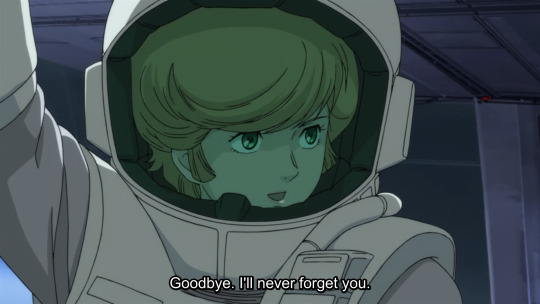
This smile is the first time I felt convinced that OVA Mineva might have ever had a positive thought about Riddhe. That's kind of nuts, given this scene is supposed to be the culmination of her finally deciding that caring about him and believing he has good intentions is not enough.
Still, it's... nice that they kept this line? A little humanizing moment for both of them? An actual hint that there was anything positive about this relationship for Mineva?
The way this scene is described in the novel is more harrowing, since we actually witness the moment the Garuda tears and Mineva gets stuck holding onto that steel frame. She's also wearing normal civilian clothes still, not a protective suit. The floor is warped and falling apart, so Riddhe getting over to her is more precarious.
Again the scene is told from Mineva's perspective, so we see her thoughts as she makes her decision.
She can feel the psychoframe resonance from the Unicorn and the Banshee fighting. She concludes that Banagher will definitely be able to hear her thoughts, because he's in a machine specifically designed for that purpose.
She also considers the jump to be a test, to prove to herself that she's following the right path.
I know that this choice [is] illogical, but the hand I want is in that light. Maybe nothing can be done, maybe we’ll just die with regret, but this is a test to me—a test to see whether [someone so small can affect the fate of] the world.

This is what romance is, to me.
After Mineva's jump, all of Riddhe's appearances for the rest of the episode are anime-original.
The fixation on the Gundam as an object of hatred is new. They basically made him do the same thing Marida does, with the verbal repetition, which is interesting. I hope they play up that comparison more.
Novel Riddhe resents the Unicorn and the Banshee for their ties to the Box and the Vist Foundation, but he never responds to them with this kind of mindless rage. He actually doesn't get angry at all during the immediate aftermath of Mineva's rejection. Maybe he would have if he'd been left to his own devices long enough, who knows— he gets taken out of the equation fairly quickly.
Riddhe returns to the Delta Plus and begins searching for Mineva, apparently too addled by grief to accept that she would be dead if someone else hadn't already caught her.
Marida shoots him out of the sky, completely unprovoked. She can tell it's a friendly machine and everything, she just gets pissed that it looks too much like a Gundam. lmao
The thick grey streamlined body was looking towards the sea of clouds below it, completely ignoring the “Banshee” as it tilted its head around. The allied machine marker and the name “Delta Plus” were indicated on the enlarged window, but these details did not matter to Ple Twleve. That was because the visor on the main camera was sunk inwards, and the head looked like it had eyes on it; to her, it simply looked like a “Gundam” without the horns.
“You’re a “Gundam” too…!?”
Ple Twelve [shouted] as she aimed the beam rifle at [the machine.] The “Delta Plus” showed no signs of [dodging, continuing to stare down at] the clouds. The human thoughts inside the machine suddenly entered her head, causing her fingers on the trigger to numb.
—Mineva, where did you go? Answer me. Don’t leave me alone, don’t leave me…
That thought interfered with Ple Twelve’s consciousness like noise, and she could sense the owner of this thought crying. The pleading ‘voice’ became a discomforting particle bouncing around in her mind, and she felt nauseous as she exerted strength into the trigger.
“If you’re just going to weep here, DON’T GET IN MY WAY!!”
The beam rifle let out a flash, and the empty Magnum cartridge was ejected from the gun. The beam grazed the “Garuda” wing, brushed right by the engine block, and the right shoulder of the “Delta Plus” was devoured by the light. As it was deflected by the impact and falling, the engine block of the “Garuda” let out flames as it got hit by the scattered particles that exploded, and the large machine lost another support as it tilted heavily.
His suffering makes her angry. Her own empathy is overwhelming and repulsive...
When I first read this, I found it extremely funny, even if it's obviously tragic for the characters. This time around I was able to take it completely seriously, because it will never match the comedy of "Riddhe repeatedly shoots the Banshee with a handgun while chanting 'Gundam' until Marida psychically brain blasts him into unconsciousness."
I like OVA Riddhe so much more now that he's insane. I feel like I'm being stockholm-syndromed into enjoying him.
What caused Riddhe's heel turn?
Even though Riddhe's dialogue about the box is almost identical, it feels like it comes from a different place because of his previous portrayal.
Both versions of the character experience a disillusionment, but the things they've lost faith in are different.
OVA Riddhe's arc feels like he has been forced for the first time to think about what he believes. His sheltered worldview has been shattered, and he has to grapple with that. Because of his position, he naturally reaches for the comfort of the status quo.
Novel Riddhe's arc is about the destruction of the convictions he already had. It's about watching this guy get repeatedly emotionally brutalized until he no longer believes in the possibility of a better world. He's willing to kill himself for societal stability because he thinks that's the best he's ever going to get.
The thing that drags him down is isolation. Mineva and Banagher both go through similar moments of disillusionment, and they both are ultimately pulled out of despair when they are able to reaffirm their beliefs through connection with other people.
Mineva is the one out of the three who holds up the best under pressure, possibly because her childhood demanded she develop that kind of resilience. A friendly guy in a diner was enough to help her get her bearings.
Banagher is literally catatonic after crashing on Earth. He recovers because Zinnerman deliberately, aggressively pursues him, refusing to let him waste away.
Riddhe responds to emotional distress by withdrawing from other people and throwing himself into his responsibilities. He isn't going to go looking for a friendly man in a diner. He doesn’t have a Zinnerman. Bright and Nigel are something, but evidently not enough.
The people he knew and loved from the Nahel Argama all think he's dead. The two people he's closest to now, Banagher and Mineva, are immediately confined where he's not allowed to see them.
There’s no one he trusts enough left to help him reorient. By the time he finally gets a chance to see Banagher again, he believes he defected to Neo Zeon. Rational communication is impossible.
Then Mineva throws herself off an aircraft rather than take his hand, which. Like. She had her reasons. But lmao
(For anime Riddhe, Mineva's rejection is clearly the final straw. I think novel Riddhe was already over the edge by then. Banagher's perceived betrayal was the breaking point. Losing Mineva as well was just salt in the wound.)
I still don't know why they replaced his model airplanes with this thing.
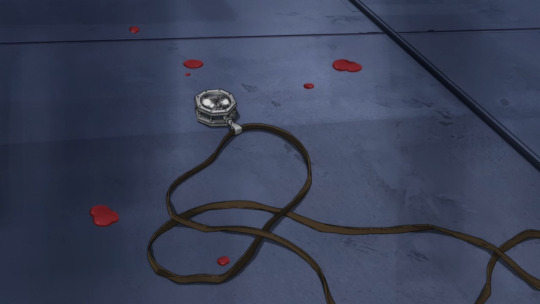
I'm curious. What do you guys think of Riddhe's lucky charm as a piece of symbolism? Does it add anything for you? They put an incredible amount of effort into visually highlighting it. Obviously, he drops it during his final scene in this episode to represent some kind of significant change or loss.
Aside from the charm being an anime-only addition, I think what throws me is that novel Riddhe had already lost all the things the charm would logically represent before this point. He already underwent his most significant emotional and ideological changes. "That Riddhe Marcenas is dead." It's why he can't make peace with Banagher, and it's why Mineva rejects him.
That's what novel Riddhe loses at Torrington: his two most important remaining relationships. I definitely don't think that's what the charm is meant to symbolize in the anime.
Since it's a charm for luck, I'm assuming it represents caring about his own well-being. That makes sense to me, when dropping it is being associated with choosing to pilot the Banshee. "Riddhi" is also a real name and word that means "prosperity" or "good fortune", which meshes well with that interpretation.
I'm assuming this means he's going to finally develop novel Riddhe's trait of deranged latent suicidality going forward. Beyond that, I'm not sure what to make of it— though I did like how it was used in "Return of the Lion".
Marida in the Banshee
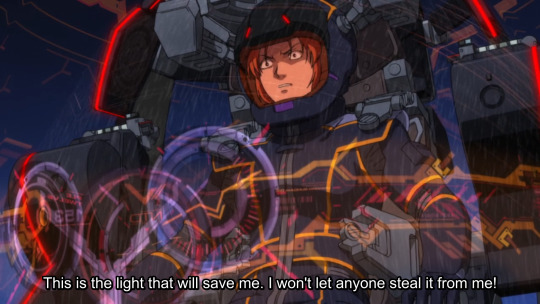
The motion sensor showed a matching signal, and the word “RAS-96” appeared on the screen. That’s called the “Anksha”, right? Name and model number, Marida and Ple Twelve. ... What is a name? What significance does it bear? It’ll simply cause confusion to call the same thing two different names.
[...]
I just don’t have to think. I can continue to fight as long as I don’t think.
There are things I could criticize about Marida's portrayal in the novel— we'll get to that— but I still found the anime version of this arc to be the less compelling version of the two.
I think there are three key issues here.
I've mentioned before that the environment mirrors the conflict between characters. The combat in the anime version is more static and less visceral, failing to match the heightened emotions the characters are feeling.
Characters in Unicorn are very densely interconnected, and minor details are often carrying more emotional weight than it might appear. If something had to get cut, Alberto's scenes were a rational choice— but removing them also means removing meaningful character moments for Marida.
Marida's history of sexual abuse was weaponized as part of her brainwashing, so it is referenced often during this part of the original text. In the anime, this is elided.
I'm sure it's difficult to thread the needle regarding that last point, and I sympathize. I mentioned in my last post that I think Fukui's writing could probably benefit from an editor willing to rein him in, and the handling of Marida is one of the areas I cited. The anime reined him in— but in this case, I find myself wishing they left more of the original. Ah, well.
I don't think there's a perfect solution here. I'm not sure there's even a more correct decision. All I can do is explain my own feelings about each work.
I wish Banshee pilot Marida was scarier.
Novel Marida sees significantly more extensive— and effective— use as Martha and Alberto's weapon. While her kills are all minor players in the narrative, at least one of them is a named perspective character with an important role in Neo Zeon's offensive.
Unfortunately, moving Torrington unavoidably defanged her a little as a threat. Since she didn't fight in the battle, she never had the chance to engage with anyone other than Banagher and Riddhe, and they both came out of it alive and physically sound.
They also cut the moment during her rampage where Marida causes the gruesome (accidental?) death of novel-only character Bentner, the head Cyber-Newtype researcher from Augusta. As someone who directly contributed to Marida's suffering, his death is poetic, even if it wasn't a choice she made with intention.
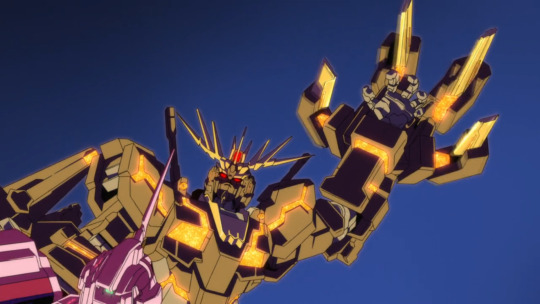
I'm a fan of this claw weapon. It gives the Banshee something that makes it more than just a visual Unicorn redesign, and it's appropriate for the lion theming. It's new for the anime, so I appreciate the addition.
I'm glad they kept the detail of the robots "screaming," and I dig the Banshee's new unique loadout, but the fight on the Garuda left me really underwhelmed. It was so cool in the book, man. There has to be more they could have done.
If you're specifically invoking the Axis Shock, I want it to look crazy. A colour overlay on the robots absolutely does not cut it. Have the surface of the Garuda that they're standing on start peeling! Get some real psychic miasma going! Make it so I can't even tell the sky is blue when the camera pulls in close. Something.
Am I being unreasonable here? Is this an unfair expectation?
I'm aware of the difference between drawing an illustration and doing the same thing in animation, but maybe this gives you an idea of the kind of imagery I had in my head going in:
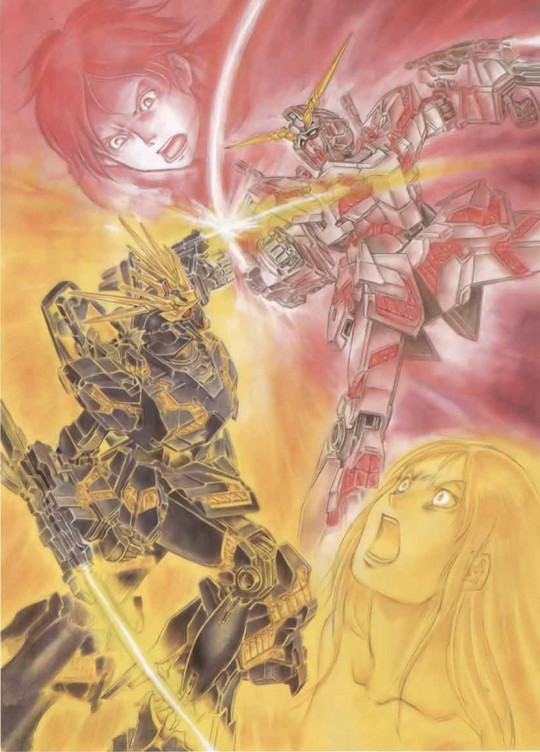
LOOK HOW SICK THIS IS.
Another thing about the novel's Banshee-Unicorn fight is that Zinnerman boards the Garuda while it's happening. He's literally an exposed human figure dangling on a wire while these metal giants are stomping around and swinging superheated beams at each other. Then the wire snaps, so Banagher has to catch him and cradle him to the Unicorn's chest while the Banshee attacks!
Zinnerman shoots the Banshee with a rocket launcher at one point. I swear to god, so much shit happens.
Marida tearing into the Delta Plus had more of the aggressive vibe I wanted, and it was definitely my favourite visual in the whole fight. The scene they placed it in, unfortunately, is still significantly less dramatic than the original scene that inspired it.
The anime version of the Garuda's hangar bay is essentially a big, empty arena for the mobile suits to fight in. In the novel, there's a ton of shit in there, and people are still present. Several small work vehicles explode, so the whole deck gets set on fire. There's human gore, because Marida unintentionally crushes Bentner with the Banshee's hand. It's a nightmarish scene, especially for someone like Zinnerman who isn't in a mobile suit.
Excerpt, for comparison:
The entire hatch was blown off, and [the air inside the plane was sucked out through a huge gash where the deck caved in]. The [wind roared in Zinnerman's ears] as he heard the frantic voices of the crew, “Retreat to the deck!” “We might have to evacuate everyone here. Get everyone to the escape pods!” He [could barely] distinguish the yells ...
[...]
He turned his [head sharply] and saw the black “Unicorn” with the thruster lights on its back, followed by the white frame of the “Unicorn Gundam” closing in on it. Both “Gundams” proceeded back and forth within the deck, [knocking down the hangar and releasing hot air from their verniers]. Zinnerman saw the black [“Unicorn's” hand fall, crushing an] old man in [a white coat.] Blood and flesh was splattered everywhere immediately, but [it was drowned out by] the impact and [sound] of ... these several ton machines [colliding, followed by] a hot wind [that blocked all vision] as it blew above his head.
The workcar got knocked into the air, crashing right into the compressed gas cylinders, creating an explosion of flames. The energy of the explosion created a quake, causing Zinnerman, who was sprawled on the floor to feel a rumbling, and he lifted his head only when the heat wave passed by. Alberto had disappeared, and the two “Gundams” were in front of him, stepping on the floor and trying to get up. The black “Gundam” was lit by the flames, [making the likness of] the “Unicorn Gundam” it [opposed] in this mirage, and the [golden glow of the] Psycoframe [flickered] like it was breathing.
[The heat of the beam saber erupting from the machine's sleeve made] the [catwalk railings] melt and bend like malt candy. “MARIDA!” Zinnerman covered his face as his skin was being burnt, but the black “Unicorn Gundam” did not care about what was below it as it continued to backtrack and knock over the work vehicles.
Like. Holy shit.
Sexual violence, gender, and "the light"
(Content warnings for this section: rape, csa, pregnancy and pregnancy loss, forced medical procedures, incest. I'm not getting graphic about it, but this is the primary subject of this section.)
I had a fairly negative opinion of how the sexual violence was handled in book 7 the first time around. It has the disadvantage of coming directly on the heels of book 6, which is the one that really pissed me off, so I wasn't feeling particularly charitable.
My feelings are more positive this time, now that I'm rereading with the context of the whole work. Paying more deliberate attention to Alberto and Martha has also paid off in that regard.
The screenshot I chose at the top of Marida's section has a very particular bit of dialogue in the subtitle:
"This is the light that will save me. I won't let anyone steal it from me!"
While it still makes sense with the overall imagery used in Unicorn— it calls back to the church scene, where Marida talks about how people need a light to keep living— they otherwise removed all references to "the light" from this episode.
"The light" refers to a lot of different ideas, but the way it's invoked by Marida in this arc specifically represents both a general desire to erase the violence that was done to her, and a more specific longing for a child.
I am instinctively predisposed to roll my eyes at "infertile female character with a strong secret driving motivation centred around the ability to become pregnant," especially when it's written by a cis male author, double especially when the story also involves a child conceived by rape.
While Marida is fixating on her past, Martha is constantly talking about wombs. We also just had Loni in book 6, who told us she wants to have ten kids. If you're already reading with a pessimistic outlook, it's easy to start feeling like every major female character except Mineva has suddenly had their characterization re-centred around how they relate to motherhood.
I'm sure that Fukui probably has different opinions about gender than I do, but I've ultimately warmed up a lot to these elements of Marida's story. It's more thoughtful than I was originally willing to trust it to be.
It helps that the repetition is very much not unique to female characters and motherhood. Marida strongly mirrors Banagher, Alberto, Angelo, and Full Frontal. When the paralellism is so consistent across the board, it becomes clear that the similarities between female characters are more than just the narrative assuming all women have the same basic neuroses and drives.
Marida is also brainwashed, obviously. Her priorities have been artificially altered, even if they contain traces of her genuine thoughts and emotions.
Moreover, her reconditioning was explicitly based on Martha. The similarity isn't just intentional on a meta level as a storytelling device, it was intentionally cultivated in-universe.
"Light" as a theme for Marida first appears during the church scene in volume 4. It's usage is roughly analagous to Banagher's "Inner God." It comes up again in that same book, during Marida's backstory flashback.
Light is a repeated visual element that connects every scene we see from her past. It's very much not presented as something with purely positive associations. In these brief moments, light is frequently something sinister.
Light is the first thing Marida sees when she wakes up for the first time, shining behind the silhouette of Glemy. Light is the explosive deaths of her sisters. Light is the neon signs of the red light district, and light is the surgical lamp of the abortionist. Light is her baby, already gone by the time she understands what it was.
Light is the open doorway when Zinnerman comes to take her away. Light is a reason to live. Light is the desire for purification by death, and the glow of a beam rifle shot that never comes.
However, the girl could recognize this warmth. A long time ago, a hand reached out to her from the water surface. The warmth of the human hand she touched when she was pulled out from the capsule was about the same as [this hand.] The girl focused all her consciousness on the thick and hard hand of the man. Warmth flowed out from there, and as she felt the cells within her shaking, the girl looked up at the man’s eyes. The [damp eyes] reflected her black and dirty face. Who are you? The girl tried to ask.
I’m me. The her present in the eyes answered. You’re not the 12th sister, but a one and only existence granted the name of Marida Cruz. You have a real master, so you must live for master. Don’t live on because you’re created this way, but give your all to serve your master.
This warmth is the real ‘light’, the one and only ‘light’ that reached into this darkness. Don’t let go of this ‘light’. Go do what master hopes for you to do, fight master’s enemies until this body of yours get burned one day, and all your sins and guilt return to nothingness— Marida’s thoughts were calling out within Zinnerman’s eyes. That’s just a curse on yourself! Banagher’s thoughts interrupted at this point. That’s just a curse you set on yourself. The Captain doesn’t want you to do that in the first place.
I know. You’re right. But I said it before, didn’t I? Righteousness might not be the only thing that can save humanity… Marida’s retorting thoughts merged into the light, surrounding the girl that was standing blankly in the underground room. The white light covered the entire room [...] and Banagher saw the light transform into heat as it evaporated the tears.
Light. A purifying light that burned all sins and guilt—
[...]
Since where is there this kind of redemption? Banagher yelled in his thoughts with all he hand as he tried to make the rioting machine stop. I understand you, whether dream-wise or illusion-wise. When our thoughts overlapped and resonance in that sensation, I saw your existence. Humans can understand each other—and that is the real ‘light’. What you want to redeem you is to reveal the possibility that’s dormant and release the inner god within you. However, you only looked at your past—
Basically, "the light" is introduced as the thread that connects all of Marida's suffering and hopes, and connects her to others. The way it's used while she's brainwashed is a departure, redefining it to represent only a small part of her past.
Consider that two extremely important associations that Marida had with light— Zinnerman and Banagher— have been deliberately removed from her memories. The shift in meaning makes sense.
But the thread is still there. The belief that "the Gundam stole my light" doesn't really make sense if we're only talking about her baby, does it? It only makes sense when we see the totality of her suffering: the loss of her child is the same as the sexual abuse that created it in the first place, which is the same as the death of her sisters.
Marida has never belonged to herself, but now the few things that made the world make sense have been taken away. Something is missing, and she wants it back.
(…The “Gundam”, is the enemy.)
The armor on the machine expanded, and the huddled black shadow expanded. “Miss Marida…!?” The “Banshee” did not respond to Banagher’s call as it lifted its head that was looking down, and the exposed Psycoframe started to radiate a golden glow.
(You’re the enemy that killed us. You’re the enemy that robbed the “light” from within me. You, you’re the “Gundam”…!)
Character parallels: sexual violence, non-consensual medical procedures, and textual comparisons thereof
I could write an entire essay just on this theme in Unicorn. Maybe I will, eventually.
I'm going to try to avoid getting too in depth for now, since there's a ton of relevant information that only comes up in later books. Still, I want to at least go over some general points.
There are many places in the text where the comparison is drawn, both implicitly and explicitly, between sexual abuse and other non-sexual violations of the body and mind— particularly in medical or experimental contexts. Marida is the point where this comparison is made at its clearest, because she has experienced both.
The sexual abuse, the forced abortion, the reconditioning, even her original creation as a Cyber-Newtype clone— these are all framed as similar kinds of violations.
Not every character has the framework to understand how these experiences are related, but Marida makes the connection instinctively, sometimes even collapsing them together in her thoughts as if they were a singular continuous event.
Is she wrong? They're even related on a causal level: the abortion happened as a direct result of the sexual abuse, and it was performed to allow it to continue. The reconditioning deliberately drew on memories of sexual abuse to alter her behaviour, and the woman who ordered it was herself a sexual abuser of children.
Martha is another obvious demonstration of the comparison: she's the point of overlap between both categories of perpetrator. Her sexual abuse of Alberto and her brainwashing of Marida function similarly, and both serve the same purpose of controlling the victim.
It's unclear exactly how much Alberto knows about Marida's past, but it's not a huge leap to assume he sees himself in her. If he isn't consciously recognizing her as another csa victim— or realizing the similarity between that experience and Cyber-Newtype conditioning— he at least understands that they are both Martha's puppets. The tragedy is his inability to admit that as long as he continues acting as Marida's "Master" he is actively complicit in harming her, not merely a witness.
I want to talk about Angelo and Frontal here so badly, but it's probably best that I hold off until at least the next episode. For now, I'll just say that Angelo is the most blatant Marida paralell in the whole series, and he has his own symbolic fixation akin to Marida's "light."
Gundam is the enemy
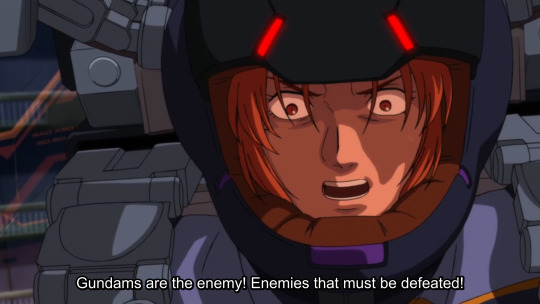
In the original work, the moment where Marida processes that the Banshee is a Gundam and concludes that she is herself "the enemy" does not involve Riddhe. She already shot him down earlier, so he isn't even on the Garuda at all anymore. Instead, the realization happens when she mistakes the Banshee's shadow on the wall for the Unicorn.
I guess they swapped the shadow for Riddhe because... there just isn't fire in the hangar to cast a strong shadow. But why? Why not put a fire in the hangar? Many inexplicable choices in this one.
Marida isn't just breaking the logic of her brainwashing by realizing a fact about the robot. When she makes this connection, she's also forced to acknowledge feelings of self-blame and guilt that she had been repressing. That's the sentiment that ultimately causes her to collapse: I failed to protect my master. I broke formation rather than dying with my sisters. I was too weak to protect myself, and too weak to protect my child. The person I want to punish and destroy is me.
She let go of the control sticks and touched her face with her hands. The flames lit the “Banshee” and the shadow of the “Gundam” was reflected on the wall. This means that I’m on a “Gundam” too? I’m inside the enemy, and the enemy’s inside me? The enemy that killed my sisters, robbed me of my ‘light’, and continues to remain in it no matter how I tried to chase it or catch it?
I’m my own, enemy—
A snake was wriggling inside her mind, causing the seeds of pain to erupt. Her body and mind were breaking apart. [The] ideals that were once connected to her heart were severed [and] the flesh and blood [flowing through] the machine [gradually converged into the helpless] body. I’m my own enemy. The one I hated [and] wanted to kill is [myself, the person] who can’t protect my own ‘light’.
(Mineva actually calls this very early. In one of her scenes with Martha, she thinks to herself that Marida is not actually being animated by revenge on others like Martha believes.)
Here's how the encounter concludes:
Marida falls out of the cockpit. Notably, she is still conscious. Her inner monologue immediately identifies Zinnerman as her father when he reaches out to her; it's very sweet.
Alberto is still in the hangar. He panics, and tries to tell Marida to get back in the cockpit again. She doesn't recognize his voice.
One of the Anksha mobile suits from the battle outside flies into the hangar through the open hatch. It takes aim at the Unicorn, and Marida immediately realizes Zinnerman is in danger and will not be able to get out of the way. She calls out to the Banshee and wills it to move, and it does— it raises its Beam Magnum and fires.
The Anksha is hit by the Beam Magnum and explodes. The shot it fires goes wide, hitting the side of the Banshee. Marida is thrown by the force of the blast, and burnt by the wave of heat.
Banagher gets out of the Unicorn and helps Zinnerman and Marida into the cockpit. They're both a mess. Zinnerman is covered in ash, furious and crying with bloodshot eyes. He tells Banagher not to waste time— "I won't forgive you if your blunder ends up killing her."
When they're about to leave, Alberto stumbles over to the Unicorn in a daze. Banagher is shocked, having assumed that he had already left on the shuttle. He re-opens the cockpit and tells Alberto to get in.
Shaken from his daze, Alberto is infuriated by this offer. He pulls out his gun and fires at Banagher until he is forced to close the cockpit and leave.
Alberto goes down with the ship.
The Fate of the Garuda: Who Goes Where?
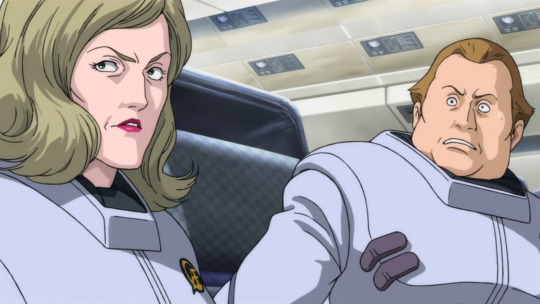
In the OVA, we see Martha and Alberto leave on a little aircraft shuttle together, directly from the Garuda.
The Banshee is still on the Garuda, where it is found by Riddhe after he regains consciousness.
Mineva, Zinnerman, and Marida all make it back to the Garancieres, which is successfully picked up by the Argama.
The General Revil shows up at the end, as well as Full Frontal and Angelo. Banagher is still in the Unicorn.
In the novel, Alberto and Martha are separated. Martha boards the shuttle, but Alberto stays, because he's worried about Marida.
Banagher offers Alberto a ride in the Unicorn, but this enrages him, and he shoots at Banagher with his handgun until he retreats into the cockpit and leaves.
The Garuda crashes, with the Banshee and Alberto still on it.
Riddhe was shot out of the sky by Marida, after which he fell unconscious. When he wakes up, he retrieves the Banshee and Alberto from the wreck of the Garuda.
Zinnerman and Marida are not able to be brought back to the Garancieres in time, so they are still in the cockpit of the Unicorn when Banagher connects the tether.
The Garancieres and the Nahel Argama escape successfully and are not immediately pursued. Angelo and Frontal show up several days later, at the start of the eighth book.
So, there are quite a few differences, but I think Alberto's scenes are the most obviously significant that I haven't already discussed. I've mentioned this a few times in previous sections, but Alberto is a different type of character in the novels than he is in the anime. The novel takes him significantly more seriously and gives him a larger role, while the anime has kept him within the realm of comic relief.
I'm going to include a bunch of excerpts here, sorry. I think they're more illustrative than just me summarizing or listing character traits. I've tried to shorten them and fix the worst of the grammar.
Alberto with Zinnerman, refusing to leave on the shuttle:
“She’s no long a member of Neo Zeon. Give up and leave this place. The “Garuda” won’t last for long.”
This person is Marida’s current master. Is his name Alberto? the blood surged up Zinnerman’s head as he growled, “What nonsense are you [spouting?]” ...
“You’re the one who should scram. I’ll take Marida back. She’s not the tool you people think she is.”
The gun held in both hands trembled even more. This [guy] isn’t used to [this kind of] situation. Zinnerman understood that it was not wise to agitate the other man, but he still finished his words.
[However, he was taken aback by Alberto's agitated reply—] “I KNOW THAT!”
“SHE’S NOT A TOOL! SHE’S…”
Alberto was at a loss of words. [His lips twisted, and a bitter expression appeared] on his face.
What’s going on? Zinnerman frowned for a moment, [then heard a yell—] “Master Alberto! Hurry! The shuttle’s leaving!” [— as an old man in white clothing] appeared from the side, [completely covered] in ash.
“Oi, someone’s calling you.” Zinnerman pointed his chin, and Alberto glared back at him as he exerted more strength into his hands holding the handgun. ...
Alberto witnessing the Unicorn vs. Banshee fight and finding Bentner's horrible crushed corpse. Again he refuses to abandon Marida, even when Martha directly contacts him and tells him they're leaving:
... [The] flying high-heat particles [were] scattered [and rained down] as [a] powder of light. [They] landed between Alberto’s [thighs] and [made a sound as they melted into the floor], [and he scrambled] back [in fear]. As [his hand reached behind him, it] touched another person’s arm, and he gasped as he turned around. The [arm, wrapped in the sleeve of a torn labcoat, clearly] belonged to Bentner, but [there was no proof.] [Just like the white coat,] there was no body beyond the [severed] shoulder, [only a pool of blood like splattered red paint] ...
The scattered particles of the beams dropped into the [pool], and [white steam rose from the mixture of blood and solid matter]. The smell of cooked meat entered his nose, and [all Alberto could do was] remain seated, [unable to feel anything]. [...]
(What are you doing, Alberto!?) It was only [upon hearing Martha's hysterical yell] that he finally thought of bringing the wireless communicator to his ears.
(We’re leaving. Forget about [the] specimen. We just need to find a replacement, whether it’s the machine or the pilot.)
Alberto’s numb senses were jolted awake by this voice, and he looked down at the communicator in his hands. She doesn’t understand. Aunt [Martha] doesn’t understand, and she has no intention of understanding—no, maybe to her, everyone else is just something that can be replaced ...
(There’s no time. Hurry—)
Alberto ignored Martha’s call as he switched the frequency of the communicator. “Ple Twelve, it’s me, your Master. Do you hear me?” [...]
“There’s no need to reclaim the machine ... Wreck the “Unicorn”. Hurry up and beat that guy and escape me with. You and I are the only ones left here.”
Alberto thinking about Cardeas, Banagher, and his childhood. Very brief / vague mention of incest:
“If it’s you, you’ll definitely be able to beat the “Unicorn”. This guy’s the cause of everything. As long as you destroy it, the path leading to the “Box” will remain sealed, and aunt will only give up. Even my father…”
Can only give up, right? Alberto could not help but ask himself, and shut his mouth as he answered himself. Wrong, that man will never stop. [In this kind of situation,] Cardeas Vist [would simply take a proactive approach and plan his next move]. [Using his own strength as the standard], [he determined] that [the weak] were simply [lazy]. That willful foolish man ignored his own son and left the “Unicorn” to the [child of his mistress]. Why did things end up like this? Who let the gears spin out of control first? [...]
He recalled the expression his father had when he died, that look of despair and pity ... [and] the [sudden rush of] emotions [dampened] his vision. No, I’m not the one at fault here. It’s his fault. ... Banagher Links took [my] dad away, and even took the machine he built, [without] even [realizing] that he [had stolen anything] at all. That guy [is the reason everything was] thrown [into chaos].
Just looking at [him] makes me anxious. [...] I feel inferior, like I’m being taunted for being useless. It [would be] good if he [had never been born]. If I could be as strong as him, I [wouldn't] have [had] a complete breakdown in relation with dad, I [wouldn't have ended up in] an abnormal relationship with [my] aunt, and I [couldn't have] possibly [harmed] dad— Tears swelled in his eyes and slid down his cheeks; he wiped them away and brought the communicator to his mouth.
...
I won’t let you take anything else away from me. Marida will beat you. This [unique] life that’s strong-willed [and] gentle, [who feels ephemeral and fragile like my mother,] [she'll] defeat you and settle all our debts. I don’t need aunt [Martha], and I don’t need dad. I’ll just wait here, until ... the “Banshee” [slices] you apart and [chases] away the [inescapable darkness.]
Mother comparison. Of course.
I'll skip Alberto rejecting Banagher's offer of help, since I already described it.
That brings us to the final scene of the novel, where Alberto wakes up in the cockpit of the Delta Plus with Riddhe. Interesting that it can still fly despite falling out of the sky earlier— maybe the shot Marida fired knocked him unconscious immediately, or it can only stay airborne in waverider mode?
This ending makes me lose my fucking mind every time I read it. Riddhe saves Alberto's life and then they literally fly off into the sunset while Alberto thinks about how much they have in common.
Alberto opened his eyes. The light in reality was too sharp, and he closed his eyes before opening them slowly again. What he saw first was the sea surface from the sky.
[...]
Is this some mobile suit cockpit? he touched the curved monitor panel at his feet and intended to look up at the linear seat beside him, but at this moment, a shadow appeared in a corner of the all-view monitor, and his heart jolted, beating his chest.
There was a mobile suit riding on the “Anksha,” ... gliding diagonally below ... He realized that it was the “Banshee”, ... Alberto looked down at the machine lit by the [light reflecting off] the sea, and [he] thought of the name Marida, [when a voice rang out from just beside him.]
“We can’t seem to find the pilot.” ...
[Alberto] lifted his [gaze] and looked [back] at the linear seat to find Riddhe [Marcenas] there. Riddhe looked at him for a moment, before turning his somewhat forsaken expression forward as he activated the display board. He opened the expanded window to show the “Banshee” [up close] as it laid down on the disc, but Alberto’s face remained unmoved. How did things end up like this? Why is this guy—no, where is this place? Alberto could not clear the doubts rising [in] his heart [as] he [stared at Riddhe's face]. ... Riddhe turned around in an annoyed manner [and] removed his helmet, [running his hand through his blond hair.] “Since you’re awake, pull out the assistance chair yourself,” [he said curtly.]
“I’m already out of breath [just from pulling] your unconscious [body] on board. You’re an Anaheim employee, so you should know the [layout] of a mobile suit, right?”
... Alberto looked around the inner wall of the cockpit again. Since he could see the sea surface, it meant that this mobile suit was not on a Base Jabber, which meant that it could fly in atmosphere on its own. This means that I’m on Riddhe’s machine, the transformable “Delta Plus” in its wave rider form? Upon realizing this, Alberto calmed down slightly as he exhaled. He searched his tattered clothes, [confirmed] that he had no [real] injuries, and turned towards Riddhe again. “Why did you save me?” he asked...
[Riddhe didn't even make eye contact.] “That’s [just] how things are going now,” He answered with a sigh.
“I [passed out] after I was shot down by the “Banshee”. By the time I woke up and got back to the sinking “Garuda”, you and the empty “Banshee” were the only ones [left.]”
Riddhe looked over at the “Banshee”, lifeless like a puppet as it laid on the “Anksha”, and narrowed his eyes. “The “Unicorn” has vanished.” And Mineva too… some heartfelt words could be heard right after this mutter, and Alberto did not intend to ask further [...] His love affair may have ended, this understanding landed upon the cavity in Alberto’s chest and created ripples in his hollow body.
Both of them were descendants of those cursed by [“Laplace's Box”,] and both [had] lost their fleeting love—[with skepticism, a sense of loss, and a touch of empathy,] the “Delta Plus” [flew] through the [twilight] sky. [Unsure of] where they were going or where they should go, [Alberto] looked [out] at the [amber-coloured] sky and sea. The “Anksha”, ferrying the unmanned “Banshee”, turned with the sea surface behind it as it pivoted its way through the crimson sky, [leaving behind] an empty trail of jet cloud.
Alberto/Riddhe real...?
The Escape: RGB Gamer Mode
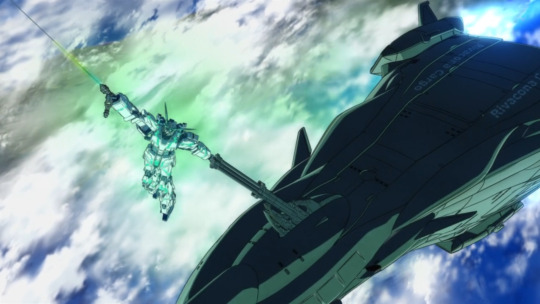

The original text description of this phenomenon is a little more blatantly rainbow and less dominated by green, but these visuals are still very pretty.
The ghosts of Daguza and Gilboa do not appear during this scene in the novel. I think they're a sensible addition. It foreshadows exposition about "lingering thoughts" that we should be getting next time.
The biggest change here is that in the novel, Marida and Zinnerman are still in the cockpit with Banagher. There was no time for them to be transferred to the Garancieres while shaking off their pursuers. The trigger for Banagher's renewed determination, the Unicorn's strange glow, and the resulting miracle is Marida regaining consciousness for a moment and taking his hand.
I would have really liked to keep that... I think it's a strong way to end a conflict that had Marida as such a central figure, and the imagery ties directly into her fixation on "the light". Marida does have an inner light, and none of the terrible things that were done to her can ever take it away.
The General Revil: What????
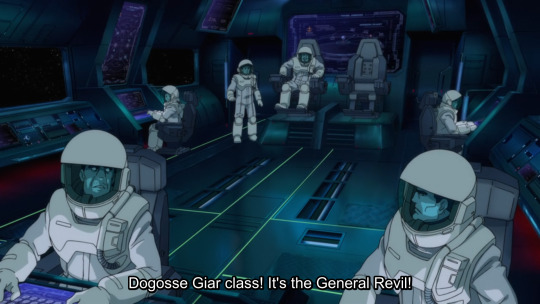
They introduced the General Revil this episode, when Bright talked to Beltorchika. I was still incredibly taken aback when it showed up at the end. Especially since it immediately engaged in combat? This was very much not what happened in the original.
Bemused as I've been about it, it's easy enough to figure out why this was done. Again, they're cutting things for time, by making the path between locations and plot points more direct. I just really wasn't expecting it!
In the novel, the crew of the Garancieres and the Nahel Argama get away successfully, and it takes some time before anyone catches on to where they actually went. I'll probably get more into the details of all that next time, since it's the start of book 8.
I will say that the Federation ship that Angelo and Frontal attack like this in the novel gets destroyed. Surely they're not going to sink the General Revil... ???
Speaking of which,
THE BOYS ARE BACK IN TOWN

Do you have any idea how happy I am to have an excuse to put pictures of Frontal and Angelo in one of these again? Do you?

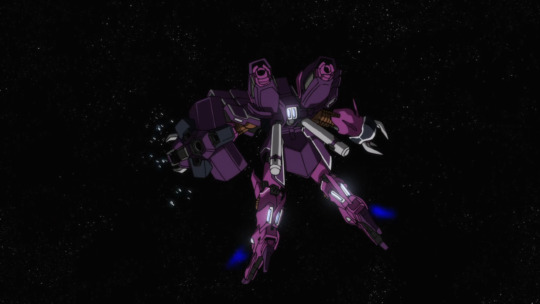
The Rozen Zulu is one of my favourite mobile suits. Stiletto heels, big metal claws, INCOMs, and character-focused visual theming? She has it all.
This is exactly the problem: this part was the coolest robot stuff in the whole thing to me. An exciting hook is never a bad thing, but I think the coolest robot moments should always try to be the ones at the emotional core of the episode.
Yes, I know I get excited every time Angelo and Frontal show up. I can distinguish that from this. Did you see those ReZELs get melted? Did you see Frontal's totally unnecessary bazooka twirl? So good.

I'm glad he's having fun. :)
So that's the end. It looks like we have quite an exciting setup for next time— which may or may not be a bit of a fakeout, depending on whether they're keeping or skipping certain scenes.
I'm not even going to try to make predictions at this point.
Haro, play Broken Mirror by Boom Boom Satellites.
20 notes
·
View notes
Text
@wxtchpilot
It was in the Ra Cailum, a large battleship commanded by Bright Noa of the Earth Federation.
Due to the large number of conflicts happening around the Earth Sphere, like civil unrest in Earthian society, the war against Neo Zeon, the return of the Invaders and Mechanical Beast and others, a sort of large force was gathering itself in order to resolve all of these threats.

The result was a diverse but strange mix of pilots and mechs in the battleship. Controversially enough, one part of this improbably force was a group of students from the Asticassia School of Technology, and another was a man once accused of murdering one of the most brilliant minds on Earth, who stood in ragged clothes, glaring at a girl in red hair, chosen to join due to her immense combat prowess on her GUND Format - equipped unit, the Aerial.
14 notes
·
View notes
Text

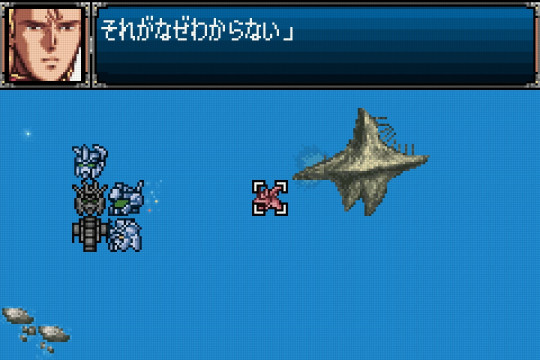
Char: "Why can't you understand? The humans you trust so much will destroy the Earth..."
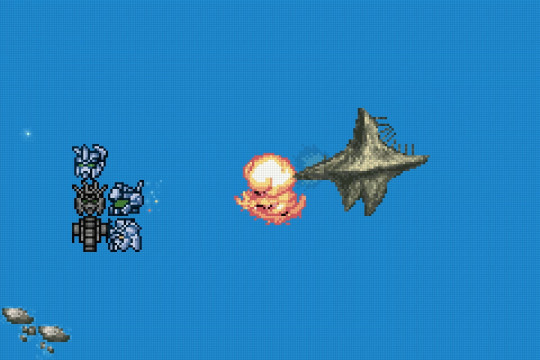
...Hmm. That's... that's it? Something's missing. He didn't even say anything relating to his deep-seated mommy issues.
Oh well, I'm sure there's nothing to worry about.

In any case, Bright orders everyone to return to the ship, and he moves in to commence the Axis detonation operation.
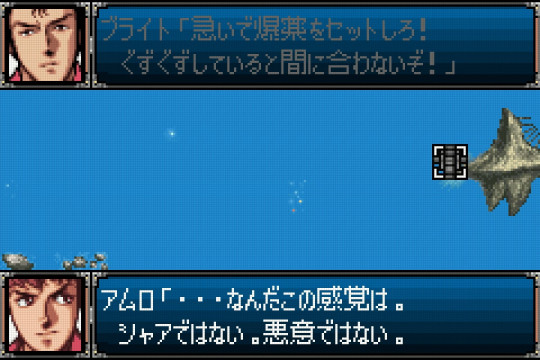
...But something's wrong. Amuro feels something absolutely horrible. It's not malice... but it feels very dangerous. As if on cue, we hear quite possibly the worst thing you can hear over comms after your friends have boarded an unknown space vessel.
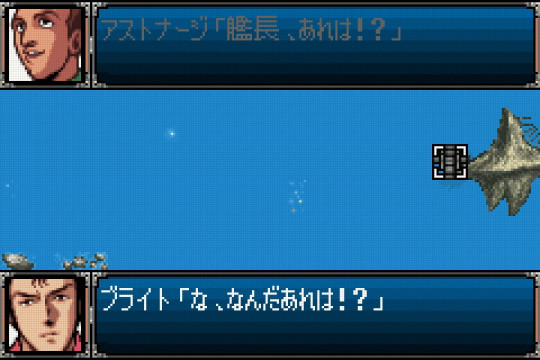
Astonaige: "Captain, what is that!?"
Bright: "Wh-What in the world is that!?"

Amuro: "BRIGHT, RUN!!"
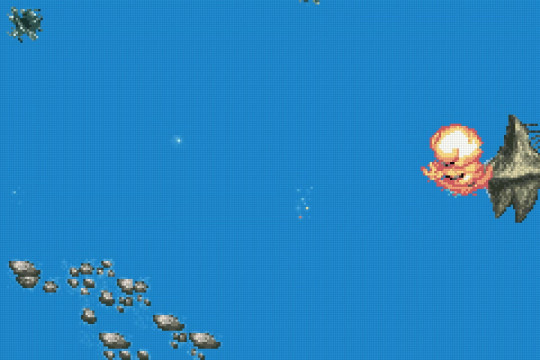
Terror fills the bridge. No one, not even Amuro, knows what just happened, but everyone felt that explosion just now. Astonaige calls in. It's an enemy, one he's never seen before...
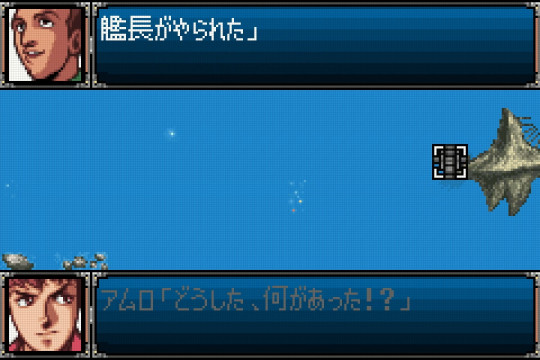
...And it just killed Bright.
Before any arguments about the chain of command can occur, or Hathaway can process the death of his father, Astonaige too is killed.

A loud voice booms.

"This was your error. Your mistake."
Raul immediately recognizes this voice. Regardless, it continues.
"It's impossible to know of a mistake in advance. Thus, it was also impossible to have known me."

Tired of this, Raul deploys once more.
Raul: "Show yourself! I know what you did! I'll get you back for what you did to us on the Moon!"
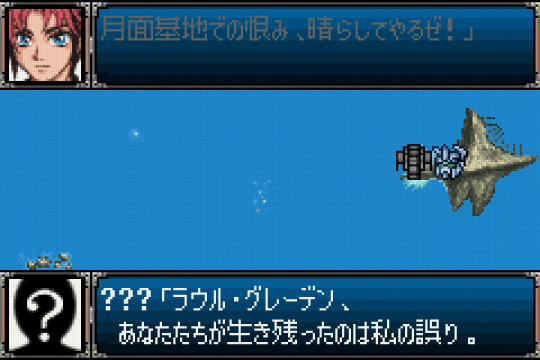
"Raul Gureden, you and your friends' continued existences are my mistake."
"...I see, making mistakes leads to situations like this one."
"I never thought i'd end up in the Creator's position. But there's no way around it. This was my mistake."
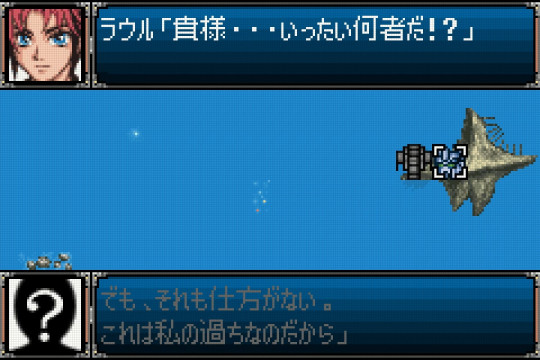
All of this is flying over Raul's head. All he wants to know is who is the owner of this voice.

"My name is Duminass."

Just as Raul asked, it showed itself, much to the terror of everybody still alive. And to answer Raul's provocations...
"I must fight those who reject me..."
The frame is a mess, and the engine is leaking. If there was ever a time to put the spare Excellence to use, that time is now.
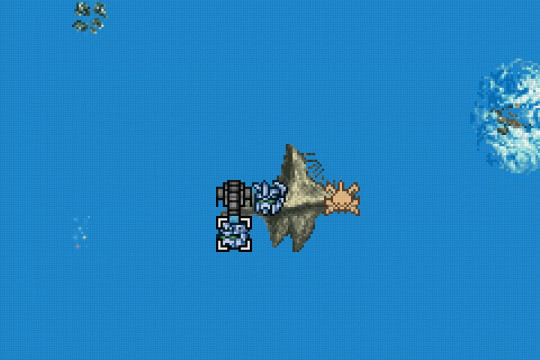
Crammed together into the cockpit, Raj and Mizuho set off to rescue Raul. This frame isn't suited for space combat, but they can't afford to be picky right now.
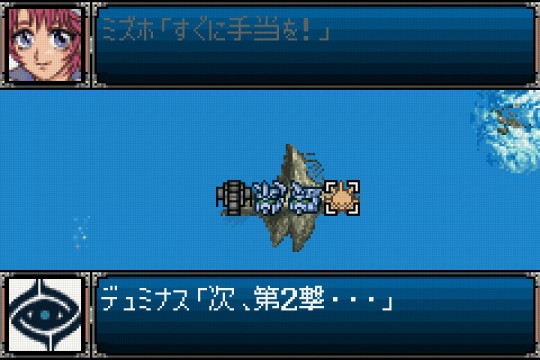
As they rescue Raul, Duminass readies its second strike.

The trio can't even consider themselves lucky in a grim sense for not being hit while they were wide open, as the damage to the Ra Cailum was critical; its nuclear pulse engines are going to explode.
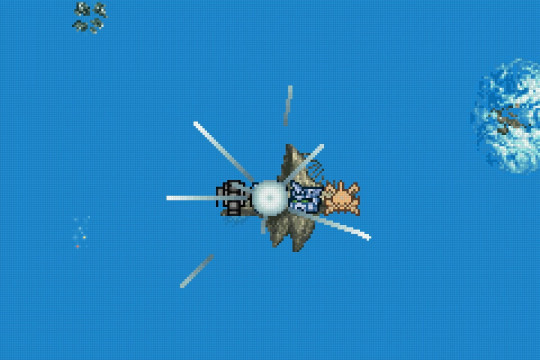
And as if things couldn't get any worse, the first Excellence unit's Timeflow Engine is overloading. Raul can't stop the turbines, they're spinning on their own no matter what he does.

"...What is happening? I cannot comprehend..."
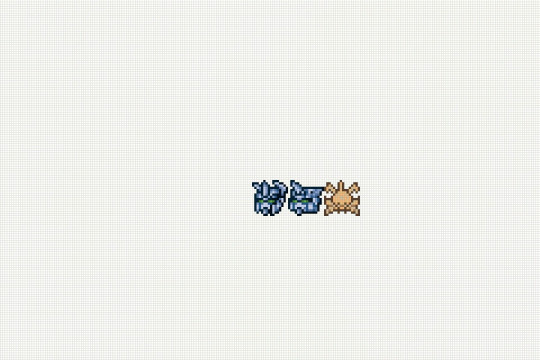
This probably isn't good.
The engine's output rises to over 200%. The engine itself should have no way of handling this much energy. And there's no way to stop it.

10 notes
·
View notes
Text
My crazy batshit Tekken 8 guest character prediction
Gentlemen, ladies, non binary folks, and all others… I gather you here today to tell you something that I have been thinking long and hard about.
As you may know, Tekken 8 is out. And as you may know, there is planned dlc. And, like in Tekken 7, Tekken 8’s dlc will have dlc characters.
We have no idea who he or she will be, some say I will be from another fighting game, like Akira from VF or Terry from fatal fury… some say it will be from a popular tv show or movie, such as young Sheldon, or breaking bad… others even say I could be tifa from final fantasy. All these theories, these outcomes, could probibly happen.
But today, I give you something insane, the most chaotic rout Tekken could go when it comes to guest stars. The most batshit insane crossover ever.
Sonic the Hedgehog will be in Tekken 8.
I’m not fucking joking, if you REALLY think about it, and use all of your brain cells, it’s so conceptually STUPID, it could ACTUALLY HAPPEN.
Case in point:
1. IM RIGHT YOUR WRONG- I-I-mean, sonic is really popular right now
Like, really REALLY popular right now, practically in a renaissance right now? With the recent release of sonic frontiers and sonic superstars, the HUGE popularity of idw, and like, the entirety of sonic prime, it just makes sense, sega right now is just like “oh my god, they’re just gunna buy ANYTHING ARE THEY?!??”
And so, ya know what sega sees when sonic is in Tekken? Dollar signs. This reveal will probibly make the fandom CRAZY and profits would go OVER THE ROOF at sega HQ.
“Erm but actually…” you may say “namco says that all the dlc characters are going to have a special character episode in the story, meaning that sonic wouldn’t make sense lore wise, it would be batshit crazy!! uhhhhhhhhh”
Case in point:
2. Tekken is already batshit crazy
Akuma from street fighter is canon to the lore of Tekken. HE IS IN THE STORY MODE OF TEKKEN 7!!! PLUS, this is a fighting game with
1. A boxing kangaroo
2. A bear
3. A space ninja
4. Negan from the WALKING DEAD
5. GEESE FROM FATAL FURY
6. NOCTIS LUCIOUS CAILUM FROM FINAL FUCKING FANTASY
So of COURSE they’re gunna find a way to put sonic in Tekken lore, of course they’re going to do that, AKUMA WAS IN TEKKEN 7 FOR FRICKS SAKE
AAAAAA
Case in point
3. It will boost Tekken’s popularity and bring a whole new audience to the game
I tell you, A LOT of people are going to freak out if he gets in the game, Twitter would shit down for a week, the entire Tekken yt community will have THOUSANDS of videos about sonic, the sonic fandom would go into a chaotic frenzy, everything would go crazy, because SONIC THE BLUE FASTEST HEDGEHOG WILL BE IN TEKKEN FUCKING 8!!!!!
In conclusion, Sonic will be in Tekken 8, I’m right your wrong and no I am not ok thank you for asking. :3
2 notes
·
View notes
Text

Ardyn Lucis "Christ" Cailum
10 notes
·
View notes
Photo

They’re in love
Cailume-She/Her, Clan Silverwind (Librarian)
Aureus Lux-He/Him, Clan Silverwind (Scribe)
#flight rising#fr art#flight rising art#frfanart#fr imperial#fr fae#cailume#aureus lux#silverwind#Today on I don’t subscribe to canon size differences#Cailume is the imp#Aureus is the fae#art in the wind
58 notes
·
View notes
Text
practice for Infinity Ghosts!
Schlick. A twist of Saoirse’s hand and the sharp of his blade presses against the soft of Cailum’s neck, hard enough that the skin threatens to give beneath it.
Cailum freezes. Ba-dump ba-dump ba-dump, his heart thudding in his chest. Rain crashing down around them. His voice, hoarse and raw, “Sao?”
“It’s nothing personal,” says Saoirse, as if they haven’t been together since the start of it all, two knock kneed boys hiding in the barracks with shaking hands and stolen cigarettes, as if they haven’t seen the best and the worst and everything in between.
“Nothing personal,” echoes Cailum, and the words feel stale even before they leave this mouth. There’s rain sliding down into the back of his armor, trousers caked with mud, fingers slack enough that they’re barely gripping the handle of his own blade.
“That’s right,” says Saoirse. He presses a little harder, trying to goad Cailum into taking a step back but -
- he can’t. Every muscle in Cailum’s body has gone stiff as a pulled taut wire. The blade cuts in deeper, breaks the skin. Hot blood, washed away fast in the downpour.
Saoirse insists, “nothing personal. But I can’t have you getting in my way. Do you understand that?”
“I thought - “ The words are trapped, like the blade is stopping them from coming out any further. Cailum thought.
He thought.
But -
- Saoirse is there now, blade in hand, thick silver hair matted down by the rain, pale like the ghost he’s always sworn he could become.
“You thought wrong,” says Saoirse, tongue twisting like a blade to the gut. Cailum might as well be spilled out on the floor like the rogue infinites they were sent to collect. Like too many good people that have died at their hands; like knock kneed kids hiding in the back of the barracks with smoke tipped tongues and liquor stained teeth and death already carved into their skins.
The scarred emblem on Cailum’s chest burns with all the fires of the Asterium. It might as well just have been split through for all that he feels like a whole and solid person.
Saoirse presses harder. It should hurt. It doesn’t. The rain washes away the blood. If Cailum is crying, there’s no way for either of them to tell.
But Cailum does not move.
I will always have your back, stupid whispered wanting things. The rain crashes down. Thunder claps and -
- Cailum wakes up in his own bed, drenched in sweat and clawing bloody lines into the scar on the side of his neck.
19 notes
·
View notes
Photo
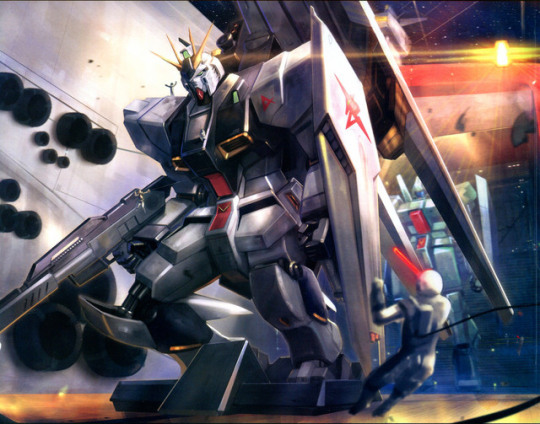
Nu Gundam launching
#nu gundam#char's counterattack#gundam illustration#Londo bell#ra cailum#mobile suit gundam#gundam#mgs#cca
74 notes
·
View notes
Photo


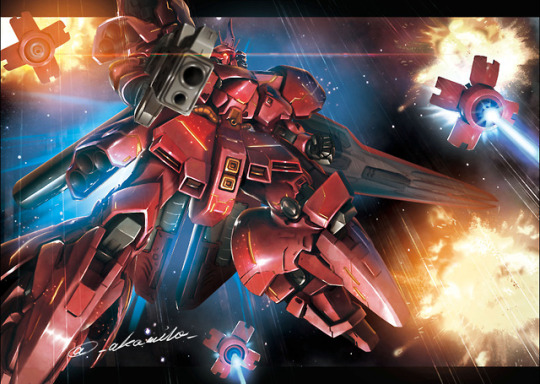
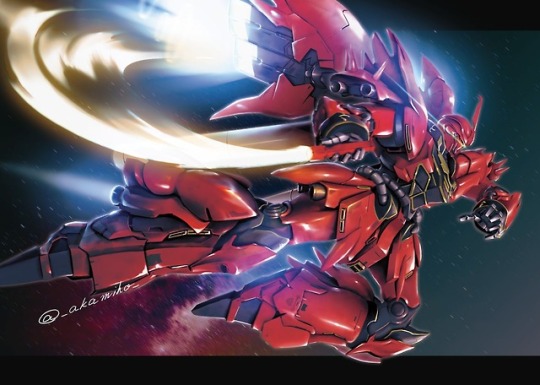
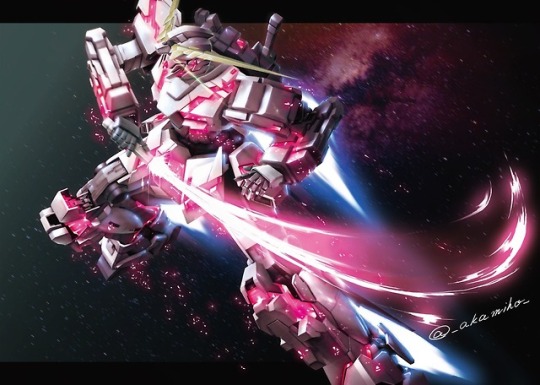



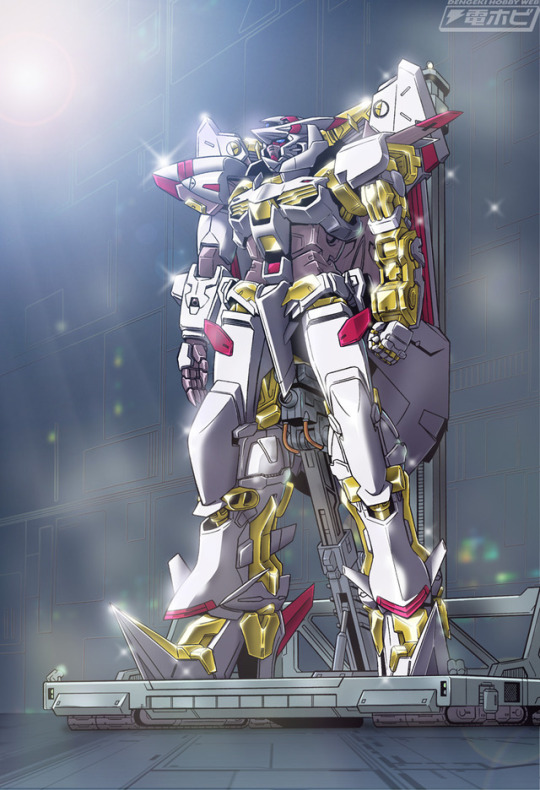

#Mobile Suit Gundam: Beltorchika's Children#Hi-Nu Gundam#Mobile Suit Zeta Gundam#Zeta Gundam#Char's Counterattack#Sazabi#Gundam Unicorn#Sinanju#Unicorn Gundam (Destroy Mode)#Gundam Alex (Chobham Armor)#Gundam 0080#Jesta Cannon#Ra Cailum-class#Gelgoog Jäger#Rick Dom II#Zanzibar-class#Mobile Suit Gundam#Gundam SEED ASTRAY Princess of the Sky#Gundam 0083#Gundam Zephyranthes#Kou Uraki#Nina Purpleton
232 notes
·
View notes
Text
Gundam Unicorn OVA 4: At the Bottom of the Gravity Well
I thought the last one was the prettiest, and they might have one-upped themselves again. The shot composition alone...!
...This is a really weird one to talk about. Probably my most opinionated post so far, and even longer than the last one. This monster is over 15k words, I'm so sorry.


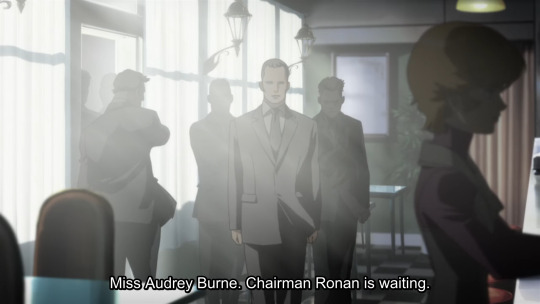
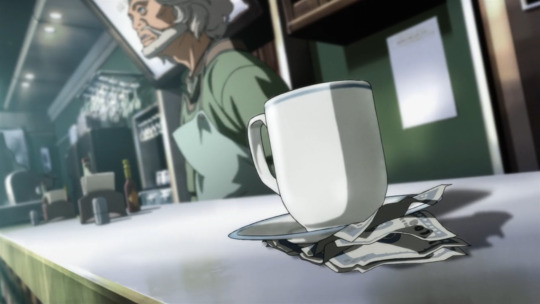
The sixth Unicorn novel is an extremely frustrating experience for me. It's my least favourite of the books by a wide margin, and it comes at you very suddenly after the first five, which I think are generally interesting and a lot of fun.
OVA 4 covers the plot of the sixth novel. It removed everything I disliked about the book, and replaced it all with something much better.
...And then it found entirely new ways to annoy me, by removing or otherwise fucking around with several novel scenes that were already good. Yes, it's Riddhe again.
I'm genuinely kind of baffled.
Still, overall it was a far more enjoyable experience than its novel equivalent. I'm going to talk about novel stuff right away this time, because it's kind of unavoidable. The OVA is very different, right from the first scene.
(Previous posts: Day of the Unicorn, The Second Coming of Char, The Ghost of Laplace)
FYI: I'm saving detailed discussion of any particularly disturbing or otherwise sensitive novel-only content for the end, in the last two sections. There will be content warnings listed under the headings for those sections.
Major structural changes: Dakar and Torrington
This is a huge change, right out of the gate. The attack on Dakar is where the main conflict of the novel takes place, but here it's already ending in the very first scene! For a while I wondered if they were going to return and attack it again, but it quickly became clear that wasn't the case.
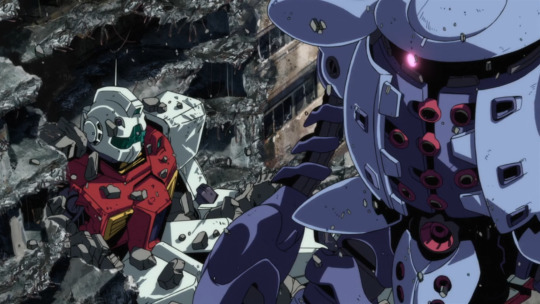
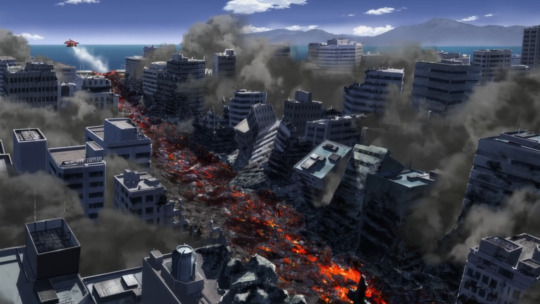
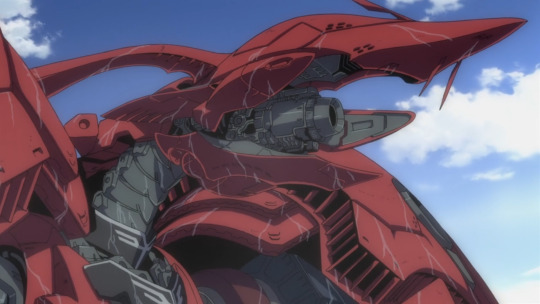
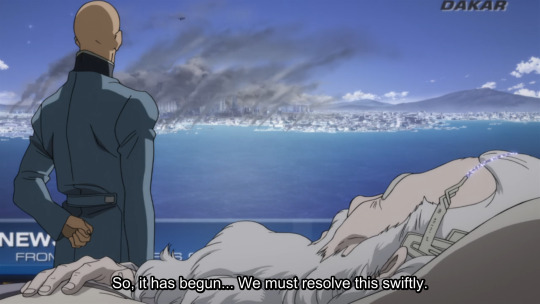
Syam and Gael make an appearance. They don't tell us anything new, I don't think-- and we've seen that colony drop flashback before too, haven't we? I could be wrong. Regardless, I think they're mostly just making sure the audience doesn't forget Syam and Gael exist while everything else is going on. Probably a good idea.
We know a lot more about Syam's deal right from the get-go in the books, because it's literally prologue. I feel like significantly less has been explained here about his history and the history of the Vist Foundation-- but it's admittedly hard for me to keep straight what we've been told in previous OVAs vs. any gaps I may be filling in with prior knowledge.
I do wonder how they're going to handle him going forward. Are they going to infodump a bunch of relevant history and character motivation further on? Are they just going to refuse to elaborate on certain things?
Because they've been skipping over smaller character details about Syam that we learn through Cardeas, Martha, and Gael, he seems to be presented as a lot more... straightforwardly benevolent, at least on the surface. Almost ethereal, even. I think novel Syam has more of an edge, even if he's supposedly feeling repentant now that he's a sad old man.
Oh, and Gael. Gael was shot by Alberto on the Argama during the Palau battle, in the fifth novel. Maybe something equivalent to that is coming in the next OVA, on the Ra Cailum instead? They could also just skip it, since he survives and appears after that anyway.
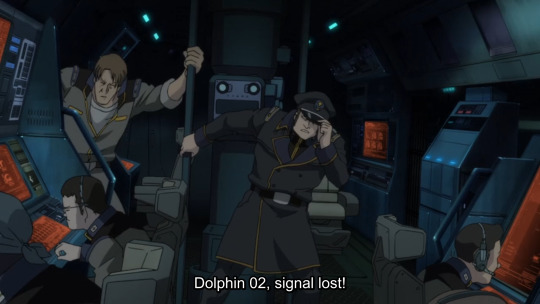
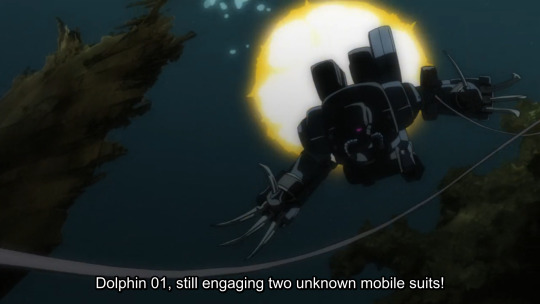
This Zee Zulu was not present for the novel scene I'm about to discuss, but consider this: I like aquatic mobile suits.
The novel opens like this, with the Shamblo destroying a submarine. The context is different than the anime equivalent, since Dakar hasn't happened yet and there are no other mobile suits present. Nobody in the Federation is aware the Shamblo even exists yet.
The submarine in the novel was searching for the Garancieres, since it was believed based on the trajectory that it would have landed in the ocean (as opposed to the desert, where it actually ended up). One of the sonar operators picks up some strange noise, but it doesn't fit the profile of what they're looking for, so his superior tells him to ignore it. This was a mistake. The Shamblo-- also searching for the Garancieres-- tears their hull apart, killing everyone on board.

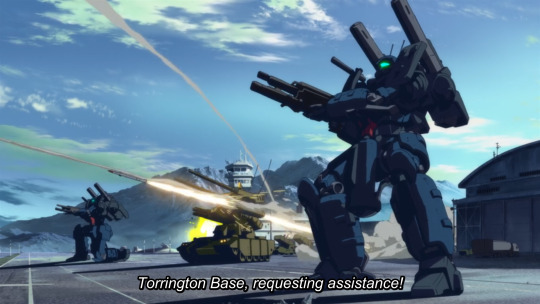
Instead of Dakar, the main conflict in OVA 4 takes place in and around Torrington Base-- a location from the seventh novel. They've essentially moved Loni's arc forward, and combined it with another battle.
I originally assumed this might have been a censorship concern, but a whole bunch of civilian casualties still happen, so... seems more about wanting to get to Torrington faster. I was very surprised when they didn't censor the woman with the baby on the fire escape. I remember reading the novel equivalent and thinking "oh, they're cutting that for sure". Shows what I know.
The novel version of Torrington doesn't have any civilian infrastructure around to damage. It's an extremely remote and backwater location.
Even with the addition of a nearby city, putting the coordinates in Torrington is significantly less callous on Cardeas' part than having them in Dakar. Programming the La+ program so they have to activate the NT-D in the middle of the Federation capital is stupid as shit, assuming your goal isn't to kill a bunch of random noncombatants. Novel Banagher's explanation for why he might have done it is so generous that it just kinda makes me sad.
I'm sorry Banagher, I know you're still traumatized because he exploded, but your dad doesn't give a shit about other people. He prioritizes poetic imagery in his treasure hunt over the lives of human beings. He zapped your brain as a child to check whether you could pilot the robot good. He sucks, Banagher.
The Parliament building as a location does give a much more direct clue to the nature of the Box-- the Federation charter is on the ground floor, and we're told through character dialogue that it's a replica of the original that was destroyed at Laplace.
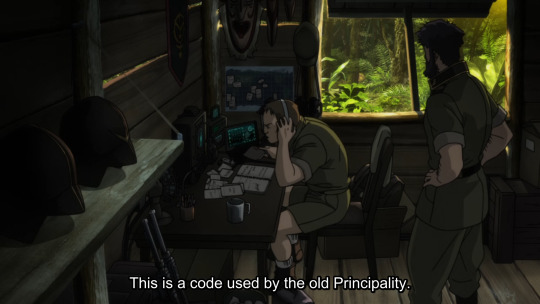
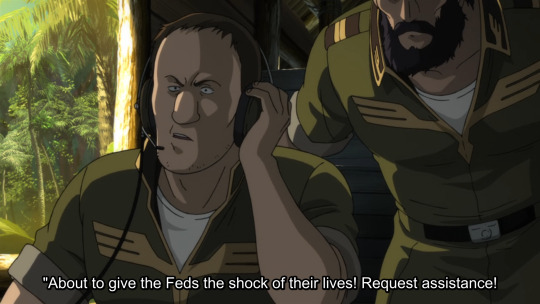
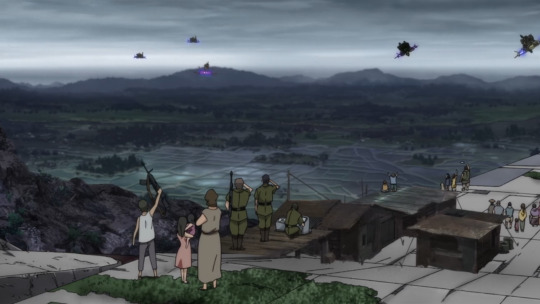
This montage of all the scattered Zeon forces on Earth mobilizing might be my favourite sequence in the film. This is another situation where I wish I could include images for all of it. Don't even get me started on the music in this part. God, it's so sick. Cool fucking robot. (Image of a child holding a rifle flying over my head)
Yonem Kirks was originally a character from novel 7. He had nothing to do with Loni, as she was already dead when he was introduced. He was actually the leader of the group of Zeon remnants who picked up the transmission requesting assistance for the attack on Torrington. He would have been in the place of that nameless beardy guy up there, whose face we never fully get to see. He is eventually killed by Marida in the Banshee.
OVA 4 recasts Kirks as a surrogate father figure for Loni. In the novel, Loni's father is still alive, and he's also one of the main reasons that book six is my least favourite. You'll see.
Loni takes over her father’s original role as a character, but with everything I hated about him stripped out. I think that rules. I initially thought they were going to put Kirks in his role, but what they went with was definitely more interesting.
I'll talk more about Loni at the end of this post, since she's the core of the whole arc. She's a substantially different character in each version. I will also explain exactly what her dad's deal is in the book, and why I do not like it.
Let me get this out of my system first.
The Character Assassination of Riddhe Marcenas
Imagine: an interesting character is rewritten so that everything you liked is either downplayed or removed, and then your least favourite aspect of their personality or story is inflated to become their most important character trait.
This is what experiencing anime Riddhe is like for me.
I feel like I'm being pranked. Literally, the degree to which they are systematically removing all his most interesting and sympathetic qualities is starting to feel like a running gag. It's not just things being cut for time, either; they've changed dialogue and body language in ways that can only be deliberate. Someone clearly decided that changing Riddhe's personality was necessary, and I can't figure out why.
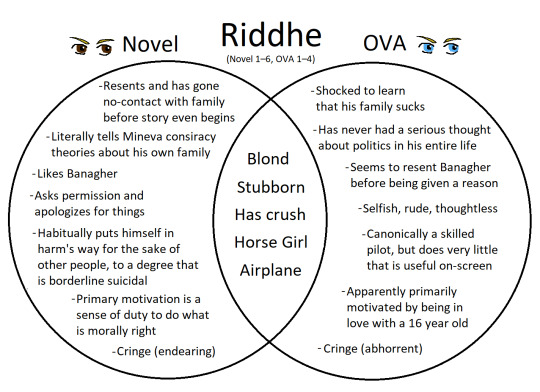
I got mad enough about this to make a diagram. I didn't even realize just how much I apparently liked this guy until they took him away.
Riddhe becoming increasingly closed off, obsessive, and myopic is a significant degeneration, and it happens over a fairly long stretch of plot. It's interesting because we're given time to get used to this guy as a positive force before watching him spiral, and he's clearly still trying to be good even as he self-destructs. That's how it feels for the characters, and that's ideally how it should feel for the audience.
If he's just kind of a self-absorbed dickhead from the start, what's the point? Where's the juice? Where's the drama? Why should we care, on an emotional level, whether or not it's still possible to pull him back from the cliff?
Look, I admit that I was less cartoonishly mad about this on the second watch. I can imagine a more charitable reading of this character than my bitter little hater response. I'm sure the anime version works fine for people who haven't read the novels, or who have but don't care about the original character, or at least don't find the new version as deeply unlikable as I do. But it makes me so crazy.
I'm going to go through his scenes, so you can see exactly what I mean.
Riddhe & Ronan
Riddhe's first scene in the OVA is his conversation with Ronan. This is a scene from the fifth novel-- if you read my post on OVA 3, you may remember my surprise that there was so little of Riddhe and Mineva doing stuff on Earth. Clearly, some of it was pushed foward to be in this one instead. Sure. Fine.
In the novel version of this scene, Riddhe is waiting alone in his father's office. Two other people come by to speak to him before Ronan arrives. I'm fine with these conversations getting cut for time, but I do think they're interesting, so I'm going to go over them.
First is the Butler, Doillon-- the novel's fan translation spells it Dwiyon. Doillon is described as a father figure to Riddhe, and clearly one he feels more positively about than Ronan. Doillon tells Riddhe that he missed him, and asks him not to leave again. He says that he's old and will likely die soon, and he's worried about the family-- Ronan is also getting older, and his health is declining (heart issues).
We also meet Riddhe's older sister, Cynthia, who either doesn't exist in the OVA or is off doing vivacious socialite things elsewhere. She also tries to convince Riddhe to come home. She asks him about Audrey, tells him she's cute, and insists they both come to a party she's hosting later.
There's some discussion of Riddhe's mother, both in narration and dialogue. We're reminded that she's ill (unspecified) and living in a nursing home. It's implied that she might have had some kind of nervous breakdown because of "the political world," but it's unclear whether that means she was a politician herself, or if it was more about her involvement with Ronan.
At this point Ronan comes in, and everyone else gets shooed out.
OVA Riddhe's demeanour around Ronan is... curious? Maybe nervous, and a little dismissive, but trying to act respectful. He's very goofy, rubbernecking and trying eavesdrop on Ronan's phone call. It would be cute, if he didn't piss me off so badly within the next five minutes. Ronan, meanwhile, feels very distant, keeping his back turned away for much of the scene.
The novel relationship is extremely tense and hostile, and a lot of that energy comes from Riddhe. He has to deliberately restrain himself from being aggressive and getting angry during this scene, because he's aware he needs his father's authority if he's going to keep Mineva safe.
Riddhe hates being in his family's house. He does not like his father, and is constantly on edge when he's around. In many scenes, he deliberately avoids even looking at him. When we're told that Riddhe "ran away", the connotations of that are very different from in the OVA, where it sounds like he just left on a fanciful whim.
So the familial relationship is different. Fine. I think it's less interesting, but I can live with it.
Here's where I start getting mad:
Ronan accusing Riddhe of being in love with Mineva and suggesting that this is the reason he brought her to Earth is an anime-only addition.
Obviously, a character in a story believing something doesn't make it an objective fact. The framing, however, implies that Ronan is correct: Riddhe has a dramatic startle reaction, they've failed to establish any other strong motivation, and immediately after this scene he goes and proposes to her.
The scene where Riddhe talks to Mineva is a combination of two different scenes from the novel-- first the hug on the balcony, and later the proposal. The original two scenes have completely different (and incompatible) tones, and they're separated by a good amount of time, as well. There's also another scene between them, with Riddhe riding his horse, so I'll talk a little about that too.
The way these scenes have been combined not only fully re-centres Riddhe's character around being in love with Mineva, but it also makes him way more invasive and pushy. I fucking hate this guy. He sucks! Where's my boy!!!!
The Balcony Scene
The balcony scene takes place during the dinner party held by Riddhe's sister and her husband, after Riddhe has had his conversation with Ronan. The guests are mostly wealthy older women, the wives of important men.
Mineva is cautious and a bit intimidated. She is introduced as Audrey Burne, and stated to be the daughter of one of Ronan's connections. Riddhe is obviously sulking, refusing to speak to the point where he won't even respond to direct questions and his sister has to carry the conversation for him.
The guests begin gossiping about the recent terrorist attack on Industrial 7. The way they discuss the deaths is not particularly respectful. They talk about Zeon and spacenoids in general almost as if they're inhuman aliens. Cynthia tries to steer the conversation elsewhere. Mineva is horribly uncomfortable.
Riddhe stands up and leaves the table without saying anything. Mineva isn't able to find a good opportunity to leave and go look for him until 10 minutes later. She eventually finds him on the balcony facing the courtyard.
“I’m sorry” the voice entered her ears, and she looked forward, staring right at Riddhe’s back as he still looked forward. She lowered her face and said, “There’s no need for you to apologize...”
“I feel that this is reality too. If I continue to remain in Neo Zeon, I wouldn’t know all of these things.”
This might be a good chance to learn. Mineva muttered in her depressed heart, but she could not find any words to overcome these words that were full of such prejudice. She thought that mutual understanding was just a dream, and she remained unable to breathe in this helplessness of hers. “That’s not it.” Riddhe said as his shoulders trembled, and he clenched his hands that were on the handrails tightly.
“That’s not what I want to talk about…”
... [His shoulders trembled,] probably because he was crying. That was not an emotion that could be caused by a breakdown in talks between him and Ronan, and Mineva sensed that there was a greater despair and sense of loss here, “Riddhe…” she called him, and approached his trembling figure.
Suddenly, that back profile left the handrails, and Riddhe turned to Mineva, his chest filling her sights. Mineva was hugged around the shoulders as she was pulled to him, and he embraced her in his clutches.
“I’m sorry, I…I actually brought you to such a unthinkable place…!”
...
“No matter what, I’ll protect you well no matter what, so please stay here, stay by me…don’t leave me alone…”
Water droplets that had warmth dripped on her hair, wetting her forehead. Why is he crying? What’s causing him so much pain? At that moment, Mineva had no sense of uneasiness or disgust as she felt Riddhe’s trembling body with her own. She hesitated over whether she should put her arms around him, and she looked at the sky that was entering the night from past the shoulders wearing the military uniform.
It's just... a completely different scene, with a completely different context.
Look at the description of that hug! Is that the impression you got from the hug in the anime, that Mineva felt at ease? The only person whose feelings we can tell for certain in that scene is Riddhe, and Mineva seems uncomfortable and unhappy both before and after the conversation.
The scene ends here. We get a continuation much later, as the final scene of the novel.
Mineva is alone in her room, several hours after the conversation on the balcony. We're told that Riddhe ran away from the house immediately afterward, without looking at her or explaining what had him so upset. She wonders what he's doing now, then wonders what she's doing. She feels helpless and lost, and rather unlike herself. In the past, she has always been very decisive. These confused, conflicted feelings are strange and unfamiliar to her.
When she looks up at the sky and asks Banagher what she should do, one of the stars is implied to be the Unicorn falling through the atmosphere. I think that imagery is really lovely.
Riddhe Horsegirl Moments
A couple days later, Mineva watches from a distance as Riddhe rides his horse. She is impressed by how in sync they are and how much trust there must be between them, but she also thinks that the horse is clearly picking up on Riddhe's anger and seems anxious.
(Right before this scene, when Ronan is watching Riddhe out the window, we're told that Riddhe deliberately learned a second, different riding style than the one popular with upper-class people that he was originally taught, because he thought it was boring. lol)
Cynthia comes out onto the terrace to talk to Mineva. They talk about Riddhe, and Cynthia describes her perception of his personality. The fan translation is kind of garbled here, but I'll include the passage anyway:
Cynthia looked down at Riddhe that was riding on the horse, “He’s really a useless child.” She sighed as she mused, and Mineva did not feel comfortable hearing this.
“He’s always been like this in the past, always unable to hide what he was thinking, and never cared about the people around him when he put his mind to him. He’s already everywhere at once, but he’s attracted to small details for some reason, so he’ll always bear everything by himself alone.”
This is really a rather accurate correct analysis. Mineva felt impressed that Riddhe’s relative was able to see through him so thoroughly, but felt a little depressed as she thought about how she had not been talking to Riddhe during this while...
Jp text for the list of traits:
「昔からそう。一途で、隠し事ができなくて、思い込んだら脇目も振らずに突っ走っちゃう。そのくせ、変に気が回るもんだから、ひとりでいろいろ抱え込んじゃうのよね」
Possible alt translation (I have no expertise, take with salt just as you would the other):
"It's always been that way. He's single-minded, can't hide anything, and when he makes up his mind, he rushes forward without looking the other way. Despite that, he's strangely anxious, so he takes on a lot of things by himself."
We're then told exactly how long Mineva has been staying at the Marcenas residence (3 days), and what the atmosphere has been like in the house. Riddhe is barely around, apparently busy repairing the Delta Plus. Ronan and Cynthia's husband Patrick avoid Mineva entirely. Cynthia and Doillon are the only people she has to spend time with, and neither of them is aware of her true identity.
Cynthia assures Mineva that Riddhe will probably get over whatever is bothering him soon enough and be back to his old self, but Mineva feels an ominous certainty that she's wrong.
My impression of novel Mineva is that she generally likes Riddhe and enjoys his company. She worries about him, and feels lonely when he starts becoming increasingly distant and angry. She doesn't like that she can see him changing, and she can tell that he's hurting. It's upsetting to her! She had just gotten to know this guy, and suddenly he's acting like a stranger again.
I have a hard time believing that OVA Mineva has enjoyed being in the same room with Riddhe at any point. She seems pragmatic and politely disinterested at best. Her body language with people she clearly likes-- Banagher, or hell, even the guy in the diner-- is very different.
The Most Depressing Proposal in the World
The dialogue of the proposal itself and Mineva's rejection is basically the same. Everything else about Riddhe's behaviour and body language is completely different.
They even completely inverted the exchange when he opens the door! In the novel, Riddhe asks if he can come in, and Mineva replies "this is your house, isn't it," but in the anime, he opens the door without asking and she's upset about the presumption.
It's such a small thing, but it's a clear signal to me that these changes are purposeful. They had zero reason to do that, unless they want to change the audience's perception of Riddhe and his relationship to Mineva. This suggests to me that they're not failing to adapt the novel character, but intentionally replacing him with something different. But... why? To what end?
This scene happens right after we learn that Riddhe is being sent to serve under Bright on the Ra Cailum. The context of the proposal is him telling her he's leaving.
Mineva has been in the house for at least ten days at this point. She has been feeling increasingly anxious and constrained, and by now she feels a strong desire to leave.
Riddhe is very distant and stiff. He tells her he's leaving, and apologizes. This is when he finally tells her about his conversation with Ronan, how the Marcenas family and the Vist Foundation "are like two mirrors facing each other," and that his family likely intends to use her as a hostage.
Then we get the proposal. It's so vaguely delivered that Mineva literally does not understand what he's asking at first. Not only does he not hug her, he's not even looking at her. He has a weird little twitch when bringing up his dad. The whole thing is miserable and kind of pathetic.
“So... can you become a member of our family?”
In contrast, Riddhe said this without turning around to look. Mineva did not understand what he was saying to her as she frowned.
“How about you abandon Zeon and the Zabi family, and become a member of the Marcenas family? In that case, my dad will—”
To Riddhe, the last words were probably something he did not expect. His eyelids twitched, and he seemed to recover as he went quiet and lowered his eyes that were once facing Mineva.
“…Even if it’s just a formality, this meaningless war will end like that, and you’ll be free.”
“Do you feel…that can be considered freedom?”
Mineva too lowered her sights, her heart feeling the sand-like bitterness. These words sounded too tragic to both the speaker and the listener, and even though they were just a few connected words, she could understand that her body and mind were gradually being contaminated. Something very important was starting to fall off, unable to be retrieved again—this kind of disappointment spread in her heart.
I'm sure Riddhe does think a marriage would reduce the danger she's in, but this is still a selfish question. He probably even knows it. It's just not the same kind of selfish as if he had barged into her room uninvited and proposed immediately during a fit of emotion because he's apparently madly in love with her, good grief.
Not even Riddhe wants to be "a member of his family." He had refused to speak to them for three years, well before he had the family secret dropped on him. But we're supposed to believe he thinks pulling Mineva into that is a good idea? Please. He is horrified by the idea of being alone with them.
He wants Mineva to stay because she's the only outside person he has left to hold onto, because he cut off all his other established positive relationships when he helped her escape.
Personally, I think that kind of total alienation is a lot more psychologically interesting than just being freshly upset and smitten with her!
Even though he knew how many risks he was taking, I think Riddhe was still telling himself he'd be able to wriggle out of it eventually. He'd use his dad's authority to secure Mineva's safety, and then he'd wait for another chance to run away and be a pilot again later.
Being told about the Box was the nail in the coffin for that, because it gave him a new, permanent sense of obligation to re-affiliate with his family, to "take responsibility for their sins." Perceived moral obligation is Riddhe's kryptonite.
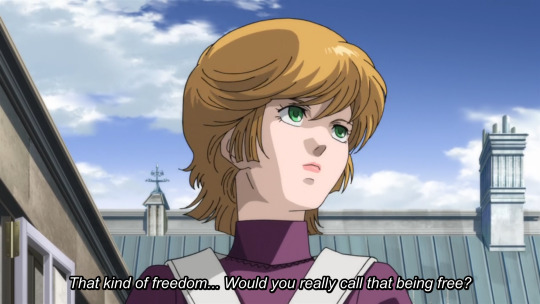
The anime cut the conversation here, right after the rejection. Do you want to know what Riddhe's next line of dialogue is?
“Sorry, forget what I just said.”
lol. lmao even.
Like the anime, this conversation is the catalyst for Mineva running away. The scene in the diner is from Novel 7, as is Martha demanding Ronan give her Mineva. It all happens after Riddhe leaves.
The Ra Cailum
The Tri-Stars are not happy to have Riddhe on their ship.
When Riddhe first approaches the Ra Cailum in the Delta Plus and attempts to board, they actively antagonize him in their own mobile suits: they physically get in his way, don't respond to his hails, and one of them even fires on him.
Riddhe pulls off a dramatic maneuver to get past them, and this impresses them enough for the squad leader to say "alright, you've convinced me that you're more than just a useless nepotism hire."
They did not have authorization to do this. All four of them get dragged into Bright's office immediately after getting out of their suits. The Tri-Stars lie about what happened to avoid further trouble, and Riddhe goes along with the cover story. Bright orders the Tri-Stars to go clean the deck, and they leave.
The incident confirmed in Riddhe's mind that he's being given special treatment, so he brings it up to Bright:
The reason why the Tri-Stars would pull such petty tricks on him was because news of him being given special treatment was spread through the ship. He was already mentally prepared about being viewed as an irritant, but he could not stand being treated as a troublesome VIP and being unable to do anything. He stared at the back that had no intent of looking back at him and continued to emphasize with a restrained tone.
“I’ve been through battle before. Please don’t remove me from dangerous missions just because I have to keep watch—”
“DON’T BE NAÏVE!”
Bright turned around to let out a roar that pierced through the pilot suit, causing goosebumps on Riddhe’s skin.
This conversation hits different when the "dangerous" situations Riddhe keeps putting himself in are on the extreme end even for a military pilot.
Novel Riddhe's disregard for his own safety is remarkable. I talked about it some in the last post, but after the conversation with his dad it takes on a more desperate tone. There is something very clearly wrong with this guy, and every time other people die around him it gets a little worse.
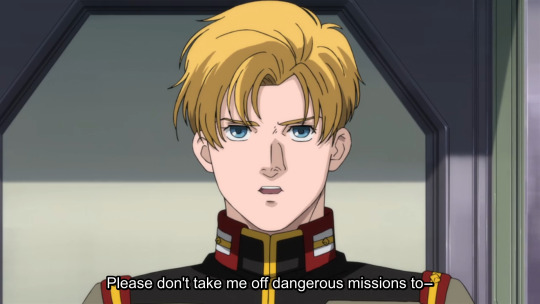
When I call Riddhe "borderline suicidal," I'm not saying he's consciously trying to kill himself, to be clear. He's not trying to get shot down on purpose-- quite the opposite.
I have no intention of dying. Right now, I don’t have a reason for that, before I can redeem the crimes of this cursed bloodline of mine— he muttered in his frozen heart, “Yes”, answered, and saluted.
The reckless death drive and the belief he has an obligation to stay alive can coexist without coming into conflict because they're ultimately coming from the same place and serving the same goal. He needs to keep existing in order to protect other people, and he needs to protect other people in order to justify having ever existed in the first place.
Or, basically: if you die, you only get to sacrifice yourself once, but so long as you survive you can keep doing it forever.
(And of course, what he thinks in the abstract while safely tucked away in an office is also different from how he behaves in actual combat, when people around him are dying.)
You'll get new examples when I get to what Riddhe does during the battle of Dakar. For now, we'll finish up the conversation with Bright.
Bright tells Riddhe to come back alive in both versions, but in the novel he also tells him to go clean the deck with the Tri-Stars if he wants to be treated like a normal pilot.
Nigel, the leader of the Tri-Stars, is waiting outside the door when Riddhe leaves Bright's office. Riddhe sighs and tells him he's going to help clean the deck. Nigel tells him he's too rigid, and he's going to end up wasting his talent. He doesn't let up even when Riddhe tries to be deferential:
... Riddhe instinctively looked away and said, “I won’t cause trouble for you.” ... but Nigel moved away from the wall and spoke,
“You’re a rookie who doesn’t even know the meaning of the word team? Well, us Tri-Stars do whatever we want, and there’s no need for us to give you suggestions, but I’ll shoot you down from behind if you dare to pull the Ra Cailum fleet down. You better remember that.”
The equivalent to this line in the OVA seems a lot friendlier and more like banter. I think he's being truthful here, or at the very least genuinely trying to intimidate Riddhe.
Riddhe realizes Nigel still doesn't trust him and is continuing to treat him like an outsider. He thinks that maybe it's for the best, and responds with sarcastic praise.
Then we get this truly astounding line which I'm almost certain is a translation error, but I need you to see it anyway:
“Your sarcasm ain’t half bad there. Are you saying that us idiots who only know how to train are having a group orgy or something?”
Well I wasn't thinking it before but I'm certainly thinking it now. Why are you being so unwelcoming and excluding Riddhe from the group orgy, Nigel?
(The Japanese is "おれたちは訓練バカの仲良しグループってわけか?", if you want to check it yourself. Unless I'm missing some contextual innuendo, I'm pretty sure there is no reference to an orgy here. The phrase that got turned into that means "a group of close friends." He's basically saying "You think we aren't real soldiers and this is just a social club?"
I'm so disappointed. I wish this one was real. I was hoping to at least find a common crude idiom, like how people use "circlejerk" in English.)
Ahem.
Riddhe's attempt to be aloof fails; he immediately admits he's feeling envious and wants to feel included in the group. Nigel is clearly surprised by this, and seeds are planted for the Tri-Stars to come around.
This is important because when the attack on Dakar begins, Riddhe is initially told he isn't allowed to launch because he doesn't belong to any existing squadron. He's eventually given permission to launch with the Tri-Stars, after Nigel vouches for him.
Riddhe and Banagher vs. The Shamblo
The OVA actually reverses Riddhe and Banagher's respective roles here. Novel Riddhe engages the Shamblo well before Banagher is even on the field.
As the Ra Cailum approaches Dakar, they get a clearer picture of the situation. Bright realizes things are worse than they thought, and they need to rethink their approach.
Riddhe requests to be sent ahead on his own, to distract the enemy while the main forces land. He manages to make a convincing argument as to how he can do this without being shot down, and Nigel vouches for him again, so Bright agrees to let him scout ahead.
Riddhe launches on his own, without the Tri-Stars. He thinks about Mihiro and the Argama crew briefly while talking to the communications operator, which is sweet.
As Riddhe approaches the Shamblo, he realizes there are still civilians nearby who haven't finished evacuating. He also spots a GM III, part of Dakar's security forces, and watches it fire missiles even though the pilot should have been able to see the people on the street. Riddhe is furious.
The “GM III” continued to fire its beam rifle wildly at the road covered with dust and smoke. Riddhe grabbed the arm of the [mobile suit] and pulled it to the blind spot of the collapsed department store. (Khairul was killed…!) as the pilot continued to ramble on, “WHAT ARE YOU DOING!?” Riddhe used the communication channel to yell out at him,
“Why are you using missiles at such a place!? There’re still people in the city!)
(But we can’t let that guy approach the parliament hall…)
“For the sake of your pride, you…!”
But then the Shamblo does its laser bits thing, so the GM ends up exploding. A lot of mobile suits nearby explode, in fact (RIP Guntank squad), and fleeing civilians get crushed quite gruesomely.
This is the point where Riddhe's death wish instinct activates, and "scouting" turns into "I need to engage the enemy and tank aggro right now."
“There’s no reason for them to die because of such a thing…!”
If this is a tragedy caused by the “Box”. Riddhe let the machine transform, duck low, charge forward and squeezed the trigger of the beam rifle to its maximum. The beams that were deflected by the bits ripped apart the dust, grazing past the head of the “Delta Plus”. The machine then stood on the road in front of several blocks and started firing again. “Get over here!!!” he did not care that the reflected beams grazed past his shields as he let the “Delta Plus” leap up again.
“I won’t let you kill anyone else. Just make me the only victim of the “Box”…!”
The beam rifle continued to let out shots, and the beams that were reflected back in less than a second shook the machine. Riddhe continued to launch his attacks fervently as he forced the machine to retreat back to the coast. Anyway, I have to let the mobile armor retreat [from] the city and buy time for the civilians to evacuate. How long can I last? His mind that was thinking about this could not work at all, and the “Delta Plus” continued to shoot in a suicidal manner as it danced around the skies above Dakar.
Banagher sees and recognizes the Delta Plus on the monitor just before his fight with Zinnerman. His scenes are intercut with Riddhe and Loni's perspective on the battlefield.
Loni-- a very different character from her OVA counterpart-- keeps picking up on Riddhe's thoughts during combat. She attempts to convince her father that they should change course to avoid the civilians, but he refuses.
Riddhe helps a GM pilot in a damaged suit and tries to convince them to retreat, but they aren't having it. They tell him they're going to get under the Shamblo's feet, and they want him to shoot their suit so it will explode.
Obviously it's normal to feel fucked up about that kind of request, but it's still darkly funny to me how freaked out Riddhe gets, given his behaviour during this entire battle. Self sacrifice... not Riddhe? Death of friendly pilot not Riddhe??? No! No!!! Unacceptable!!!!
It's not Riddhe's choice to make, though. The GM rushes the Shamblo, where it is promptly torn apart and trampled. Riddhe manages to break through his hesitation and fires, but the Shamblo blocks the beam.
Then it fucking gets him. If you remember what I said about the OVA reversing the roles, the bit where the Unicorn gets grabbed by the claws happens to the Delta Plus instead.
The back of the “Delta Plus” was slammed hard onto the road, and the machine was half buried in the cracked asphalt. The large claws grabbed the lower half of the machine to restrain it, while the other claw rose slowly over the head of the “Delta Plus”, showing its malice that it was trying to dice it up as it opened its sharp blades. Riddhe sensed that his body was going to be crushed by this impact and scattered apart as he gritted his bloodied teeth.
Is this the end? I can’t do anything, I’ll die here without being able to save anyone. As Riddhe’s concussed mind eked out these thoughts, How annoying, he muttered in his heart...
So then instead of Riddhe breaking off from the Tri-Stars to help Banagher, we get Banagher finally arriving on the scene and swooping in to save Riddhe from getting pureed.
They team up. The Unicorn isn't as manoeuvrable under Earth's gravity and atmospheric conditions as it is in space, so the Delta Plus basically becomes its flight unit.
Banagher is the one who fires the shot and destroys the Shamblo. He's very upset about Loni's death, but there's no moral dilemma or conflict between him and Riddhe.
Loni's situation is very different. She was probably already going to die whether they destroyed the Shamblo or not, and since it had multiple pilots, her death alone would not have stopped its rampage. I'll go over this again in more detail during her section. For now, the point I'm trying to make is that the novel version of this scene emphasizes that Riddhe and Banagher have a positive relationship.
I really get along with this guy instinctively. Riddhe hid this bittersweet reality inside his heart as he went full throttle and let the machine remain as low as possible.
[...]
The thrill when they were accelerating for each other as they raced caused all his senses to sharpen. If only I can remain at that moment of ecstasy.
The OVA scene is about... the opposite of that.
I still can't believe OVA Riddhe looks angry when Banagher's plan works and the Shamblo stops attacking the first time. He fucking scowls? Are you mad you're being proven wrong? That's more important to you in this situation than preventing more deaths? Distinctly un-Riddhelike priorities!
With the Shamblo gone, Riddhe is ordered to capture the Gundam.
The conversation they have about this is significantly longer. There's a lot of Riddhe failing to talk himself into killing Banagher after he refuses to surrender.
He's extremely torn up about it. Because Riddhe likes Banagher.
The metals bellowed as they touched each other, and the voice of the pilot rang within the interaction window. The “Unicorn Gundam” was touching the “Delta Plus” on the shoulder as it opened the communication circuit. ...
(I never thought that I would meet you here in such a way…is Audrey alright? Did you make contact with the “Nahel Argama”—)
Banagher intended to lean the body forward as he talked. However, Riddhe did not look at the other party’s face. He held his breath and fulfilled what he had to do at this point.
The “Delta Plus” shook aside the hand resting on its shoulder ... The “Gundam” tripped, and by the time it managed to steady itself with the AMBAC, the “Delta Plus” was aiming its beam rifle at the abdomen.
(Mr Riddhe…!?)
“I’ve received an order to capture that “Gundam”. Get off that cockpit, Banagher.”
Luckily, the visuals on the communication window were cut off the moment the interaction channel was removed. (Mr Riddhe, why…!) Riddhe merely let Banaher’s outcry chide his ears as his hand holding onto the control stick was trembling.
“Don’t call me as if we’re close with each other. Without you, things wouldn’t end up like that…!”
(Why’s that so? Mr Riddhe, Audrey—)
“You and the “Gundam” are obstacles preventing this Audrey you speak of—Mineva from living peacefully. Get off!”
My chest is going to break open. At this rate, I’ll go crazy too—just like this mobile armor that lies dead in front of me. Riddhe lowered his eyes and waited for Banagher to answer in a prayer. I feel you’re a man of your word. I’ll leave Audrey to you. The boy with such strong-willed eyes actually used those words to lay a curse on him and bind him, and though he hoped that the other party would step aside after realizing what was going on—
The things he says about Mineva here are interesting. I think it's very representative of the kind of weird rigid thinking Riddhe has, that even as he tries to talk himself into literally killing Banagher, he still considers the promise to take care of Audrey binding and unassailable.
It's also kind of fascinating that he considers protecting her to be something that he owes to Banagher specifically at all, enough to apparently consider it a burden, given that he had already taken action to do it himself before they ever had that conversation.
Even though he's stubborn and historically disobedient to authority figures like his father, Riddhe is still very... rules-brained, I guess, in his own way. He gets "stuck" on specific things people say to him like this a lot, particularly in the context of morality or a sense of duty.
Banagher won't get out of the Gundam, even at gunpoint. He doesn't understand why Riddhe is acting the way he is, and he wants an explanation.
And here's the important part:
When Banagher calls Riddhe's bluff and Riddhe cannot bring himself to shoot him, Riddhe tells Banangher to flee before anyone else can arrive to capture him.
Yes! He actively decides to disobey orders and let Banagher escape! That's the moment that the 'Black Unicorn' drops in on them! It has to show up for the plot to work, because Riddhe has already backed down as a threat!!!
And Riddhe's still focused on Banagher, even after the Banshee drops a bunch of rubble on his mobile suit. He's stuck there in his unresponsive machine, yelling at Banagher to run away.
There is hostility between Banagher and Riddhe during the Torrington fight in book 7, but the equivalent of that confrontation is presumably something for next time... there are still like, three more emotional bombshells that need to be dropped on Riddhe before he stops instinctively treating Banagher like an ally.
Do you see how, cumulatively, this might as well be a completely different guy?
I've been trying to avoid spoiling anything that happens later in the novels as much as possible, even though I assume most people reading these posts have either already seen the full anime or don't care about spoilers at all. But I simply must say. Holy shit. You're going to have this guy kill a fan favourite character? This guy? Worse Riddhe? I'm wincing just thinking about how apocalyptically fucking mad people must have been. I am imagining the forum posts in my mind's eye, and they're bad.
As much as I love complaining, I do think changes made in any adaptation deserve to be considered in their own right. Even if I don't like them. I've been thinking a lot about what these changes might mean, and what purpose they might serve.
Some possible narrative reasons for Worse Riddhe I came up with:
They needed him to kill this version of Loni in place of Banahger -- I think regular Riddhe would also be willing to kill Loni, once it became obvious that Banagher's plan had failed the first time. She's an enemy combatant who is deliberately killing civilians, and she's either unwilling or unable to stop.
To justify Mineva running away sooner -- as in, they thought if he was too likeable, the audience wouldn't understand why she wanted to leave.
This wouldn't be a problem in the first place if they hadn't pushed his scenes forward so they had to happen all at once. Either way, Mineva would have many good reasons to want to leave without Worse Riddhe. Riddhe is only person she really has in her corner-- and then he tells her she's in an unsafe place, and then he leaves.
They were worried he might overshadow Banagher…? I don't think reducing Riddhe's role in on-screen combat would necessitate changing his personality. Also, this is just not something I personally give a shit about. Multiple important characters is not a problem. Banagher would absolutely still get to be cool and heroic. C'mon.
They think the new characterization is likeable / endearing, and the audience is supposed to find the increased focus on unrequited romantic interest in Mineva sympathetic-- [perplexed vocalization]
They think if Riddhe is more naive and jealous from the beginning, bringing him around will be more meaningful, from the angle of "Look, even this guy can be reached through the power of communication and not giving up on a possibility" -- Oo-hoo-oooh, I don't like how plausible this one feels. I can see the exact reasoning that might lead to it. I don't like it.
They're going to do something totally new with him later that never would have occurred to me -- I guess that could save it for me as an artistic decision, if it's interesting enough. Bit of a scary thought, though. What's up your sleeve?
If anyone else has theories or opinions about the rationale here, I'm all ears. I'd love to come up with something good enough to feel even 25% less annoyed about it.
Anyway, we've covered all my Riddhe grievances. Let's move on.
Frontal and Angelo are barely in this one, which is novel accurate.
They get their own section anyway, because they're always important to ME!!!
I get so excited every time Frontal shows up, regardless of context. The Sinanju theme starts playing and I'm already having the time of my life. He's literally just standing there and giving exposition. Embarrassing.
I love how visibly mad Angelo gets every time Zinnerman talks back to Frontal. He's hysterical.
Here's novel Loni experiencing Frontal's uncanny deepfake vibes:
The masked face spoke on the monitor, and Loni did not feel that it was the face of a human. The nose bridge and the lips under the mask were too refined, and the thick blond hair reminded her of a puppet. Am I seeing a complete artificial image here? she felt some goosebumps as she stared at Full Frontal, who was calmly smiling.
Banagher and Zinnerman

Banagher and Zinnerman's relationship is probably the one major story element that changed the least from the page to screen. I'm really glad that's the case. Their scenes together were some of the most enjoyable parts of the book.
There are still slight differences, as is inevitable.
Zinnerman is softer on Banagher in the anime. I think they probably did this just to make it even more shocking when he starts slamming him around and pointing a gun at him later. Novel Zinnerman is a bit more roundabout with how he expresses affection, and also more aggressive.
Zinnerman doesn't hit Banagher in the anime at all until their big fight, but in the novels he does it a number of times. He hits him twice when he's sitting around catatonic at the crash site, and that wasn't even the first time in the series (the first was all the way back on Palau, because Banagher was mouthing off when they drop him off to stay with Gilboa).
They have a confrontation before they head out into the desert, and it's a precursor to the conversation they have while traveling. The two conversations are about the exact same subjects, with the second mostly being a gentler reiteration, so I can see why they'd only keep one. The anime also shifts some of the aggressive energy from Zinnerman to Flaste, instead, by having him yell at Banagher and throw him around.
The scene that's only in the novel, is... scarier, for lack of a better word? Banagher starts out even more dramatically unresponsive and defeated, he ends up getting angrier, and Zinnerman is a lot more threatening.
On Banagher's condition at the crash site:
... he had no sense of will to live on by himself, and he would not ingest food if it was not prepared. If he was left alone, he would just sit around blankly for the entire day. ...
There were no effects no matter what they did, whether they tried to threaten him or please him; he would not resist, but he would not show any form of will on his own. ...
On Banagher's internal mental state:
You killed him. You killed Gilboa, Tikva’s father. He had no intention of attacking, and you simply shot him. Tikva’s pitiful for not having a father now. You and him have no fathers. You killed him, and you killed a lot a people—
[...]
We can just run through this desert, Banagher thought. The sunlight can burn the skin, blood my head, dry up all the fluids in my body, and I’ll just become dust. Even the lead in my stomach and this cursed family blood of mine will be burnt to nothing. If I can do that, the “Unicorn” will never move again, the “Gundam” won’t awaken again; I won’t have to kill others, I won’t be killed, and the “Laplace Box” will be sealed forever—
And then what? The abnormally cold voice interrupted to end the delusions. The impulse that rose in Banagher’s body quickly wilted as fatigue struck his mind. He found it difficult to think, curled back his body without doing anything and became a stone block like before.
Banagher's despair is also where the title of both the novel and the OVA comes from.
This place is really the bottom of a gravity well, Banagher admitted. His body and mind were tied to the bottom, so heavy that they were unable to move at all. Space felt so distant, and his soul was the only thing melting from his crouched body that was like dust. This is a one and only cog that can make decisions on its own. Don’t lose it—Mr Daguza did say it. I don’t want to lose it, I lost it unwillingly, but I really can’t hang on now. If I try to put it on, my body will break apart. I just want to sit here without thinking and without asking for anything. I’ll keep sitting until my heart melts completely…
And then Zinnerman comes in, and tells him him they're going on a trip. Sorry, you're getting a big chunk of excerpts here, because I really like this entire conversation.
Zinnerman was standing there. His hulking figure was standing there angrily “Stand up.” as he growled with a deep voice. Banagher immediately lost interest in the person who arrived, and immediately lowered his sight.
“There’s a town 60km away. I’m going to walk there and get help, and you’re coming with me.”
Are you kidding me? a slight electrical flow passed through Banagher’s mind as he lifted his eyes again. He saw the bearded face that was not smiling, and lazily looked down again. At this moment, Zinnerman’s hand grabbed him by the torso, and the body, which had its center of gravity at the back, was immediately dragged off the floor.
“How long are you going to mope around here!?” The angry words roared into Banagher’s ears as the sand fell from his limp swaying body. His feet would not listen as his body was supported by hand grabbing him by the chest. However, Zinnerman’s hand that was holding this weight showed no signs of shaking at all.
“We’ll leave after sunset. Get into the ship immediately. We need to prepare a lot of things if we want to pass through the desert.”
[...]
“Duty? I did my duty. I rode on the mobile suit and sank a Neo Zeon terrorist. Is that not enough? How many more must I kill?”
Only this time did Banagher look right at Zinnerman in the eyes and spoke directly to him. What duty and responsibility? It ended up like this after I listened to those words. As he thought about how he would not be fooled again and intended to stand on his feet, a blunt sound rang in his mind as his world exploded.
The body that was punched aside landed hard onto the floor, and the burning hot taste of sand spread in his mouth. The face that was buried in the sand started to ache, and Banagher’s body was trembling as he heard Zinnerman say, “You can deny us all you want.”
“But don’t you dare think of yourself as a victim and throw a tantrum at me. I can still recognize it if the one that shot down Gilboa is a pilot, but not a brat who doesn’t have any resolve.”
[...]
The lead in Banagher’s stomach was burning, and he forcefully spat the sand that became dirt in his [mouth.] “I didn’t do this on my own will…” he muttered as he wiped away the blood on the corner of his mouth.
“Someone else forced me to ride on a mobile suit, and things ended up like this before I even knew what happened. If you’re not going to forgive me, just kill me. Don’t beat around the bush and talk about something like duty; can’t you just harden your heart and kill me…!?”
Zinnerman’s hard fist was still clenched as he answered with his trembling eyelids. See, this man talks big, but he’s no different from those guys who want the “Box”. Banagher said, “You don’t dare to do so anyway.” Banagher said with his busted lips that were curled up.
“If I die, the “Unicorn” won’t move. If you can’t extract the data of the “Box”, you’ll just let this treasure rot. No matter how you hate me, it’s impossible for you to kill—”
The second impact struck his face, ... “[Those] big shots may think that way, but we’re different”, Zinnerman growled, ...
“It doesn’t matter what happens to the “Box”. My ship doesn’t have the room to feed someone like you who has no will to live.”
The burly figure became a shadow as it moved towards Banagher, blocking his sights. The eyes of a killer were glittering somehow deep within, just like the first time, and Banagher clenched his hands together with the sand.
Banagher stared at the two black eyeballs that were not showing any light, and exerted strength to stiffen his trembling knees. He tried his best to let his trembling body stand up, and glared at Zinnerman with all his strength. Do it if you can. I’ll spit my blood on you once I’m beaten down. As he was driven by this unknown temper, his swaying body was about to straighten, and Zinnerman showed some teeth on his ominous looking face.
Before he could understand that it was a smile, he was gently nudged back and landed on his backside. “What kind of expression is that?” Zinnerman gave a wry look, and this was an unexpected response to Banagher as he looked back.
“Someone who can give that kind of expression will not collapse that easily. Hurry up and get ready. The desert won’t listen to any excuses humans make.”
Zinnerman finished and walked away. Are you serious? Banagher wanted to open his mouth and ask, but was unable to let out a sound as his wildly pounding heart spread the feeling of this fear that came a moment later. His body that was unneeded by anyone and self-neglected continued to give the sound of life stubbornly— “Damn it!” Banagher groaned as he kicked the sand at his feet. The blood that rushed up his body caused him to recall the heat, and the large amount of sweat that suddenly started to flow out evaporated before they dripped.
I really love this scene, and I miss furious blood-spitting Banagher, but I also liked the little sand-throwing tantrum they added to the conversation in the anime, so I can't complain too much. Other than that, the argument in the desert is basically the same.
Then we get the story about Globe. This is another scene where the music really stood out to me -- the track is called "Desert," and I think it's beautiful.
I like how they take advantage of the desert setting to show it to you visually in the form of Banagher seeing mirages, as well the hot wind in the desert evoking the heat from the burning town. It's a clever sequence.
I'll be coming back to Globe in a later section. The story and its telling has been altered in significant ways, although it serves the exact same purpose in the narrative for Zinnerman's motivation. Put a pin in it.
The conversation at the campsite is pretty much exactly the same in both versions, except the novel also describes ancient cave paintings on the stone walls they're using for shelter.
The novel has one more travel scene after this, where they get caught in a simoom and have a harrowing near-death experience. This is where Banagher really thinks through his feelings and resolves that he needs to live. As soon as the storm passes, they realize they're right outside their destination and start laughing hysterically from relief.
The novel also has several scenes where the two of them spend time with Loni in the city, scouting Dakar on foot before the operation. These are mostly about establishing setting, progressing the plot, and strengthening Banagher's connection to Loni, though there are some small Zinnerman moments I thought were charming.
Here's Zinnerman buying Banagher a beer:
Zinnerman suddenly raised his hand and called the waitress beside him. “Another beer please. For him.” He said with a nonchalant look on his face as he pointed at Banagher, wanting him to continue talking. “I’m still underaged, you know!?” Banagher then gave a shocked expression right back as his momentum was worn out.
“Just drink. Today’s a special day.”
“What’s special…”
“You’ve become an adult. There’s no punishment for celebrating a little anyway.”
A warm smile Banagher had never seen before caused him to feel some warmth in his stomach. He felt embarrassed, and thought that he could not look back anymore as he turned his stare to the sea surface that was dyed sunset.
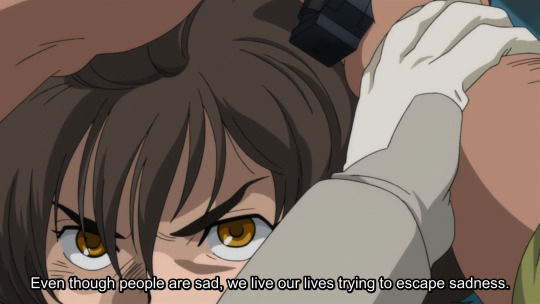

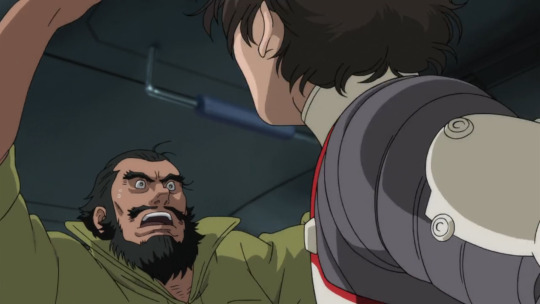
The fight they have during the operation plays out pretty much the same, in both action and dialogue. Zinnerman does cause less lasting visible damage to Banagher in the OVA, though-- he's described as having his face noticeably bruised and banged up in the novel.
I do think novel Banagher knew civilian casualties were a possibility going in (in a way that OVA Banagher possibly did not consider at all, since the target is explicitly military). What horrified him was the deliberate act of murdering innocent people-- similar to novel Loni's feelings, in fact.
Even if he's rationalizing, Zinnerman's response of "you should have expected this" is still much truer about Dakar than Torrington. Come on, Banagher, you didn't consider there might be serious collateral damage if we walk the giant metal laser monster into a major metropolitan area? You saw what happened to Industrial 7. They could have just as easily destroyed that hotel by accident.
Such a good scene, though. Both versions. Get his ass.
Marida, Martha, and Alberto
There's a lot going on here. I'll start with the easy stuff.

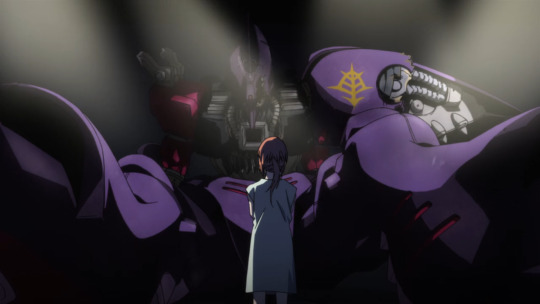

Since Gael was on the Argama at the end of Novel 5, he goes to the bridge and tells them not to let Martha's ship capture the Unicorn. His mission had failed, and Alberto was successfully transferred to Martha's ship with Marida.
Gael warns Banagher through transmission not to trust Alberto and not to follow his instructions. He also tells him explicitly that Alberto killed Cardeas.
Alberto then cuts off Gael's transmission and admits to doing so. He explains his reasons, and then says some fairly cruel things to Banagher. It's clear that this conversation contributed to Banagher's intense despair in the desert; he even quotes Alberto directly at one point.
(The Foundation can’t live on without the Box. But that man intended to bring the “Box” outside.)
...
(The Foundation has the “Box”. As long as this fact doesn’t change, it doesn’t matter even if the “Box” doesn’t exist. The key to opening the “Box” has no reason to exist. As long as we can destroy the “Unicorn”, everything will be back to normal. Don’t you understand? To a lot of people, you’re the seed of disaster.)
...
(If you want to hate, hate father. Hate our father.)
The voice pierced through Banagher’s chest, and then, there was a physical impact that rocked the cockpit. The connected ignition bolt was activated, and the traction wire was severed from the shuttle right from the end.
[...]
Banagher’s vision started to spin in a confusing manner, and the plasma air flow continued to blow by the cockpit. The temperature in the machine gradually rose, and the warning alarms continued to sway amidst the burning hot air. Nobody will save me. There’s no worth in saving me. Everything I know about is wrong. Banagher yelled with a voice that did not make a sound. I shouldn’t be here, I shouldn’t be sitting in this, even my birth onto this Earth is wrong— Banagher’ yell was vaporized by the additional heat, and the color of flames gradually covered everything.
With the line cut, the Garancieres moves in to grab the Unicorn instead. Banagher has passed out, but the Unicorn begins moving entirely on its own. Again it's described as looking like a devil, which is particularly fitting when it's basically fucking on fire. Zinnerman looks at its face and thinks it looks like it's smiling. I love that.
The head of the “Unicorn Gundam” that resembled a human face peeked through the bridge window, and the camera outside the ship was capturing a visual of its glowing eyes.
It was an icy cold stare, and those eyes were staring at Zinnerman and company coldly as if it was grading the people inside the ship—
“Is that thing…moving by itself?”
[...]
Zinnerman did not have time to shout out as his back hit the ceiling, and he tumbled onto the floor. From the corner of his eyes, he saw that the “Gundam” above him was narrowing its eyes in a smile with its back against the plasma glow. The machine with the appearance of a white devil was definitely smiling, and its body was swaying amidst the vortex that swelled like a mirage.
In book five, it's easy to read the passage with Alberto and not be entirely sure whether the tether being cut was the intention from the start, if it was something Martha ordered, etc. In book six we get explicit confirmation that Alberto made a snap decision at that moment to kill Banagher. He has weird guilt-induced visions of a young Banagher while walking around the cyber-Newtype lab.
... Alberto suddenly went quiet as he stopped in his tracks, as he sensed someone moving at the corner leading to the elevator hall.
At a corner of the passage that was somewhat dim because of energy conservation, there was a black shadow popping out from a corner. That shadow moved lightly, forming the shape of a human, and became a shadow of a 4, 5 year old child as it stared right back from the corner. Those familiar eyes looked like they were about to be etched in Alberto’s eyes, and he could not help but look away. Haven’t you had enough already? Alberto thought as he widened his tense eyes with fear. The child who looked eerily similar to Banagher Links suddenly disappeared, and the shadow of the foliage plant placed at the corner was dragged along the floor.
[...]
The white machine fell into the scorching abyss as the traction wire was snapped—he recalled that scene and asked himself whether it was the correct decision. At that time, he merely had the impulse of wanted to get rid of the “Unicorn” from his eyes, and he did not remember making a sane decision. That was because he was scared, and he hated the eyes of the “Unicorn” pilot that were the same as Cardeas—Banagher Links, who was protected by the machine Cardeas put so much effort in making, and who appeared several times in front of him. Those eyes that could overlap his own when he looked into the mirror looked like they would reveal the sins he committed over and over again…
There's a bit more detail given as to the history about the Newtype lab, and why it still exists despite being shuttered. We also learn that it's rumoured to be haunted by the gruesome ghosts of children, who presumably died during experimentation. Alberto is not having a good time, and blames his hallucinations on the rumours.
Now I need to talk about the thorny part:
A lot of the stuff from the novels surrounding Alberto, Martha and Marida that got removed in the anime is related to sexual violence.
Book six has an extreme amount of sexual violence in general.
Content warning for this section: rape / sexual assault, csa, incest. If at any point you want to skip past it, scroll down to the heading and image for Loni's section.
SERIOUSLY. I'M NOT KIDDING.
Since I was already talking about Alberto, I'll start there:
Martha and Alberto have an incestuous relationship.
I'm being pretty thorough with my current reread. I'm paying attention to everything, even stuff I don't especially like or find immediately interesting. If anything ever seems really out there, I try to crosscheck the Japanese (for as much as that helps, as a non-speaker). My previous read was much more casual, and I definitely started skimming whenever the incest came up.
As I continue reading into novel seven and beyond, I'm finding that it is... more relevant and also more severe than I remembered. I actually double-checked some scenes from later novels because I was wondering about something, and I'm fairly certain now that the implication is that Martha started grooming Alberto when he was a young teenager. That detail in particular significantly re-frames the kind of antagonist she is, for me.
You can already read sexual malice or eroticism into her interactions with various characters (Marida...), but that's not the same as being a canonical child sexual abuser. It's not like CCA Char stringing Quess along to manipulate her into the robot, or Haman trying and failing to seduce Judau in ZZ. There's no less damning explanation, and it's too prominent for "I pretend I do not see it" to feel like a viable reaction.
Unfortunately for the part of me that just wants to gleefully watch a sexy middle-aged lady be unrelentingly manipulative and terrible to everyone, I think continuing to ignore it would be failing to engage honestly with the text.
But hey, it's not in the anime. Anime Martha, at least, still gets to evil in the uncomplicated and fun kind of way.
I'm definitely going to be paying more attention to this aspect of Alberto as I reread. Unlike the other characters with csa backstories, I do not have any kind of developed opinions about how his is handled...
I wanted to get Martha and Alberto out of the way first because their Whole Situation spans multiple books. They are far from the most prominent instance of sexual violence in book six specifically. They only get three or so lines of unsettling innuendo, if I'm remembering right.
It's not a problem that sexual violence exists in the novels-- some of it is thematically or narratively interesting, and even important to why I'm so attached to certain characters. The problem is the sheer amount of it that gets thrown at you all at once, and how gratuitous it can get. Book six in particular overshoots 'shocking' and 'emotional', right into 'annoying'. It's excessive to the point of feeling stupid, and it cheapens scenes that I think could otherwise be resonant and meaningful.
This is something that's true of many (though not all) of the things I don't like in the Unicorn books-- they feel like frustrating over-extensions of things I did like about them. It's like Fukui doesn't know where to stop, and just takes bigger and bigger swings until it just becomes grossly self-indulgent (or in worse cases, reveals some kind of unpleasant bias).
I still remember reading Marida's backstory in book 5 for the first time and thinking I liked how it was handled, only for next book to go back and do it again but worse. Amazing.
There's a nightmare sequence when she's being brainwashed that has a sudden rape in the middle. It's more graphic than her backstory, which was often explained through metaphor, focused on Marida's emotions, implied through environmental details in the aftermath, etc. This one is just Fukui literally describing an assault to you.
She eventually kills her assailant, but is horrified to look and find the corpse is Zinnerman. Maybe that could have gotten me as a grossout horror moment if it wasn't the endcap for a sequence I didn't like, in a book that's already full of this shit. It's also just not necessarily the kind of shock factor I'm looking for from Gundam specifically. Whatever.
We're later told that the content of the brainwashing is based on Martha, but it's not explained exactly what that means (at least, it is unclear in the English fan translation). The nightmare does start out with Marida witnessing a snippet of Martha's childhood where she attends her father's funeral. Does it draw on her memories? Her worldview? Is it some kind of automatic generative process, or did she write it like a script? We don't know.
At the end of the nightmare, Marida sees herself as a child crying over Zinnerman's body, as an obvious parallel to the funeral of Martha's father at the beginning. I liked this. Shame about the middle.
I said I would come back to Globe. The novel version of the story has significant discussion of rape, including of children.
When I compare the fan translation to the Japanese version, some of the lines might be slightly mistranslated, but the actual meanings are never describing anything less grotesque. One of them seems to actually be saying something worse than I had assumed, which is impressive.
The story in the anime states there were no survivors, which is not the case in the book, although there were certainly many horrible deaths.
(The novel tells us directly that a specific character is a survivor of the massacre at Globe. I've already been told that the backstory I'm talking about was cut from the anime, so I guess it's a moot point.
But since the story is being told by Flaste, it's not like some small number of survivors unrelated to him would necessarily be something he'd know about, I guess...)
Flaste also tells Banagher that there was footage of the violence at Globe that ended up being circulated on the black market. Attempting to track down and eliminate the source of the videos is what led to them finding Marida, since she was trafficked through the same network.
I'm done with this part. Unfortunately, the next section is possibly even more thorny.
Loni and Mahdi Garvey
Content warning for this section: racism / orientalism / islamophobia, allusions to real life terrorist attacks, one brief reference to sexual violence.
The worst of it is over after you get to the heading "Who is Loni?", but if you want to skip all the way to the conclusion you can always scroll down to the last two images (Loni crying + the Shamblo with the destroyed cockpit).

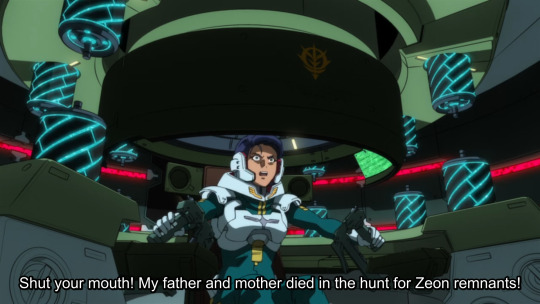
The novel version of the Shamblo requires multiple pilots. The attack on Dakar is carried out by Loni, her two brothers Walid and Abbas, and her father Mahdi.
Novel Loni is generally a voice of mercy and restraint, although she still willingly participates in the operation. Much of her original dialogue during combat has been given to Kirks in the OVA.
Mahdi Garvey is the vengeful, resentful force that wants to punish the Federation for its crimes and destroy its symbols. He is the one who orders attacks on unrelated buildings and refuses to change course to reduce collateral damage, much like OVA Loni does-- however, he is significantly more resistant to being reasoned with than she is, and never has any moments of doubt or regret.
Walid and Abbas have very little agency. I can't remember a single notable line of dialogue from either of them, nor any traits that differentiate them. They're just kind of there in the background, usually doing whatever what Mahdi tells them to do.
All of these characters are explicitly Muslim in the novels.
One of the very first things we're told about Mahdi is that he has multiple wives and many children, but that Loni and her siblings are the 'purest' of his bloodline. We learn this after the destruction of the Federation submarine, while he tells them not to look away from the blood and entrails of the enemies they just killed. We later learn that he harbours a deep grudge not only against the Federation, but specifically against "White Men" -- he usually calls them Franks in Japanese.
I hate this character. I was so relieved when I heard they removed him from the anime. Most important call they made in the entire production, I think.
(The fan translation incorrectly translates "multiple wives and many children" as "many wives and many concubines," so English readers get an even worse first impression, by the way. I made sure to check everything I'm going to complain about in this section so I'm not slandering Fukui for the translator's mistakes.)
Mahdi talks about his religion quite a bit, but he's not portrayed as a religious extremist. He is not a fundamentalist. He doesn't seem to believe his quest for vengeance is something he is divinely commanded to do, although he certainly believes it is morally justified. He's completely fine with his unveiled daughter driving on her own to go pick up two unrelated, non-Muslim men (but he definitely expects her to give him lots of Muslim grandchildren).
His grievances with the Federation don't involve any particular hostility to secularism. He is angry about the Federation officially saying God is dead at the start of the Universal Century, and about the extraction of wealth from Muslim countries that he believes was an intentional destruction of Islamic society-- but I think those are entirely different issues.
You could try to make calls on whether this choice, or any other individual choice made about this character, is less or more offensive than the alternative-- but I think it's beside the point.
Mahdi isn't a Muslim because Islam is specifically important to his motivations; Mahdi is a Muslim because of what that is supposed to represent to the audience. Mahdi is a Muslim because because of the symbol of the Muslim terrorist in the global consciousness, and because Fukui wanted to invoke imagery of 9/11. His character is inherently a bit incoherent, because he's an amalgam of stereotypes about The Other.
I get the feeling a significant part of the research process for this character was looking at the wikipedia page for Osama Bin Laden. I assume Fukui made him less militantly religious than obvious real-life inspirations either because he believed it would be less controversial, or because it meant he wouldn't have to do as much research about Islam.
The through-line from the better-handled themes of the first five books that eventually leads to the terrible destination of Mahdi Garvey is pretty easy to see. It was deeply, deeply frustrating for me to get invested in the way the series acknowledged and engaged with global structural racism (even when it occasionally got a little clumsy or heavy-handed), only for it to drop this on me six books in.
I actually think this mess of a character was probably intended to be a complex, terrible-but-understandable antagonist? I'm completely serious. That's the whole reason it works to transpose his general motivations onto Loni, after removing all the stereotypes and real-world cultural references.
Mahdi is textually compared to Zinnerman (vengeance for the deaths of loved ones and injustice and violence against one's people), and Zinnerman is obviously framed as sympathetic. Mahdi pretty much has the same kind of backstory framework, just with "Muslims" instead of the fictional "Zeon."
Mahdi is also explicitly textually compared to Alberto (inheritor of an established family legacy and all the pressure that entails). Alberto is complicated, but I think he's also a sympathetic antagonist.
And then there's the very first character we meet in the novels, Syam. Syam is also a man from the Middle East who was negatively affected by the Federation's cultural imperialism, and Syam also participates in a terrorist attack. There's even a mention that the guys who recruited him were infiltrating religious institutions, though Syam was not brought in that way, and the religions in question are left unspecified.
Maybe you're wondering why I was so annoyed that Syam's backstory was removed, given I'm glad that Mahdi's was cut. The way they're handled is significantly different.
When he participates in the attack on Laplace, Syam is a nobody with rational motivations to do something awful. His backstory is there to talk about the material conditions and pressures that foment terrorism, including terrorism targeting oppressive governments, and the ways that powerful people take advantage of the desperate.
Mahdi is arguably sort of also that, but it's delivered through the lens of a deranged islamophobic caricature. lol
Syam's story is also a lot vaguer than Mahdi's, when it comes to real-world details. I'm sure there are criticisms one could make of that, too, but I still believe it's preferable in this case. The more you increase the specificity of real-world details in your future scifi world, the more knowledge or personal experience with the subject you need to pull it off convincingly.
Also, Syam not being white made our protagonist explicitly multiracial by extension, which I liked.
(Perhaps interesting: Loni seems to think of Banagher as being within the category of "Frank", but I'm pretty sure Mahdi identified him on sight as someone with "non-Western" heritage. This does not lead him to treat Banagher with any more respect or courtesy, however. Calling Banagher "the Key to the Box" is significantly more dehumanizing in his mouth than Loni's.)
Here's a quote that I think represents Mahdi at his most understandable and humanized. It happens right before he has the Shamblo blow up a hotel full of people out of spite, lmao:
Loni ignored her two brothers who were unable to speak up as she got up from her seat and gave a tense look at her father. Mahdi took her stare “Loni, [those people mocked me].” ...
“[A barbarian] who’ll only imitate the white men on the surface, but [still hangs a knife on his waist]…that’s how those people viewed me. Whether it’s the receptionist, the [doorman], or any guest that brushed by, I can tell from their eyes even if they wouldn’t say it. Those people sold their souls to the society of white men, no matter the color of the skin. To those people, we’re just caged animals, pitiful beasts that are reared in the zoo to exchange for the self-satisfaction of a multi-cultural society.”
Am I crazy? Mahdi asked himself in a corner of his mind, Then let me go crazy. and then answered his own question as he looked away from the speechless Loni. Father, grandfather, Loni’s mother, they all died in despair and hatred. I could only keep living to vent the regrets of those souls. I interacted with top-class education and culture in those white men’s society, and continued to be an alien that hated them. I tasted the feelings of bitterness, deceit and infidelity, I lived through such a life full of oxymorons, and it’s to be expected that I’ll lose my mind, but it’s all for this day. What should I do if I don’t unleash my madness? Who’s the one causing me to go mad!?
(I made edits to his dialogue here to more closely match the Japanese. The original fan translation said "those people used to mock us," and continued to use plural throughout the explanation, but the original line refers specifically to himself. I'm pretty sure it's specifically about when he was recently there, for his meeting with Banagher and Zinnerman.)
Again, the revenge narrative is basically the same thing we get from Zinnerman. And that part about feeling alienated from whiteness and being looked-down upon even as a highly educated, culturally assimilated person-- that's a real experience of racism! I've heard this sentiment from people in real life!
The problem is that Fukui put that sentiment in the mouth of a character who's a mishmash of stereotypes based on cultural fears that the non-Muslim world has about Muslim men.
The problem is that the only explicitly Muslim characters in this series exist to be terrorists in a heavy-handed 9/11 reference.
Another side note: the bit about the knife. Mahdi carries around a shamshir. When it was first mentioned I was just like "okay, he has a sword. Maybe it's a family heirloom or something." When Banagher notices it, he interprets it as representing racial / cultural pride as a person from the Middle East. Okay.
Fukui knows most of the obvious things about Islam. He knows about daily prayers, and that Muslim women often cover their hair and dress modestly. He knows that idolatry is a sin. He knows that Muslims are not wholly uniform in beliefs and practices. He knows the phrase "inshallah". I'm skeptical about his familiarity with the contents of the Quran beyond that, or the concepts of sunnah / hadith, or the differences between any specific major branches of Islam.
("Inshallah" comes up because Full Frontal says it as an ostensible gesture of cultural respect and cooperation, and Mahdi begrudgingly responds in kind with "Sieg Zeon". Hm.)
There's a bit where Loni gives an explanation to Banagher that liberal Muslims exist, which I guess might be necessary for an audience unfamiliar with Islam. It doesn't feel much like the kind of explanation an actual Muslim woman would give when asked why she doesn't cover her hair and/or face, though. It also immediately gets used as an excuse to scare Banagher with an example of supposed fundamentalist Muslim beliefs (basically, 'if I had been from one of those groups, seeing my looks would mean you either have to marry me or be executed').
Sorry to keep going on asides, but I actually recently watched a youtube video that contrasted Fukui's use of Islam in Unicorn with Ohtagaki's use of Buddhism in Thunderbolt. Since I'm currently reading the Thunderbolt manga, I thought it was interesting.
It amused me a little how the essayist skirts around specifically calling Unicorn's portrayal offensive or bigoted, instead settling for calling it "cringe."
You get the picture, right? I'm sure I could keep dredging up more examples, but I'll move on to how the events play out.
The Shamblo attacks the city as planned. Mahdi is bloodthirsty and vengeful, Loni is troubled, and the brothers are just kind of there. Mahdi has the Shamblo deliberately blow up an unrelated hotel.
Riddhe is flying around, witnessing everyone exploding and having a nervous beakdown about it. Mahdi refuses to change course to reduce civilian casualties when Loni asks.
Banagher fights Zinnerman, launches in the Unicorn, and saves Riddhe from getting crumpled like an empty soda can. Riddhe starts carrying Banagher around so they can do sick aerial stunts.
Then Mahdi has the Shamblo attack "The Trade Center." Fuck off, Fukui. You hack.
Since Loni is hooked into the psycommu, she hears all the deaths as they happen. This is finally too much for her, and she pulls off the helmet and begs her father to stop. Enraged, Mahdi yells at Loni about her mother's death.
The exposition here feels very awkward. Mahdi just drops this story on the reader at the last minute while chastising Loni, who obviously already knew about it. This really didn't need to be treated like a reveal.
“We should have expressed our thoughts sufficiently. I learned that Allah has a merciful and understanding heart. if we continue to massacre, we’ll be defying God.”
She climbed up the ladder beside the seat and approached the captain’s seat. “What are you doing? Get back to your seat.” Mahdi growled, but Loni ignored him as she approached.
“There are women and children on the Federation streets too. Father, please show mercy…”
“Shut up! Did you forget how your mother died!?”
[...]
“Your mother killed a Federation soldier in the midst of the chaos after the war. She killed a despicable soldier who intended to rape a Muslim female in a refugee camp. The jury was completely one-sided, your mother was sentenced to death, and I couldn’t do anything to save her. I could only let your mother die all just to protect the trust of the company, all just to protect the cursed inheritance as a “Descendant of Dubai”!
I endured everything all for the sake of this moment. I’m going to use this “Shamblo” to wreck the parliament hall and prompt all the Muslims to rise up. Our family’s tragic wish will be fulfilled soon, and now even you want to betray me?”
The tears rolled down his suddenly widened eyes, dampening his face. This isn’t father. It’s impossible for such a man to be my father. Loni thought, but felt that this might be the first time she was seeing her father’s true state, ...
Realizing she cannot change his mind, Loni pulls a gun on her father. However, he pulls out his own gun and shoots her instead. As she loses consciousness, she reaches out to Banagher with her mind.
The Shamblo's bits are no longer effective without Loni controlling them. Hearing Loni's dying voice telling him to take down the machine, Banagher destroys the Shamblo.
Loni's brothers start arguing with Mahdi after he shoots Loni, but that doesn't save them by leading to a change of heart. They die alongside him in the cockpit.
Who is Loni?
Obviously, Loni is a Lalah archetype. She's one of at least three slightly different Lalah allusions in these books, which is kind of a lot, but I do like that one of them is a man.
Both versions of Loni's death scene have references to Lalah's dialogue in First Gundam ("I finally got to meet you," "It's sad, isn't it?").
Her eyes in the novel are green, also like Lalah. Because of her eye colour, Banagher mentally compares her to Audrey, and also... to his mom. The joke writes itself.
Banagher has significantly more face-to-face interaction with Loni in the novel than the OVA. Because of this, his relationship to her is more personal, at least before they get into each other's heads.
Novel Loni is knowledgeable, patient, and fond of children. She tells Banagher she wants to have ten kids.
She's a nice girl, I guess. It's not really possible to divorce her portrayal as a character from the portrayal of her father, Islam, and Muslims generally. The logic is built into her. I much prefer the character the OVA gave us.
They didn't have to change her character in order to remove the references to Islam. They could have just as easily kept Mahdi as the antagonist while making the Muslims-Zeon swap. I do like what they did, though.
By taking her father's role while also still retaining some of her own, Loni becomes even more central to her arc. She gets to be the primary antagonist and the person that Banagher wants to save. I think it's cool.
Like I said before, I try to avoid getting too deep into spoilers for later novels, but Loni's death in the novel has a number of things in common with the death of another female character that happens later. They're a little too similar for me. I'm sure it's an intentional parallel, but there's not enough contrast for me to find it juicy... I just don't think the narrative actually needs two different female characters to heroically sacrifice themselves so a male character can feel sad about shooting them. Of the two, Loni was the better choice for a rewrite, since this arc needed one anyway.
She still dies, obviously, and Banagher is still sad. There's even still a Lalah callback-- but it's a distinctly different kind of tragedy than the one that happens later. Barring any unexpected future changes, I personally think it's an improvement.

Look! A major theme!
Loni's father is still a presence in the OVA, in much the same way Loni's grandparents were for Mahdi in the novel. This is a story about ghosts of the past.
Tying Loni's rampage in the anime to a runaway psycommu is an interesting difference, especially given she says "Father?" right before it goes haywire. There's almost an insinuation that the machine is possessed.
This works as a metaphor, but if Mahdi was the previous pilot it could theoretically be literal, in much the same way that Neo Zeon managed to get some kind of Essence of Char from the Sazabi's Psycho-Frame when they created Frontal. Mahdi also presumably still developed and built the Shamblo, whether he piloted it or not.
"That isn't her, she's being enslaved."
Loni does describe her father as being swallowed or consumed by the machine in the novel, and she also describes the Shamblo itself as a force "leading people down the wrong path". I definitely interpreted this as metaphorical, though. Loni was the only one with her brain actually hooked into the psycommu.
They did a good job emphasizing the weight of family history as a theme in the OVA. The hands that reach down and pull Banagher's psychic projection away from her face! Again, I love the potential implications.
It's possible there's supplemental information or interviews about this somewhere, but I kind of prefer not having specific lore explanations behind what's happening in these scenes. I like the ambiguity.
Another interesting detail about OVA Loni is the explicit statement of "there's nothing left for me" / "there's no place for me" as a reason why she cannot stop.
This isn't part of her character in the novel, nor Mahdi's, even if loss and being consumed by revenge obviously is. I really like that it adds another connection to Zinnerman and Flaste's dialogue about how they felt after Globe.
I can't stop thinking about how easily I could draw a compelling parallel between the OVA version of Loni and the novel version Riddhe. They simply do not exist in the same universe. They both only ever passingly overhear the less interesting version of each other-- assuming they even notice the other as an individual at all, rather than just an enemy machine.
It's sad, isn't it?
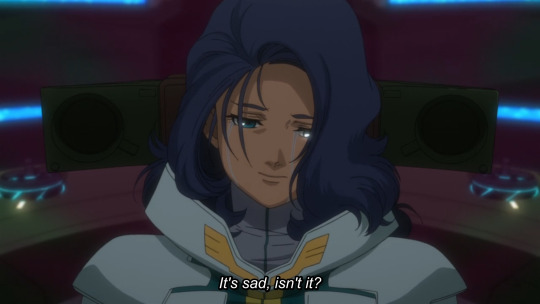
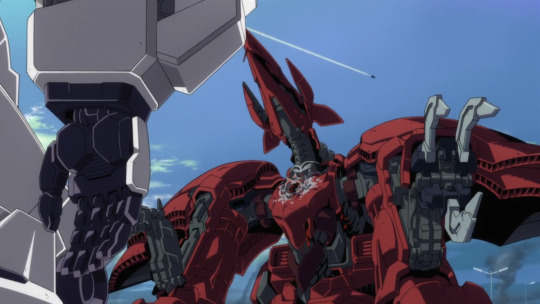
I really like this visual. The hand motif strikes again...
The novel ends with Riddhe and Banagher both knocked out by the Banshee. It also reveals that Marida is the pilot, since Banagher senses her presence. The OVA places its cliffhanger a little earlier, right after the initial reveal.
I'm excited to watch the next one. We've hit the point where I feel like I'm starting to lose my "advantage", so to speak, in terms of knowing what's coming. It's exciting! I enjoy watching these a lot. Even when I dislike a change, I still like thinking and writing about it.
Sorry for the sheer length of this beast, and a huge thank you to the handful of dedicated Unicorn fans following me who are always excited and encouraging. Knowing anyone out there gets something out of these makes my day, and I appreciate your thoughtful responses. ✌️
I'm so glad to be done with novel six. Holy shit.
25 notes
·
View notes
Text

Everyone breathes a sigh of relief now that it's all dealt with. The base might be wrecked, and lord knows what became of the other people in there besides the Excellence trio, but at least our protagonists are safe!
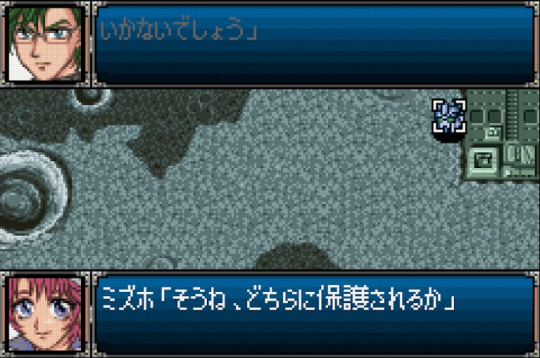
Well, with nowhere else left to go, you guys should probably tag along with one of these ships for now... but the question is, which one? The game just springs the question on you immediately and leaves explanations for later, but let's have a brief rundown of your two paths here.
Going with the Nadesico B means you'll be investigating the mysterious phantom mecha which has been staging surprise terrorist attacks against various space colonies. These attacks start out of nowhere, with no trace of a mothership deploying the "phantom", and after its attack is complete, it vanishes without a trace. The crew of the Nadesico B is scrounging for clues wherever they can find, in desperate hopes of figuring out what exactly could explain these attacks...
Going with the Ra Cailum will pit you against Char Aznable, the man once known as the Red Comet. His Neo Zeon, tired of the New UNE's authoritarian regime, has met the UNE's stubborness with attacks on the Earth itself; they plan to capture the asteroid Fifth Luna, equip it with thrusters, and propel it torwards Earth itself, to strike at the New UNE's headquarters, regardless of how that might harm civilians or the Earth itself. Should they not be stopped, lord knows what they'd resort to...
In terms of secrets, the Nadesico B path will give us the Uvtu Zbovyvgl Oynpx Fnenan, while the Ra Cailum path will give us the Znff-Cebqhprq Ah Thaqnz and the Thaqnz Zx-VVV.
Good luck picking!
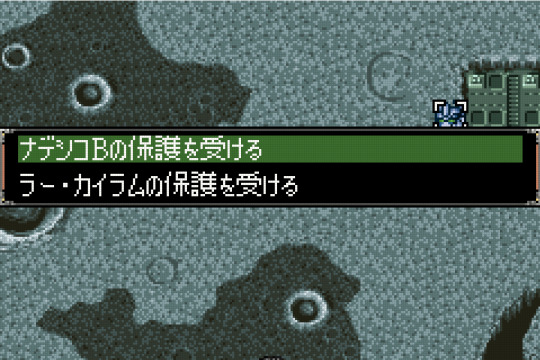
8 notes
·
View notes
Photo

Fairy Elite Four member in a Pokemon tabletop United I am running with my friend. His name is Sammy Cailum
2 notes
·
View notes
Text
Custom Mission: Cheyenne Takeover

Published my first custom mission for Gundam Breaker Mobile! It's based on the scene from "Mobile Suit Gundam Unicorn" where Captain Bright and the Londo Bell forces of the Ra Cailum take over the Earth Federation Cheyenne facility. Of course, I did take some creative liberties.
Mission Details:
Mission ID : 74686449
Mission is a timed blitz, with 60 seconds before mission failure to replicate how fast Londo Bell subdued the E.F.F. forces.
Comprised of 3 stages: 2 stages of grunt suits with a sub-boss, and a 3rd boss stage.
Surprise custom substitution boss for the FD-03 Gustav Karl since that's not yet in the game.
Enemy Unit Preview:
RGM-89D[S] Jegan Type D[Security Config]:

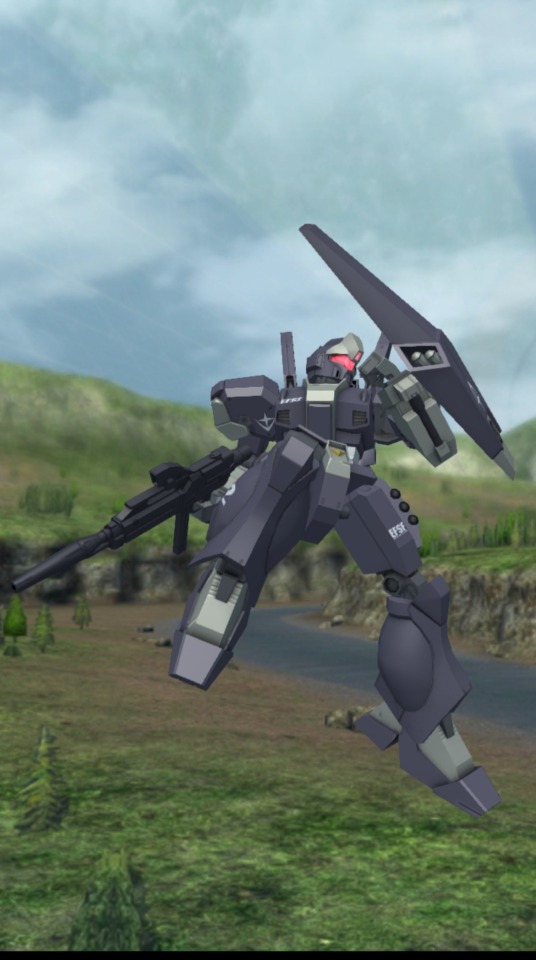
MSZ-006A2 Zeta Plus Type A2:

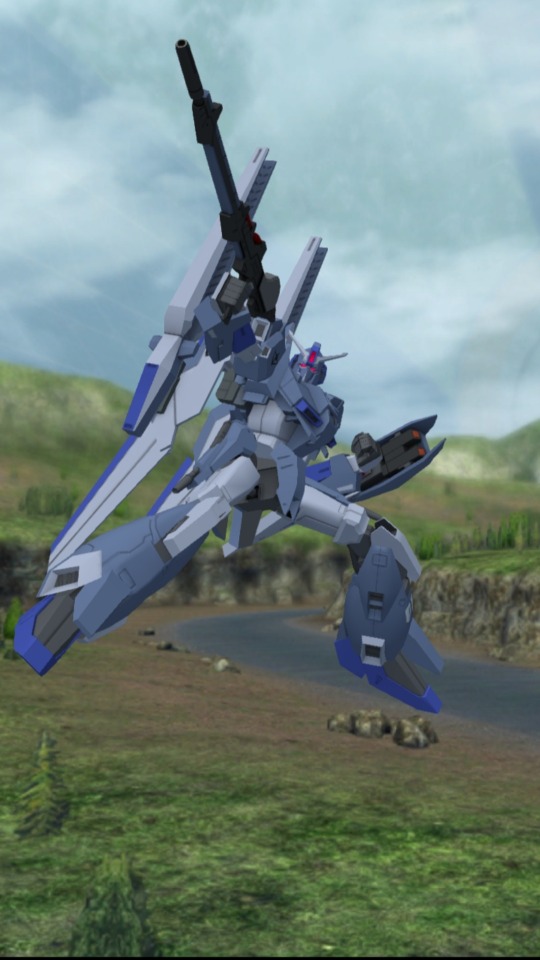
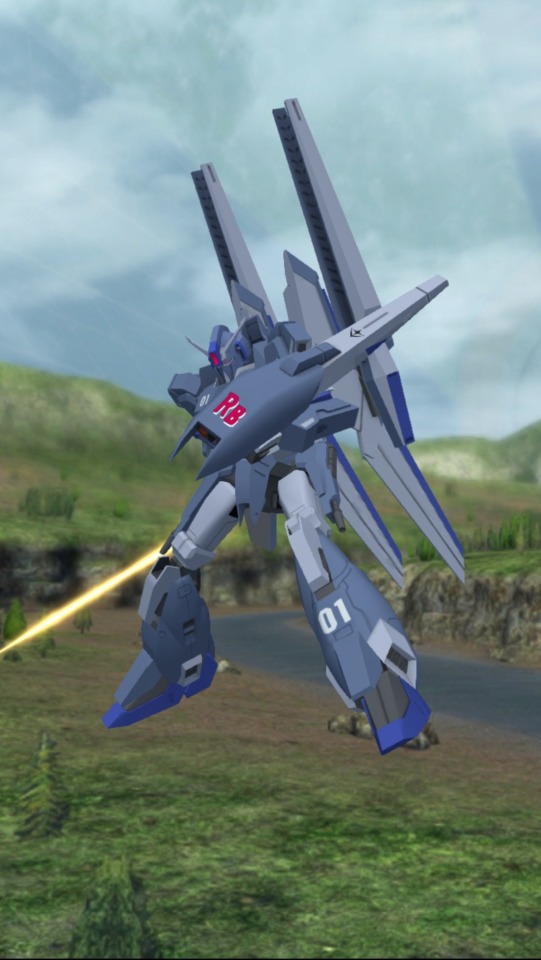
For anyone who manages to complete this mission successfully with a RGM-96X Jesta, feel free to brag in the comments.
Enjoy!
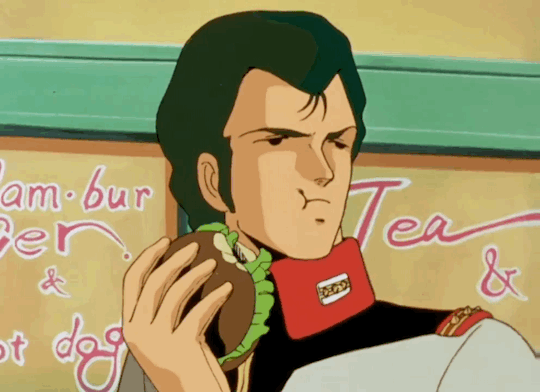
#gundam unicorn#gundam breaker mobile#digital gunpla#gunpla#gundam#gundam uc#londo bell#custom missions#mobile suit gundam
19 notes
·
View notes
Text
Some new SRW 30 info dropped on Famitsu.

In addition to the Huckebein 30 which is the original protagonist mecha, there’s also this new original battleship to serve as the player’s flagship. V, X and T all had cameo space battleship entries as part of the licensed cast (Yamato in V, Nadia in X, Harlock in T) but 30 doesn’t, and from my knowledge on the series that are in (at least the ones I’ve seen) the potential choice of battleships is pretty sparse. The Ra Cailum from CCA is a high likelihood to return unchanged from T, as is the NSX from Rayearth (thought that’s probably a mid-to-late game acquisition.) The Argama from Zeta and the Reinforce Jr. from Victory Gundam are both potential options but I doubt they’ll want to go for more than 1 Gundam battleship (and Captain Gomez’s voice actor apparently died a fair while ago now.) The third Code Geass movie is listed as a units-only entry, meaning that the Ikaruga’s a potential addition but it only appeared very briefly in that movie and not at all in Lelouch of the Ressurection so I doubt it. I know there’s a spaceship in Majestic Prince but from what little I’ve seen it’s more or less just a transport for the main cast’s robots and from what I can tell it doesn’t have any real armament. In light of all that it makes sense for them to add an OG battleship. Apparently it’s called the “Dry strager” or something that sounds like that, I’m sure the spelling will be different in the official translation.
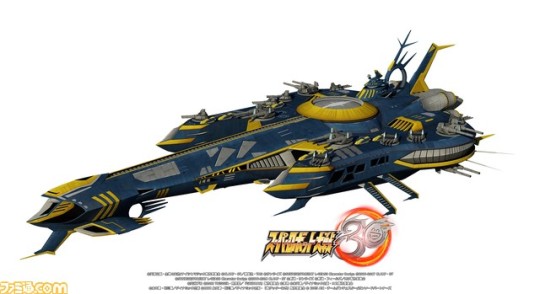
For what it’s worth I love the design. It has a bunch of smaller launch bays for the small-mid size robots and apparently that big disk in the centre mass is meant to be the launch gate for the biggest super robots. It’s always been a point of inconsistency (and occasionally humour) in the older SRW games that there were battleships from the likes of the Gundam series and Nadesico that were having to play host to mecha that were way too fucking big for them, and this at least seems to be making an effort to sidestep that.
In terms of other roster announcements, it’s mostly just new screenshots of stuff that we already saw in the trailer, with two exceptions:
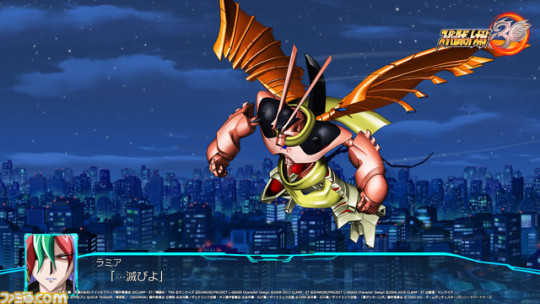
The Betterman portion of Gaogaigar vs Betterman isn’t being left out, Lamia has made it in as a playable character. I definitely don’t recognise this Betterman form though, it must be one that’s exclusive to the manga. I need to get round to reading that (or what’s been translated so far,) but I think I definitely need to rewatch Betterman first, the lore for that is really wild and I don’t remember it that well. Honestly that was the last series I was expecting to have to rewatch when preparing for the next SRW entry.
The other, less exciting new confirmation is that the White Ark from Victory has made it in, shown here getting bullied by Zoltan and Sinanju Stein.

Otherwise the article’s mostly talking about the new, more free-form mission structure. I’ve got some slightly mixed feelings about that, I think allowing players a lot of freedom in choosing what order to play missions in might necessitate having the plot be less tightly constructed that previous entries, but it’s potentially exciting if it’s pulled off well. Assuming your moon-roon deciphering abilities are as feeble as mine, here’s the video I watched where a guy looks over the article and gives his commentary.
youtube
12 notes
·
View notes
Note
“Wizard friends” post-campaign headcanons? :]
Percy frequently calls Rick for assistance, as many of his friends do, but he is also the only person she’ll ever invite just to “spend quality time together" (as her interpersonal communications teacher put it).
They like to come up with new combo techs to use in battle, and eat foods that most people would not categorize as food, such as pinecone salads.
Rick tends to underestimate how much his friends actually care about him, and thus tends to underestimate his proficiency. Percy helps remind him how strong he really is.
There’s a jazz club Rick goes to with Stan; he took Percy once and she took a surprising liking to it. Now they frequent there! Percy also met Stan on one of their outings and greatly appreciates his expertise on the saxophone.
Directly after the campaign, Percy asked Rick more about his history in the ocean. He explained more about the ocean school and Cailum, and how he still feels that it is his responsibility to someday return and do something about the whole situation.
Percy openly refers to Rick as her good friend, much to Meryl’s exasperation. Maybe someday she’ll figure it out.
#wizard friends#a/c Percy#a/c Rick#a/c Stan#a/c Meryl#a/c Caelum#he gets a tag because I know Batsy will want to ask about him :)#requested headcanons#answered headcanons#just-char
10 notes
·
View notes
Text
To all the fics of powerful entities like Phil, Techno, Wilbur, Mumza, and others coming to successfully punt Dream into compliance or torture him into accepting what happened to him as right I respond thusly.
That would be like trying to torture information out of Ardyn Lucius Cailum. It should be expected Dream to be “Please sir may I have another?” the entire time because there is nothing anyone can do to him to make him hurt more than he does everyday. Man burns himself to death for entertainment, and lives with potassium poisoning and various vitamin and mineral deficiencies for weeks. Also probably eats bad potatoes and vomits up his stomach a lot because Sam want’s him to break.
The point is, torture won’t do shit to him, and he is too Conditioned away from Love to suddenly feel guilty.
25 notes
·
View notes